It seems we can’t find what you’re looking for. Perhaps searching can help.
Sign Up for newsletter!
Subscribe to get the latest eBook!
Hotline






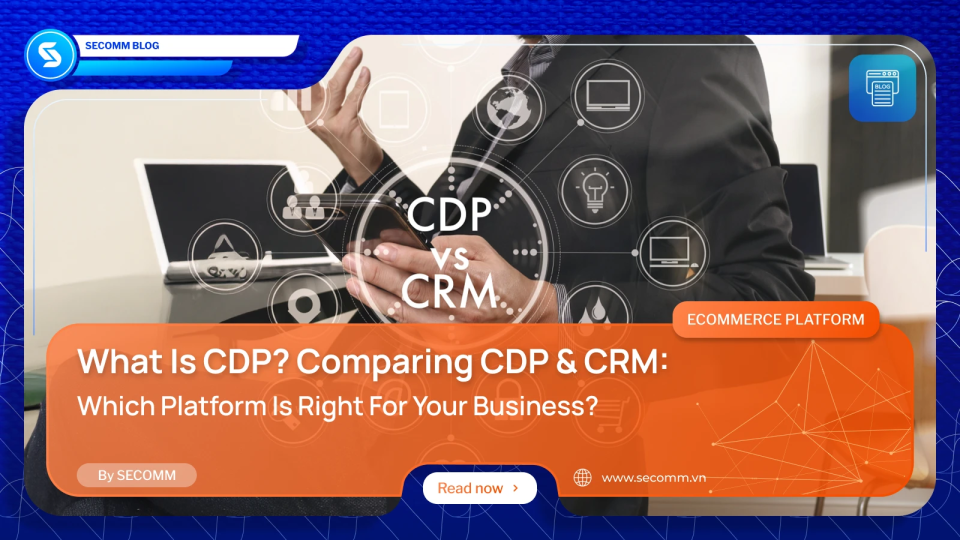
According to research by Harvard Business Review, only 15% of professionals feel they have a comprehensive view of their customer data, making it extremely challenging to create effective online experiences. A common problem is data silos existing between Sales, Marketing, Customer Service, and Product teams. Today, this issue can be resolved with a CDP. So, what is a CDP? How does it differ from CRM, and which platform suits your business best?
A Customer Data Platform (CDP) is a customer data management system that collects, unifies, and analyzes data from various sources such as websites, mobile apps, social media, CRM systems, and point-of-sale (POS) systems. CDPs enable businesses to create a comprehensive 360-degree customer profile, providing a full view of the customer journey and allowing for personalized experiences at every touchpoint.
Unlike isolated storage systems, a CDP automatically gathers, cleanses, and synchronizes first-party data (directly owned by the business) in real-time, creating a solid foundation for data analysis and marketing automation.
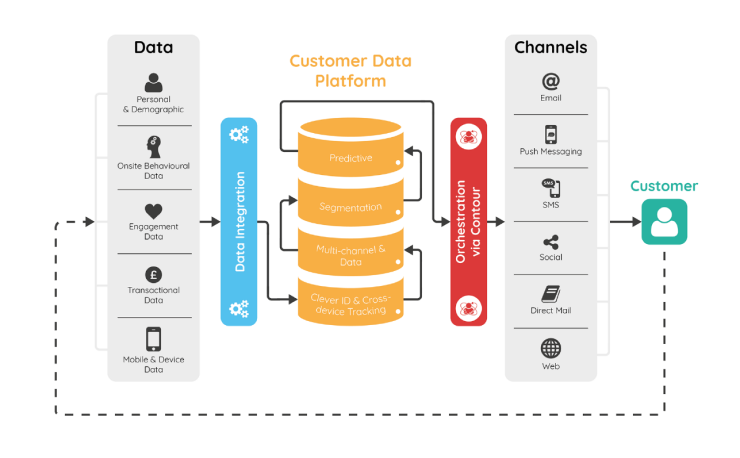
By adopting a CDP, businesses gain numerous advantages:
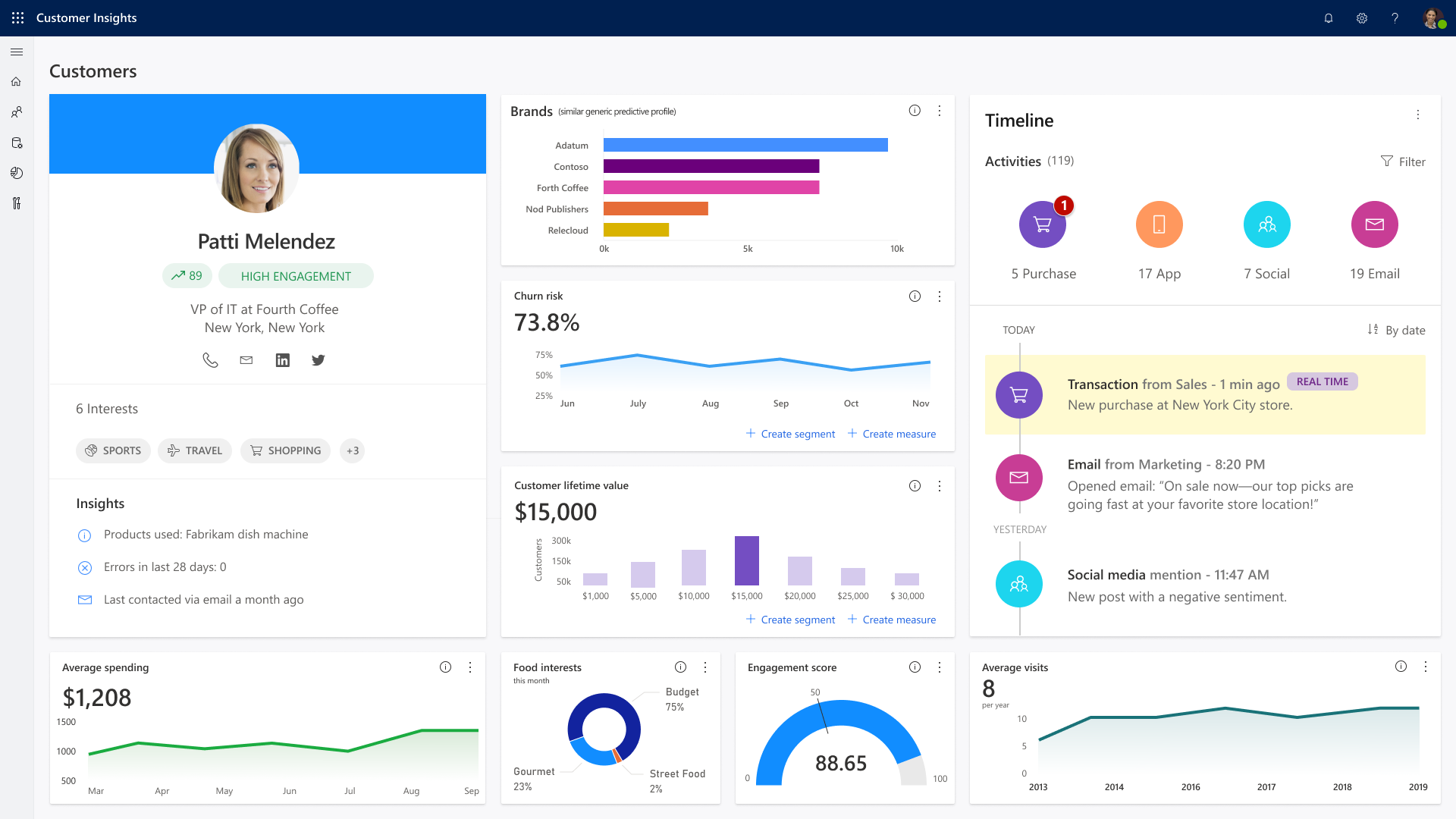
CDPs are ideal for medium to large businesses that pursue customer-centric strategies or are undergoing digital transformation.
Specifically:
Personalized Multichannel Marketing Campaigns
An eCommerce company uses a CDP to gather customer behavior data from its website, social media, email, and mobile app. When a customer frequently searches for sports products, the CDP automatically segments them and sends personalized email recommendations and timely promotions, delivers relevant content on Facebook, and displays personalized banners during website visits. This leads to significantly higher conversion rates and sales across marketing channels.
Optimizing Sales Processes and Upselling
Sales teams access consolidated CDP data: purchase history, interaction frequency, product search behavior to identify prospects likely to buy during weekends. The system can send short-term offers or related product promotions, increasing upsell and cross-sell opportunities.
Customer Journey Coordination and Performance Measurement
CDPs help marketers design seamless customer journeys from discovery to purchase and post-sale care. Businesses can identify and act on customers’ “golden moments” (e.g., purchase decisions triggered by free shipping vouchers). Detailed reports on conversion rates, average order value (AOV), customer acquisition cost (CAC), and effective customer segments optimize marketing strategy and budget.
Customer Relationship Management (CRM) software or solutions help businesses store, organize, and manage contact information and interaction histories with customers, potential clients, and current clients. CRMs track calls, emails, appointments, transactions, and service feedback and automate many sales and customer service processes. This supports improving customer experience, increasing revenue, and better customer retention.
Read more: https://secomm.vn/what-is-crm-top-5-benefits-of-using-crm-software/
| Criteria | CDP | CRM |
| Primary Purpose | Unified, analytical, and personalized multi-channel data | Manage relationships, communication history, and customer care |
| Data Type | Multi-source first-party data (behavior, transactions, journey, profiles) | Communication, existing transaction data with identified customers |
| 360° Customer Profile | Yes | Incomplete |
| Data Update Frequency | Automatic, real-time | Mainly manual or semi-automated |
| Main Use Cases | Customer insight, experience personalization, marketing optimization | Sales management, customer support, pipeline tracking |
| Primary Users | Marketing, data analysis, customer development strategy | Sales, customer service, relationship management |
In today’s competitive market, delivering a personalized customer experience is no longer optional; it’s a key driver for optimizing marketing efforts and accelerating business growth. Whether you choose a CDP or a CRM platform, selecting the right solution for your specific business needs is essential to improving operational efficiency and customer engagement.
If you’re looking for a trusted partner to help you implement, operate, and optimize your eCommerce ecosystem, don’t hesitate to reach out to SECOMM. We’re here to support you with expert guidance and tailored solutions to power your long-term growth.
 What is a CDP and how does it work?
What is a CDP and how does it work? What’s the main difference between CDP and CRM?
What’s the main difference between CDP and CRM? Which businesses should use a CDP?
Which businesses should use a CDP? Is CDP implementation complex and what is needed?
Is CDP implementation complex and what is needed? Does CDP guarantee increased leads or revenue?
Does CDP guarantee increased leads or revenue? Is the data stored on a CDP secure?
Is the data stored on a CDP secure? 57
57
 6,409
6,409
 1
1
 32
32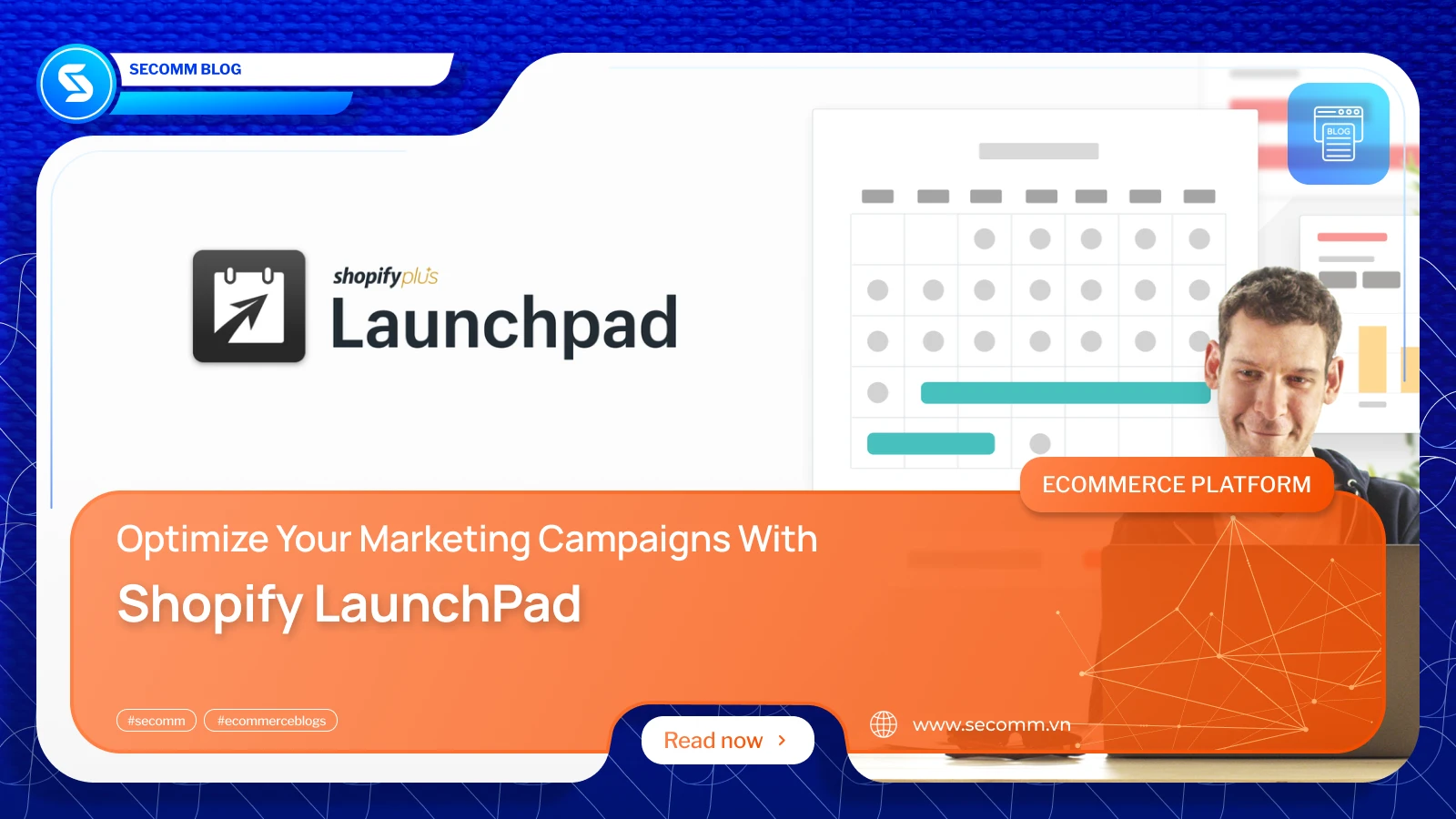
In today’s eCommerce world, staying ahead of the competition requires not only a great product but also effective tools to manage and optimize your store’s operations. Shopify, one of the leading eCommerce platforms, offers a variety of features designed to help businesses thrive. Among these is Shopify LaunchPad, a powerful tool aimed at automating and streamlining promotional events.
In this blog post, we’ll dive into what Shopify LaunchPad is, how it works, and the key features that make it a valuable asset for online store owners. We’ll also explore the benefits and drawbacks of using this tool, helping you decide if it’s the right fit for your business needs. Whether you’re planning a major sale, a product launch, or a special campaign, understanding the capabilities of Shopify LaunchPad can help you execute your strategies more efficiently and effectively.
Shopify LaunchPad is a specialized feature within the Shopify platform designed to facilitate the management and execution of promotional events for e-commerce businesses. It serves as a comprehensive toolset that allows store owners to automate the setup, scheduling, and execution of events such as product launches, flash sales, and holiday promotions.
Essentially, Shopify LaunchPad enables businesses to plan and implement their marketing strategies more efficiently by automating repetitive tasks and ensuring timely execution of events, thereby enhancing overall store management and customer engagement.
There are two common ways to utilize Shopify LaunchPad. One is creating new events, another is modifying the existing events. Let’s break it down:
To create a new LaunchPad event, you’ll follow these steps:
To modifying the existing LaunchPad events, you’ll need to:
Navigate to the LaunchPad events section in your Shopify dashboard.
Shopify LaunchPad offers a comprehensive suite of features designed to enhance the management and execution of promotional events for eCommerce businesses.
Automated Event Scheduling: LaunchPad automates the activation and deactivation of events based on preset start and end dates, eliminating the need for manual intervention and ensuring timely execution of promotional campaigns.
Event Customization: Businesses can extensively customize their promotional events within LaunchPad. This includes defining event types such as sales, product launches, or holiday promotions, setting specific start and end dates (including time zones for global campaigns), configuring discounts (whether percentage-based or fixed amounts), excluding certain products or collections, and customizing promotional messaging and banners to align with branding strategies.
Integration Capabilities: Shopify LaunchPad seamlessly integrates with other Shopify features and third-party apps. It syncs with Shopify’s inventory management to ensure accurate stock availability during promotions, integrates with email marketing tools for targeted promotional campaigns, and connects with analytics platforms to track campaign performance and customer behavior.
Performance Analytics: The platform provides robust analytics and reporting capabilities, offering insights into event performance metrics such as total revenue generated, units sold, average order value, click-through rates, conversion rates, customer acquisition cost, top-performing products, best-selling categories, and geographic sales distribution. This data empowers businesses to make data-driven decisions to optimize future promotions and marketing strategies.
Using Shopify LaunchPad offers several key benefits for eCommerce businesses:
Time-saving through automation: Shopify LaunchPad automates the entire process of setting up and managing promotional events. This includes scheduling events to start and end at specific times, activating discounts or special offers automatically, and deactivating them once the event concludes. By automating these tasks, businesses can save significant time that would otherwise be spent manually coordinating promotions.
Improved sales management: By automating event activation and deactivation, LaunchPad ensures precise control over sales periods, product launches, and promotional campaigns. Businesses can schedule events in advance, allowing for strategic planning and coordination across different channels. This capability not only improves the efficiency of sales management but also enhances the effectiveness of promotional efforts by ensuring timely execution and optimized sales strategies.
Enhanced customer experience: Streamlined and well-managed promotional events contribute directly to a better shopping experience for customers. With LaunchPad, businesses can communicate promotions clearly and effectively to their audience, reducing confusion and improving transparency. Timely execution of promotions also enhances customer satisfaction by delivering on expectations and providing a seamless shopping experience.
Reach new potential customers: Shopify LaunchPad is instrumental in helping businesses reach new audiences and expand their customer base. Whether through targeted promotions, cross-channel campaigns, or innovative marketing strategies, LaunchPad enables businesses to attract and engage with new potential customers effectively.
While Shopify LaunchPad offers significant benefits, it also has certain limitations that businesses should consider:
Dependence on Proper Setup: The effectiveness of LaunchPad heavily relies on the accurate setup of events, including dates, discounts, and promotional content. Improper configuration or oversight in setup can lead to inconsistencies in promotions or missed opportunities to maximize sales.
Analytics and Reporting Depth: While LaunchPad provides basic analytics and reporting on event performance, businesses looking for advanced analytics capabilities or deeper insights may find the built-in features somewhat limited. Integrating with external analytics tools may be necessary for more comprehensive data analysis.

Cheak, an innovative sportswear brand, leveraged Shopify LaunchPad to streamline its product launches and manage seasonal sales effectively. By scheduling product releases and flash sales in advance, Cheak was able to create buzz and anticipation among its customer base. The automation provided by LaunchPad ensured that promotions started and ended precisely as planned, enhancing the overall shopping experience and boosting sales during peak periods. By using Shopify LaunchPad, Cheak increased 20% month-on-month growth in online store traffic, 100% month-on-month rise in Malaysian expansion store visits, and reduced product launch time, from 1 week to 2 days.
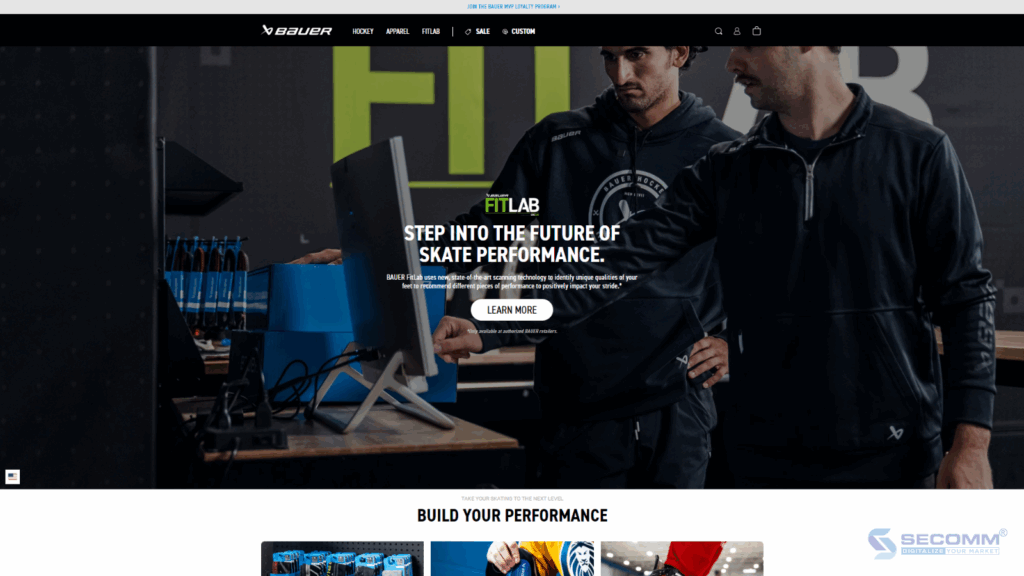
Bauer, a renowned hockey equipment manufacturer, used Shopify LaunchPad after re-platform from Salesforce Commerce Cloud to coordinate large-scale promotional events across multiple regions. By utilizing LaunchPad’s scheduling and automation features, Bauer was able to synchronize discounts and special offers for major events like Black Friday and Cyber Monday. This approach not only simplified the management of these complex campaigns but also maximized their impact, resulting in significant increases in both online traffic and sales.
Shopify Plus and the LaunchPad feature has helped Bauer with 60% revenue increase, 30% order increase, 20% cost savings, 18% conversion rate increase since moving to Shopify, within 6 months year-over-year.
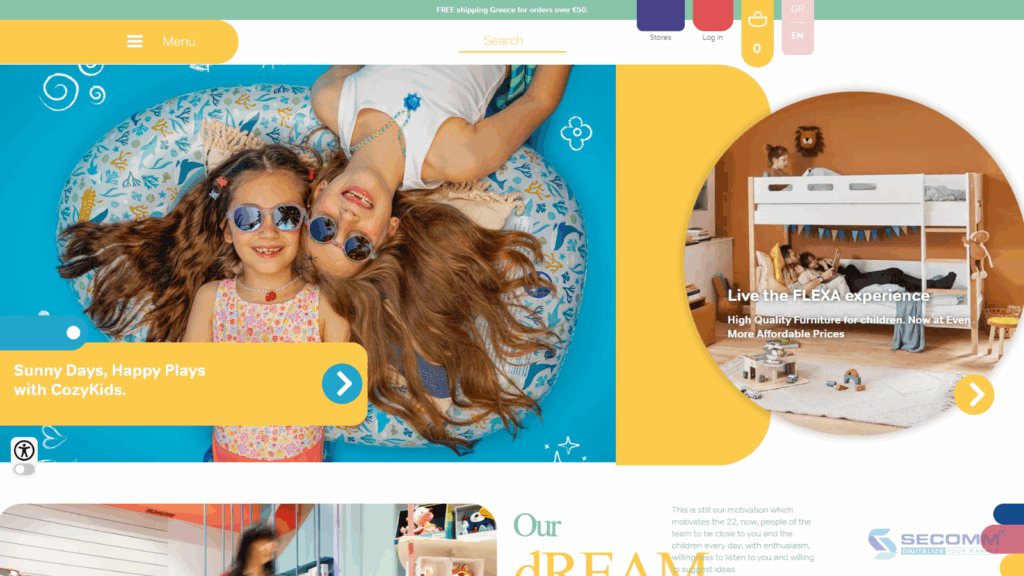
Cozykids, a popular children’s clothing retailer, implemented Shopify LaunchPad to manage its frequent sales and special promotions. The brand utilized LaunchPad to automate discount application and promotional messaging, ensuring a seamless and consistent customer experience. With LaunchPad, Cozykids could easily modify ongoing events and respond quickly to market trends, leading to improved customer engagement and satisfaction. By using LaunchPad, Cozykids has seen: 40% site traffic increased, 82% revenue increased, human error reduced and stock management efficiency increased.
Shopify LaunchPad is a powerful tool that can transform the way eCommerce businesses manage and execute promotional events. By automating event scheduling, enhancing sales management, and improving customer experiences, LaunchPad offers significant benefits. However, it also has limitations that businesses need to consider. Real-world examples like Cheak, Bauer, and Cozykids showcase its potential to drive sales and engagement effectively. Overall, Shopify LaunchPad is a valuable asset for any eCommerce store looking to streamline its promotional strategies and achieve better results.
Want to implement Shopify LaunchPad right now? Contact SECOMM for free consultation!
 113
113
 6,367
6,367
 1
1
 40
40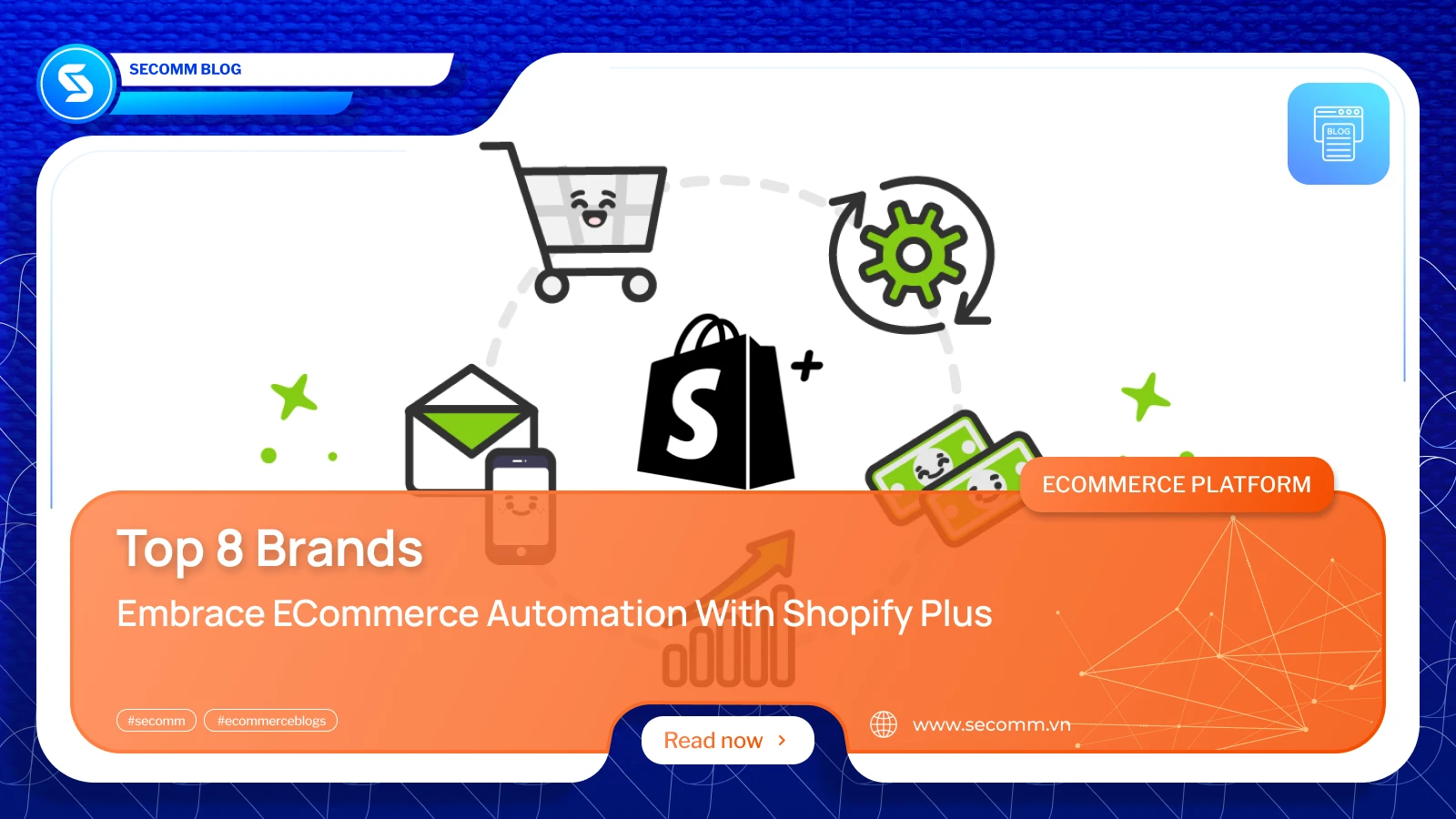
In today’s digital age, eCommerce automation not only helps businesses optimize their sales processes but also creates a seamless shopping experience for customers. Shopify Plus has become one of the most popular SaaS eCommerce platforms, helping both large and small brands automate and enhance their business efficiency. Below is a list of leading brands that have successfully automated their eCommerce with Shopify Plus.

Good American, the renowned fashion brand co-founded by Khloé Kardashian, achieved $1 million in sales on the first day of operating its sales system on the Shopify Plus platform. Building on this success, the brand established multiple automated processes to eliminate manual tasks, allowing its team to focus on providing customers with a rich shopping experience and excellent support services.
Good American utilized Shopify Flow to automatically tag products as “Out of Stock” on their website for items that are sold out and “Low Stock” for items that have reached a certain inventory threshold. This not only improved inventory management but also encouraged customers to purchase items that were running low. Additionally, for out-of-stock products, customers could sign up to be notified when the items were back in stock, helping Good American reclaim potential lost sales.
With Shopify Flow, Good American was able to create nine automated processes in less than a day, significantly contributing to the overall efficiency of their eCommerce operations.

Boody is an Australian brand specializing in eco-friendly clothing, founded in 2012. After operating on the complex Magento platform for several years, the brand decided to switch to Shopify Plus for its specialized solutions and user-friendly interface. This transition allowed Boody to easily customize and provide their customers with a more engaging and seamless online shopping experience while expanding into international markets.
After switching platforms, Boody leveraged Shopify Flow to automate several key eCommerce processes, including order processing, email marketing, payments, and inventory management. This automation enabled Boody’s team to focus more on business strategies and market expansion. As a result, Boody has expanded to 10 different international stores and increased its online revenue share from 0% to 70%.

Paperlike is known for producing and supplying accessories for iPads. Given the small team and limited technological resources at Paperlike, operational efficiency is a top priority for their eCommerce activities. After running their eCommerce website on the standard Shopify platform for a long time, Paperlike switched to Shopify Plus to find solutions to handle their increasing sales volume.
Despite having a small team, Paperlike successfully operates their Shopify Plus store thanks to unique automation tools such as Flow, LaunchPad, and Script.

Since its establishment in 1971, Mandaue Foam has become an indispensable name in the furniture industry in the Philippines. After four years of using the standard version of Shopify, Mandaue Foam upgraded to Shopify Plus to seek solutions for expansion and customization.
The brand utilized LaunchPad—a feature exclusive to Shopify Plus—to schedule marketing campaigns and automate product price updates and discounts. Since LaunchPad allows real-time tracking of each campaign’s performance, the Mandaue Foam team could understand customer behavior and adjust their campaigns accordingly.
Additionally, using Shopify Flow, Mandaue Foam automated their order management process. They created a workflow where, once an order is placed, one of their 28 physical locations with inventory for that product is notified to process the order. This ensured swift order fulfillment while eliminating the need for manual order tracking.
The platform switch and the implementation of eCommerce automation helped Mandaue Foam achieve a 200% increase in order volume, a 151% year-over-year increase in total sales, and a 16% increase in customer return rate.
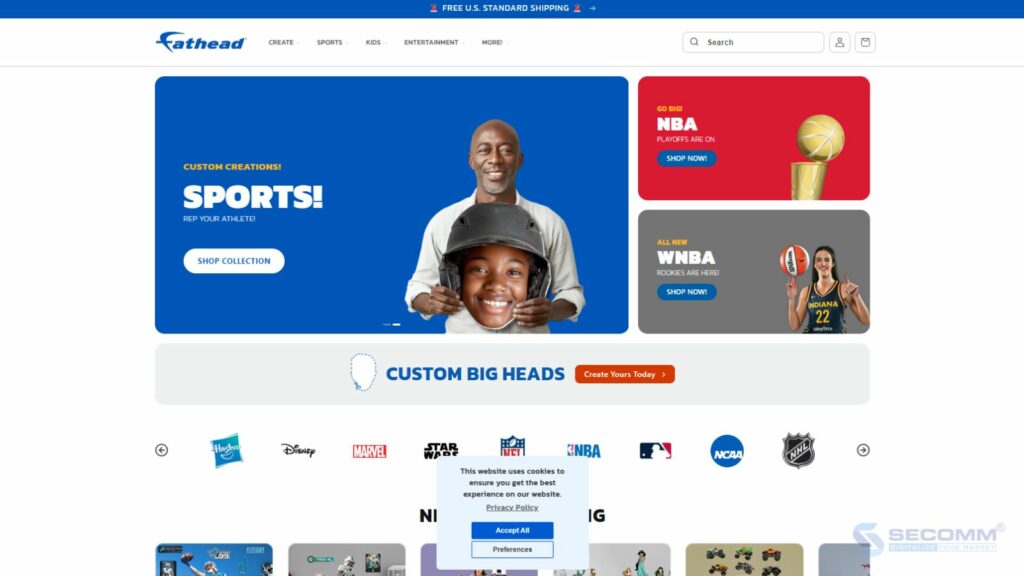
Fathead is a provider of decorative products and decals featuring famous cartoon characters, superstars, and top athletes. The eCommerce system at Fathead encountered numerous issues over time, including frequent errors, poor performance, and time-consuming manual processes.
To address these challenges, Fathead decided to migrate to Shopify Plus for its easy and flexible customization options on a user-friendly interface. Fathead leveraged Shop Pay to simplify the checkout process, providing a streamlined shopping experience and boosting conversion rates. The brand also utilized Shopify Flow to set up multiple automated processes, including optimizing order processing. As a result, Fathead increased average order value by 46%, conversion rates by 10%, and overall revenue by 50%.
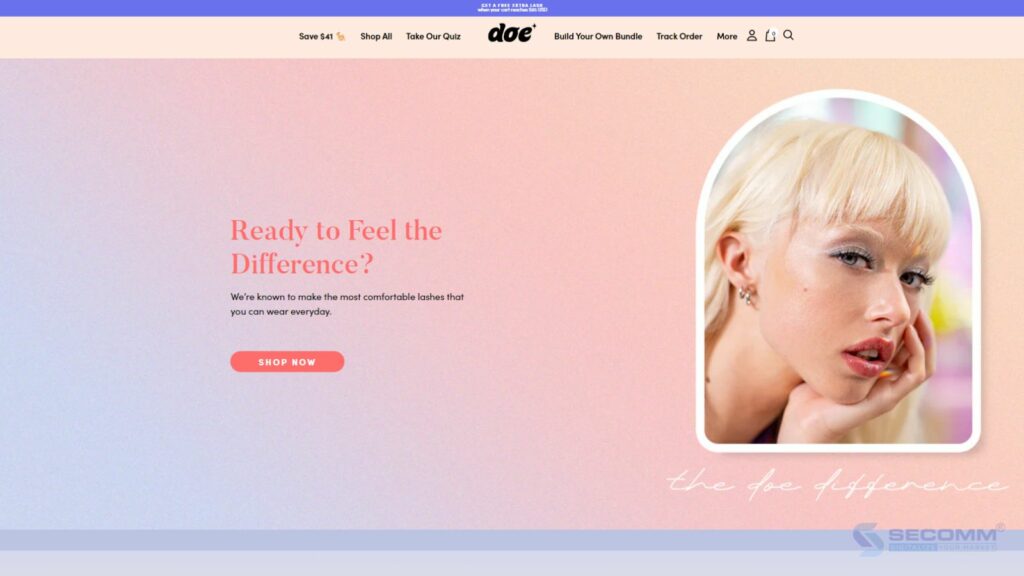
Doe Beauty is a beloved Korean cosmetics brand across Asia. From the early days of eCommerce, Doe Beauty built its website on the Shopify platform. Later, witnessing rapid growth and the need for system expansion, Doe Beauty decided to switch to Shopify Plus. Since then, 80% of the operations on their Shopify Plus store have been automated.
Thanks to Shopify Flow, Doe Beauty’s team can focus on creative and strategic business aspects. The order processing and inventory management are optimized and automatically monitored, enabling faster delivery. As a result, Doe Beauty provides customers with a smooth and convenient shopping experience. E-commerce automation with Shopify Plus has helped the Doe Beauty team save an average of 4 hours and increase the average order value by 5%.

For over 60 years, Jack Rogers’ sandals and shoes have been loved by generations of consumers across the United States. Dissatisfied with their existing eCommerce system, Jack Rogers switched to Shopify Plus. This move provided access to a comprehensive infrastructure and outstanding solutions, optimizing inventory management—a persistent issue for Jack Rogers over the years.
After transitioning to the Shopify Plus store, the brand leveraged Shopify Flow to automate several operational processes, freeing their team from time-consuming manual tasks. The intuitive and user-friendly interface of Shopify Plus allowed the Jack Rogers team to easily add and edit products and categories, set up sales campaigns, and run advertisements. This led to remarkable growth in a short time, with website traffic increasing by over 60% and conversion rates by more than 30%.

Cozykids is a popular destination for children’s products in Greece. The old WordPress-based system at Cozykids faced numerous issues due to manual operations and inadequate performance. As a result, Cozykids switched to Shopify Plus in search of a solution for performance and automation problems.
By using Shopify Flow, Cozykids automated inventory management for out-of-stock and low-stock products, eliminating the need for staff to manually monitor inventory levels. Additionally, Cozykids used Flow to automate customer interactions with out-of-stock products, allowing customers to pre-order at a discounted price and sign up for notifications when the products were back in stock. This automation was particularly important for the marketing team, as it helped them know when to stop promoting low-stock items and focus on other products.
For launching and promoting new products, Cozykids used Shopify LaunchPad to automate these processes. With both Flow and LaunchPad, Cozykids increased eCommerce website traffic by 40% and revenue by 80%. Additionally, the automated processes significantly reduced the time staff spent monitoring inventory levels, decreased errors from manual operations, and enhanced operational efficiency.
eCommerce automation not only helps brands optimize their operational processes but also creates a better shopping experience for customers. The aforementioned brands have successfully used Shopify to enhance business efficiency and build customer trust. Shopify has proven to be a powerful and flexible tool, supporting businesses of all sizes and across various industries.
Need advice on implementing eCommerce automation with Shopify Plus? Contact SECOMM today!
 57
57
 6,410
6,410
 0
0
 32
32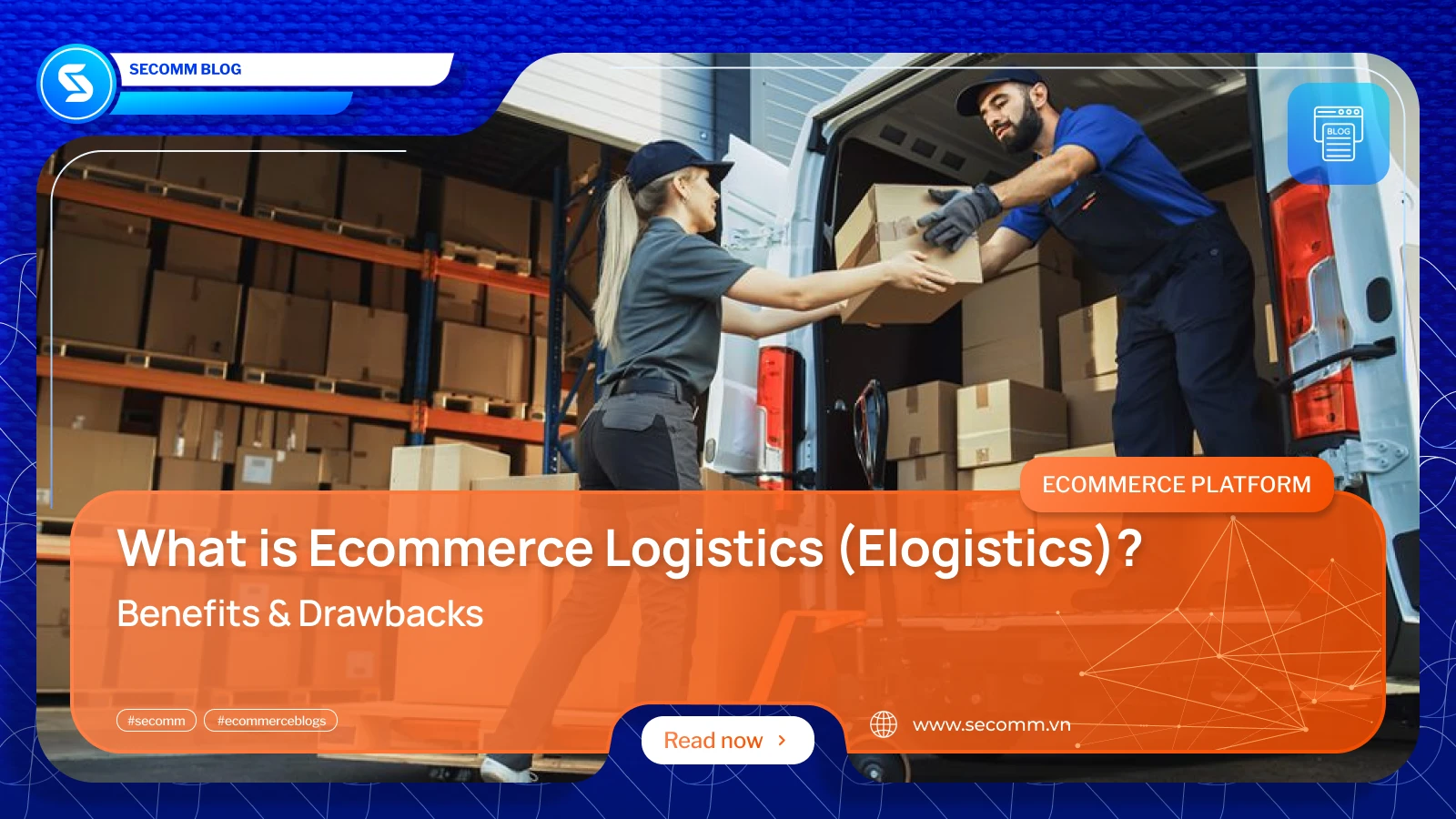
In today’s rapidly evolving digital landscape, eCommerce logistics, or eLogistics, plays a pivotal role in the seamless operation of online retail. It encompasses the intricate processes of managing and delivering goods from suppliers to customers efficiently and effectively. As businesses worldwide increasingly embrace digital platforms for sales, understanding the fundamentals of eCommerce logistics becomes indispensable for optimizing operations and staying competitive in the dynamic marketplace.
ECommerce logistics, often referred to as eLogistics, is the specialized process of managing and fulfilling online orders from the point of sale to delivery to the customer’s doorstep. Unlike traditional logistics, which primarily focuses on moving goods through physical stores or distribution centers, eCommerce logistics is tailored to the unique challenges and opportunities of the online retail environment. It encompasses a range of activities including order processing, inventory management, warehousing, packaging, and transportation logistics. The goal of eCommerce logistics is to ensure that products are delivered to customers swiftly, accurately, and cost-effectively, thereby enhancing customer satisfaction and optimizing operational efficiency for online merchants.
The eLogistics process includes some critical components. They work together to ensure that eCommerce businesses can fulfill orders accurately, efficiently, and on time, thereby meeting customer expectations and enhancing overall operational performance.
Order Processing:
This involves receiving and confirming orders placed on the eCommerce platform. It includes order verification, payment processing, and order entry into the system.
Inventory Management:
Efficient inventory management is crucial to eCommerce logistics. It involves tracking stock levels, monitoring inventory movements, and ensuring accurate stock counts to prevent stockouts or overstock situations.
Warehousing:
eCommerce logistics often utilizes warehouses or fulfillment centers strategically located to facilitate quick order processing and shipping. Warehouses are organized to efficiently store and pick items for orders.
Packaging:
Packaging in eCommerce logistics involves selecting appropriate packaging materials, ensuring products are securely packed to prevent damage during transit, and sometimes includes branding for a positive customer experience.
Shipping and Transportation:
This component includes selecting the optimal shipping method (e.g., ground, air) based on factors like delivery speed and cost-efficiency. It also involves managing logistics partners or carriers for timely delivery.
Returns Management:
Handling returns is a critical aspect of eCommerce logistics. It includes processing returned items, assessing their condition, restocking inventory, and issuing refunds or exchanges as per the company’s policies.
Technology and Integration:
eCommerce logistics relies heavily on technology for automation and integration. This includes using inventory management systems, order management systems, and transportation management systems (TMS) to streamline operations and enhance efficiency.
Customer Service:
While not always considered a logistics component, customer service plays a vital role in eCommerce logistics by managing inquiries related to orders, tracking shipments, and resolving any issues that may arise during the fulfillment process.
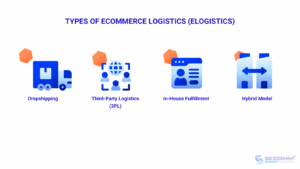
There are 4 common types of eLogistics. Each type of eCommerce logistics has its own advantages and challenges, and the choice depends on factors such as business size, product characteristics, target market, and strategic goals. Selecting the right logistics strategy is crucial for optimizing operational efficiency, enhancing customer satisfaction, and supporting business growth in the competitive eCommerce landscape.
3.1 Dropshipping
Dropshipping is a fulfillment method where the online retailer (the dropshipper) does not keep products in stock. Instead, when a customer places an order, the retailer forwards the order details and shipment instructions to a third-party supplier or manufacturer. The supplier then ships the product directly to the customer.
Dropshipping is advantageous because it eliminates the need for inventory storage and management, reducing upfront costs and risks for the retailer. However, it also means the retailer has less control over fulfillment and may face challenges in maintaining consistent product availability and quality.
3.2 Third-Party Logistics (3PL)
3PL providers offer outsourced logistics and supply chain management services to eCommerce businesses. These providers specialize in warehousing, order fulfillment, inventory management, shipping, and often additional services like reverse logistics (handling returns).
eCommerce businesses can benefit from partnering with a 3PL provider by leveraging their expertise, infrastructure, and established carrier relationships. This can lead to cost savings, improved efficiency in order fulfillment, and scalability as 3PL providers can handle fluctuations in order volume and seasonal peaks. However, businesses must carefully select a 3PL partner that aligns with their specific needs and standards for service quality.
3.3 In-House Fulfillment
In-house fulfillment involves eCommerce businesses managing their own logistics operations internally. This includes setting up and managing warehouses or fulfillment centers, hiring staff for picking, packing, and shipping orders, and overseeing the entire fulfillment process.
In-house fulfillment gives businesses greater control over the entire logistics chain, allowing for customization of processes and direct management of customer interactions. However, it requires significant upfront investment in infrastructure, technology, and manpower, as well as ongoing operational costs. Businesses opting for in-house fulfillment must also ensure they have the capability to handle fluctuations in demand and maintain service levels during peak periods.
3.4 Hybrid Model
Some businesses opt for hybrid logistics models that combine elements of dropshipping, 3PL services, and in-house fulfillment. For example, a business may use dropshipping for certain products or suppliers while managing warehousing and fulfillment for core or high-demand items.
Hybrid models offer flexibility and the ability to tailor logistics strategies to specific product lines or market conditions. However, managing multiple logistics models requires careful coordination and integration to ensure seamless operations and consistent customer experience.
Implementing eLogistics brings your business many benefits. By leveraging these benefits, you optimize the logistics operations to support growth, improve customer experiences, and maintain a competitive position in the online retail market.
Cost Efficiency:
By optimizing processes such as warehousing, inventory management, and shipping, eCommerce logistics helps reduce operational costs. This includes minimizing storage expenses, improving inventory turnover, and leveraging bulk shipping discounts.
Faster Delivery Times:
Efficient eCommerce logistics enable quicker fulfillment and shipping of orders. This not only enhances customer satisfaction but also meets the expectations for fast delivery set by major eCommerce platforms.
Improved Customer Satisfaction:
Timely and accurate order fulfillment contributes to higher customer satisfaction. eCommerce logistics ensure that orders are processed promptly, shipments are tracked effectively, and customers receive their purchases in good condition.
Operational Transparency:
Modern eCommerce logistics systems often include real-time tracking and reporting capabilities. This transparency allows businesses to monitor inventory levels, track shipments, and analyze performance metrics to optimize operations continually.
Integration with Technology:
eCommerce logistics systems integrate with advanced technologies such as automation, AI-driven analytics, and cloud-based platforms. These technologies streamline processes, reduce errors, and enhance overall operational efficiency.
Enhanced Flexibility:
eCommerce logistics provide flexibility in adapting to changing market demands and seasonal fluctuations. Businesses can adjust inventory levels, shipping methods, and distribution strategies dynamically to meet customer needs and market conditions.
Beyond the benefits that eCommerce logistics system can offer, there are some drawbacks to consider before applying logistics to eCommerce
Initial Setup Costs:
Setting up an effective eCommerce logistics system requires significant initial investment in infrastructure, technology, and personnel. This includes costs for warehouses or fulfillment centers, inventory management systems, transportation logistics, and training staff.
Complexity and Integration Challenges:
Integrating various components of eCommerce logistics, such as inventory management, order processing, and shipping systems, can be complex. Ensuring seamless integration often requires technical expertise and may involve compatibility issues with existing systems.
Dependency on Third-Party Providers:
Many eCommerce businesses rely on third-party logistics (3PL) providers for warehousing, fulfillment, and shipping. While this outsourcing can reduce operational burdens, it also introduces dependencies on external partners. Issues like service disruptions, communication gaps, and quality control concerns can arise, affecting overall service reliability.
Logistical Errors and Delays:
Despite technological advancements, logistical errors such as inventory discrepancies, shipping delays, and order inaccuracies can occur. These errors may lead to customer dissatisfaction, increased costs for returns and replacements, and potential damage to brand reputation.
Risk of Data Breaches:
eCommerce logistics involves handling sensitive customer data, including payment information and personal details. Protecting this data from cyber threats and data breaches is crucial but requires robust cybersecurity measures and compliance with data protection regulations.
Environmental Impact: The logistics and transportation involved in eCommerce can have a significant environmental impact, including carbon emissions from shipping vehicles and packaging waste. Implementing sustainable practices, such as optimizing delivery routes and using eco-friendly packaging, can mitigate these effects but may add to operational costs.
Understand Your Requirements:
Begin by assessing your business needs, including order volume, product characteristics, target market locations, and seasonal demand fluctuations. This understanding will guide your logistics strategy and help you choose the most suitable fulfillment model.
Choose the Right Logistics Partners:
Select reliable logistics partners or 3PL providers based on their expertise, track record, scalability, and ability to meet your specific requirements. Conduct thorough due diligence and consider visiting their facilities to ensure they align with your standards.
Invest in Technology:
Implement robust eCommerce and logistics management software that integrates order processing, inventory management, and shipping operations. Automation tools can streamline processes, reduce errors, and improve efficiency in fulfillment and customer service.
Automate Repetitive Tasks:
Implement automation for repetitive tasks such as order processing, inventory updates, and shipment tracking. Use robotic process automation (RPA) or software integrations to streamline workflows and reduce manual errors. Automation not only improves efficiency but also frees up resources to focus on strategic initiatives and customer-centric activities. Regularly review processes to identify opportunities for further automation and integration with your eCommerce platform and logistics systems.
In the rapidly expanding world of eCommerce logistics, several key players stand out for their comprehensive services and innovative approaches. Companies like Amazon Logistics, FedEx Supply Chain, and UPS have reshaped the landscape with their extensive networks and advanced technologies.
Amazon Logistics
Known for its robust fulfillment network, Amazon Logistics leverages cutting-edge technology to offer fast and reliable shipping services to customers worldwide. Amazon’s fulfillment centers are strategically located, facilitating quick delivery times and efficient order processing. Their integration with Amazon Prime ensures premium shipping options and customer loyalty benefits, setting them apart in the eCommerce logistics sphere.
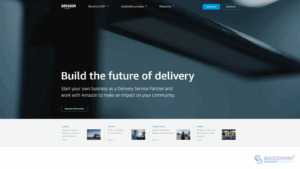
FedEx Supply Chain
FedEx Supply Chain specializes in providing end-to-end supply chain solutions tailored to eCommerce businesses. They offer warehousing, fulfillment, transportation, and reverse logistics services, supported by advanced analytics and technology-driven solutions. FedEx’s global network and commitment to innovation make them a preferred partner for businesses seeking scalable logistics solutions.
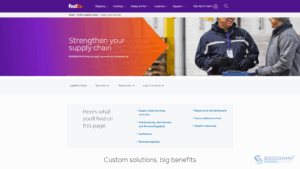
UPS
UPS is renowned for its extensive transportation and logistics capabilities, including parcel delivery, freight forwarding, and supply chain management services. UPS offers customizable logistics solutions designed to optimize efficiency and meet specific business needs. Their focus on sustainability and technological innovation, such as UPS My Choice and advanced tracking systems, enhances transparency and reliability in eCommerce logistics.
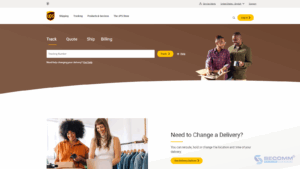
Ecommerce Logistics contributes to the success of online businesses by ensuring efficient order fulfillment, timely delivery, and enhanced customer satisfaction. From managing inventory and processing orders to optimizing shipping routes and leveraging technology, every aspect of eLogistics contributes to operational excellence in the digital marketplace.
A key takeaway from this article is the critical importance of selecting the right logistics partner. By partnering with a logistics provider that aligns with your specific business needs, you can streamline operations, mitigate logistical challenges, and position your eCommerce venture for sustained success.
SECOMM team has extensive experience of eCommerce in many APAC markets like Vietnam, Australia, NewZealand, HongKong and Singapore. We can help you apply logistics to eCommerce, optimize your customer shopping experience, streamline checkout, and more to make your eCommerce empire shine!
Contact us today for free consultation!
 40
40
 6,401
6,401
 0
0
 24
24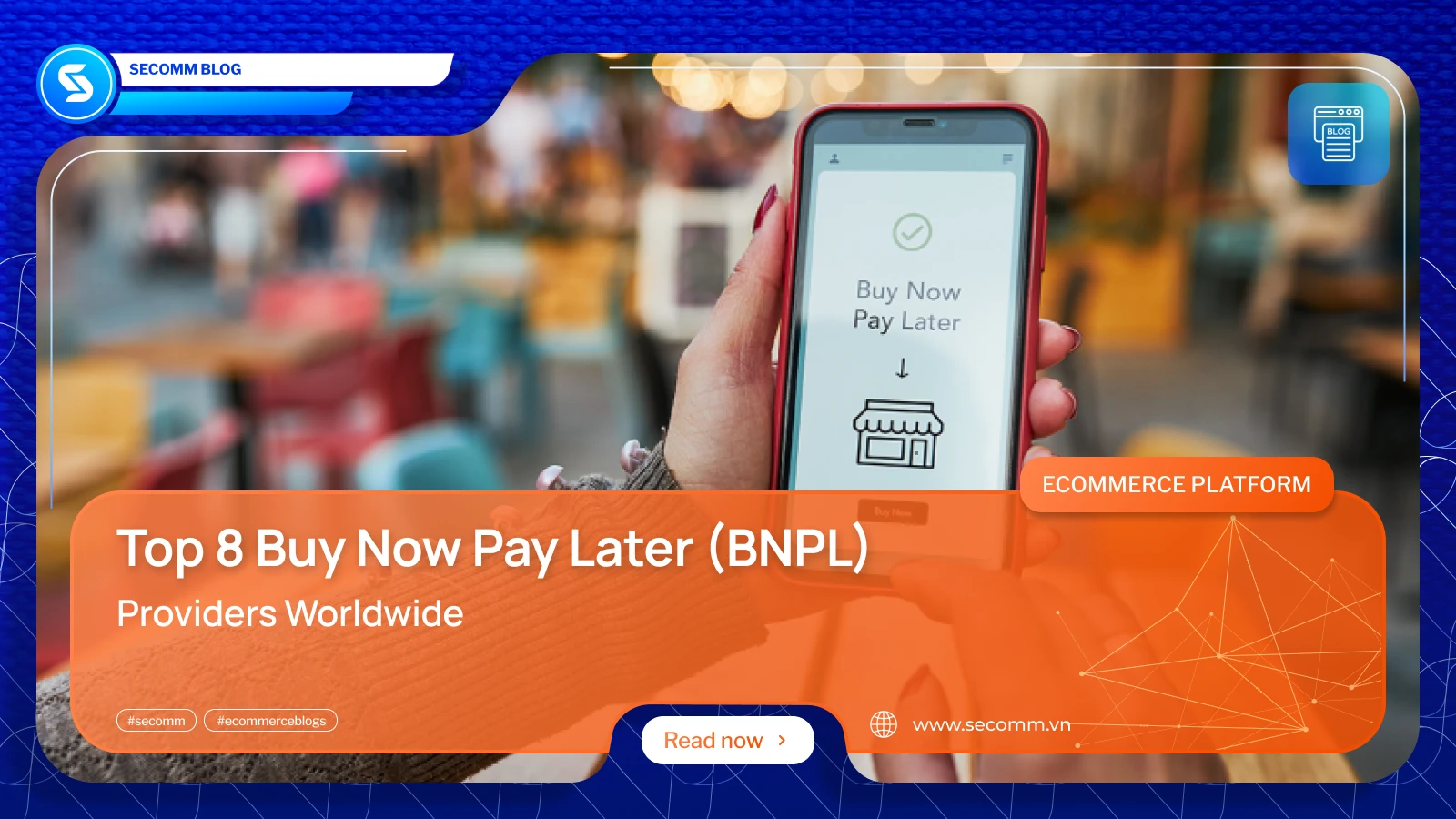
Buy Now Pay Later (BNPL) payment methods have become a global trend, making it easier for consumers to shop without paying the full amount upfront. Below are some of the most famous BNPL providers worldwide.

Afterpay is one of the most popular BNPL services globally, especially in Australia, the US, and the UK. Founded in 2014 in Australia, Afterpay quickly expanded to many other markets and became a well-known name in the BNPL industry.
How it works: Afterpay allows consumers to split their payments into four interest-free installments over two weeks. No credit checks are required, and it is easily integrated into many eCommerce websites.
Benefits:
Drawbacks:
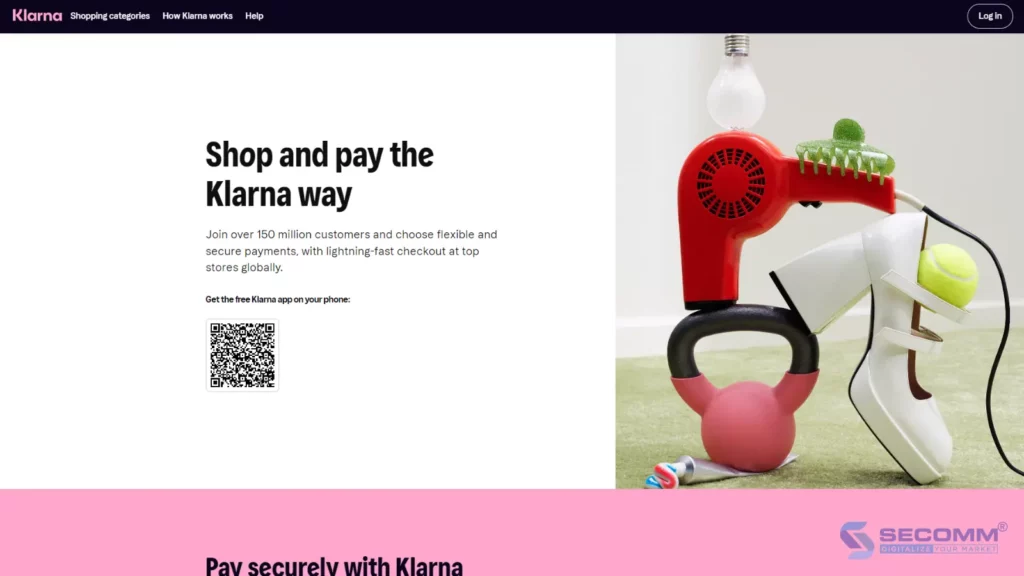
Klarna is a Swedish fintech company providing BNPL services in many European countries and the US. With over 90 million users worldwide, Klarna is one of the largest BNPL providers.
How it works: Klarna offers various payment options, including paying in 30 days, splitting payments into four interest-free installments, or long-term financing with interest.
Benefits:
Drawbacks:
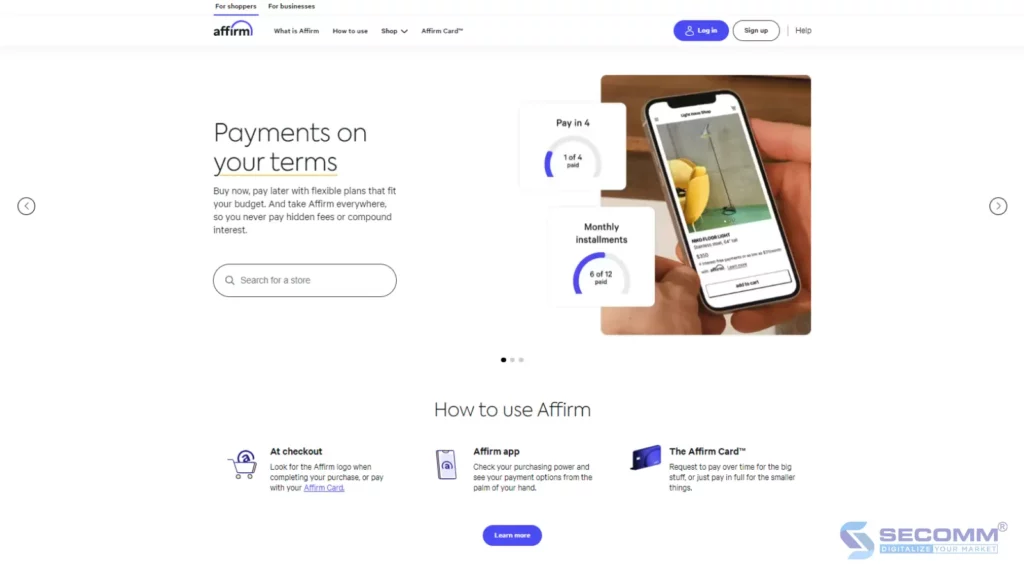
Affirm is a BNPL service from the US, founded by Max Levchin, one of the co-founders of PayPal. Affirm allows consumers in the US and Canada to shop and pay in flexible installments.
How it works: Affirm offers loans with payment terms from 3 to 36 months with clear interest rates from 0% to 30%, depending on the consumer’s credit.
Benefits:
Drawbacks:
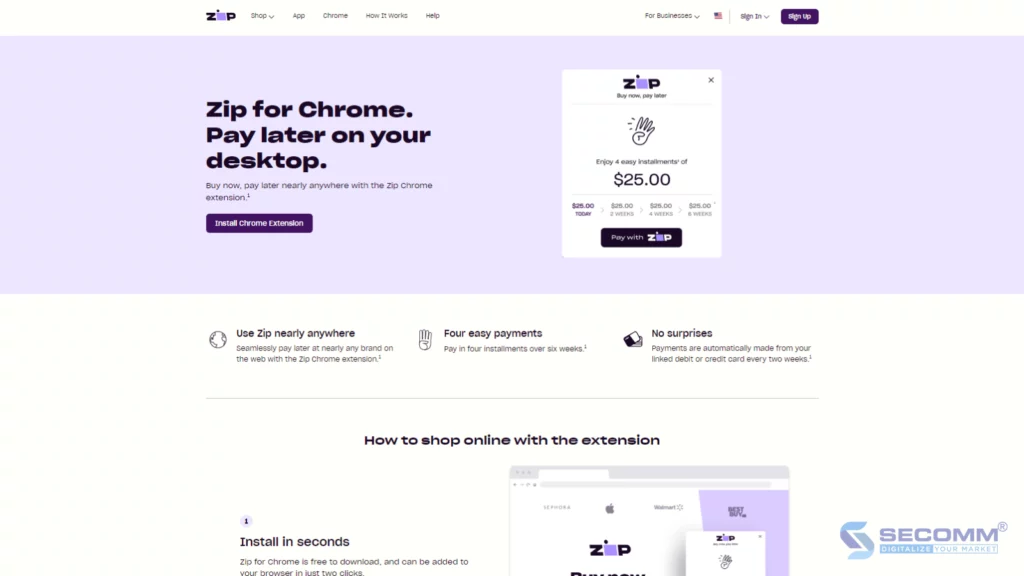
Zip is a BNPL service based in Australia, operating in several countries including the US, the UK, and New Zealand. Zip offers flexible payment solutions for consumers.
How it works: Zip allows consumers to split payments into four interest-free installments every two weeks or choose longer-term financing with interest.
Benefits:
Drawbacks:
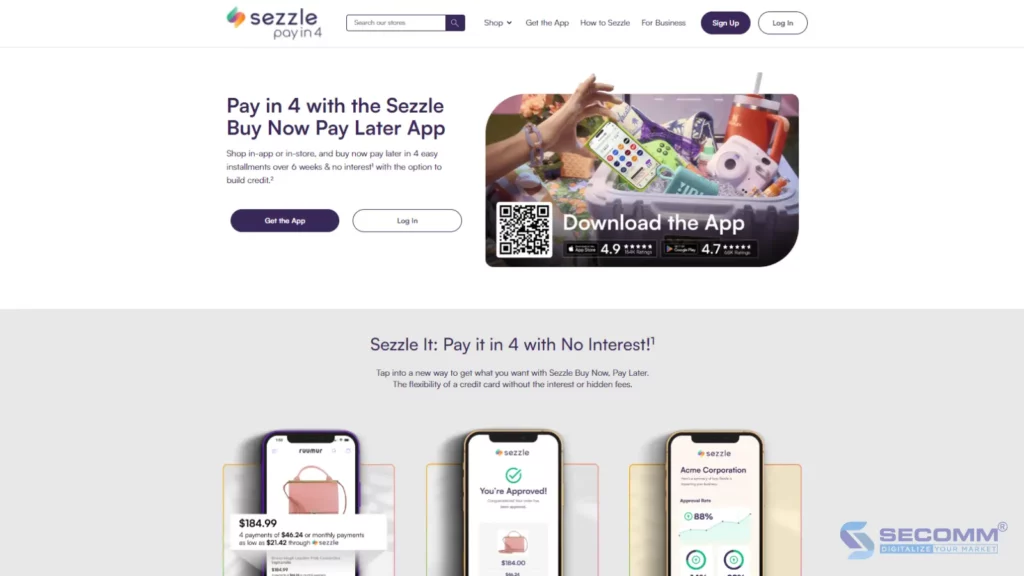
Sezzle is a BNPL service from the US, primarily operating in North America. Sezzle focuses on providing flexible payment solutions for young consumers.
How it works: Sezzle allows consumers to split payments into four interest-free installments over six weeks. No credit checks are required during registration.
Benefits:
Drawbacks:
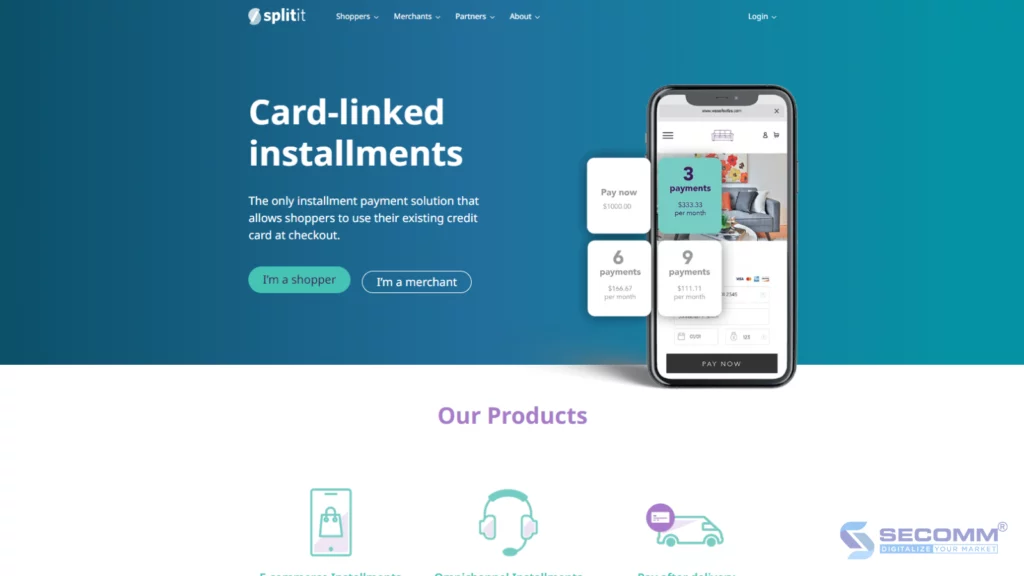
Splitit is another BNPL service from the US, with a different approach compared to traditional services. Splitit uses the available credit limit on consumers’ credit cards to split payments.
How it works: Splitit allows consumers to split payments into interest-free installments by holding the credit limit on their credit cards.
Benefits:
Drawbacks:

Perpay is a BNPL service from the US, focusing on helping consumers purchase everyday products and pay in installments through direct payroll deductions.
How it works: Consumers can shop on the Perpay platform and pay monthly installments through direct payroll deductions.
Benefits:
Drawbacks:
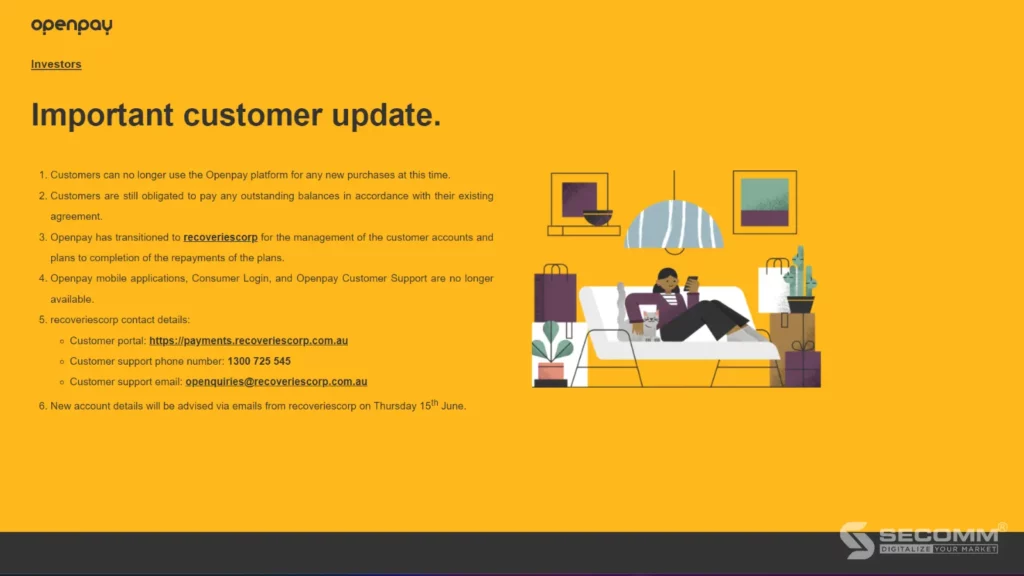
Openpay is a BNPL service from Australia, offering flexible payment plans for consumers and businesses in Australia, New Zealand, and the UK.
How it works: Openpay allows consumers to split payments into flexible installments ranging from 2 to 24 months.
Benefits:
Drawbacks:
FINAL WORDS
The Buy Now Pay Later (BNPL) services have revolutionized how consumers shop globally, providing significant flexibility and convenience. Providers such as Afterpay, Klarna, Affirm, Zip, Sezzle, Splitit, Perpay, and Openpay have developed diverse financial solutions, meeting the needs of both consumers and businesses. Each service has its own advantages; however, using BNPL also comes with challenges such as late fees, the risk of overspending, and the impact on credit scores if not managed well.
To maximize the benefits of BNPL, consumers need to manage their finances carefully and choose the service that fits their needs and capabilities. Meanwhile, businesses should continue to work closely with BNPL providers to offer the best shopping experience for customers while fully exploiting the potential of this payment method.
 2
2
 6,411
6,411
 0
0
 1
1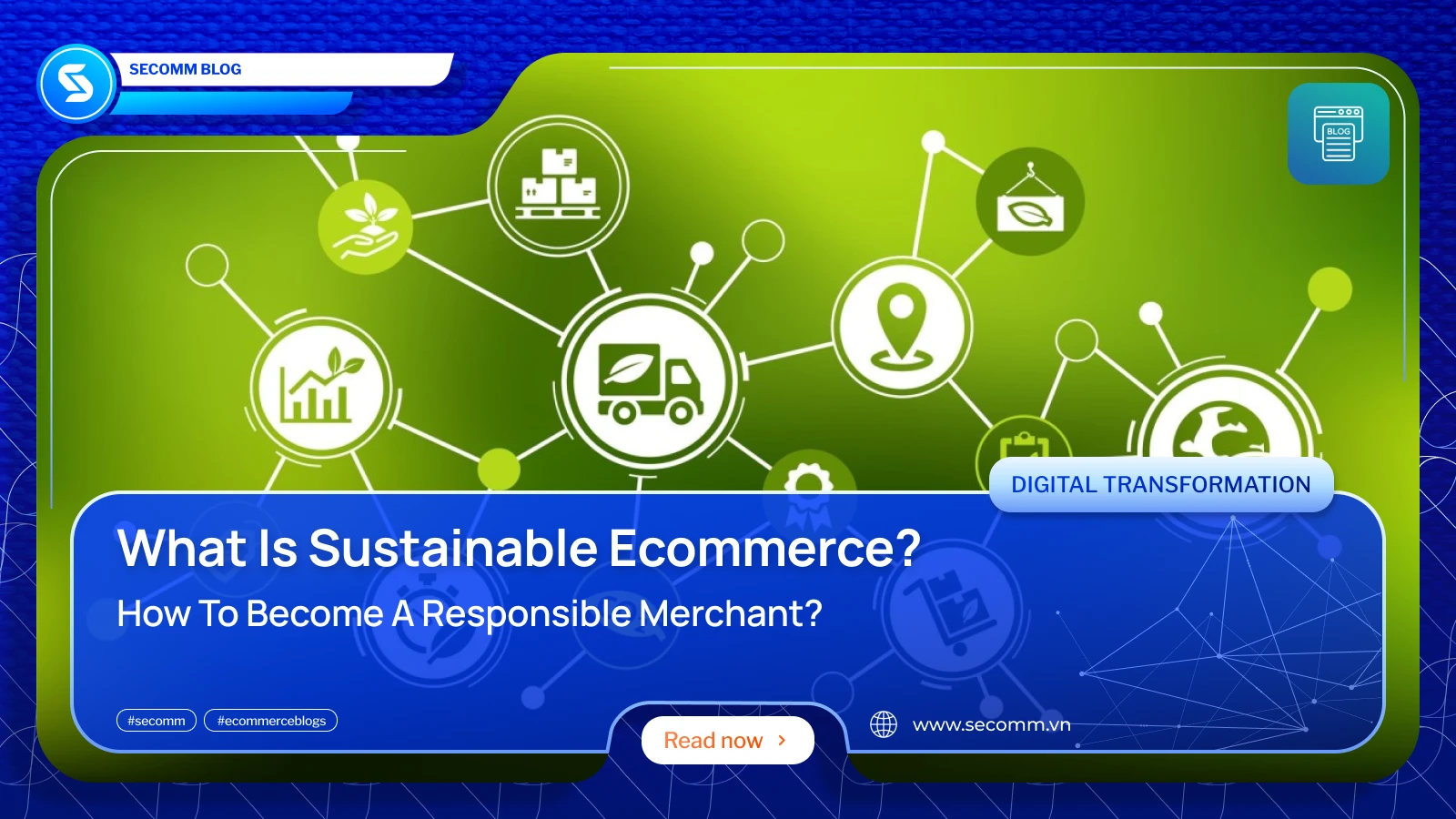
eCommerce has become an integral part of our daily lives, offering unparalleled convenience and access to a vast array of products. However, as the industry continues to grow, so does its environmental footprint. From excessive packaging waste to carbon emissions from shipping, the environmental impact of eCommerce cannot be ignored. This brings us to the concept of sustainable eCommerce—a transformative approach that seeks to minimize the negative environmental effects of online retail while promoting ethical business practices.
Sustainable eCommerce is not just a trend; it’s a response to the increasing consumer demand for environmentally friendly and socially responsible products. A survey shows that 72% of respondents reported that they were actively buying more environmentally friendly products than they did five years ago, while 81% said they expected to buy even more over the next five years.
In this blog, we will delve into the essence of sustainable eCommerce, explore its importance, examine the growing demand for it, and provide practical steps on how you can become a responsible merchant.
Sustainable eCommerce refers to the practice of conducting online business in a way that minimizes environmental impact and promotes social responsibility. At its core, it involves making mindful decisions at every stage of the business process, from product sourcing and manufacturing to packaging, shipping, and customer engagement. The goal is to reduce the carbon footprint, minimize waste, and ensure that ethical standards are upheld throughout the supply chain.
There are some common components in the eCommerce sustainability, including:
Offering products that are made from sustainable materials, are biodegradable, or have a lower environmental impact is crucial. This means choosing materials that are renewable, such as organic cotton or bamboo, over conventional materials that may deplete natural resources or cause pollution. Additionally, promoting products that are ethically sourced ensures that they are produced under fair labor conditions, respecting workers’ rights and contributing to social sustainability.
Sustainable packaging involves using materials that can be recycled, are biodegradable, or are made from recycled content. For instance, using cardboard boxes made from recycled paper or packing peanuts that are biodegradable can greatly reduce the environmental footprint. This approach not only minimizes waste but also appeals to environmentally conscious consumers.
Reducing energy consumption in the warehousing and logistics aspects of eCommerce is another critical component. This can be achieved by:
Minimizing waste throughout the entire eCommerce process is essential. This involves:
Ensuring that all business practices are ethical and transparent is fundamental to sustainable eCommerce. This includes:
By integrating these key components to strategies, eCommerce businesses can significantly reduce their environmental impact, support social responsibility, and meet the growing demand from consumers for more sustainable and ethical products.
Understanding the importance of eCommerce sustainability is crucial for businesses looking to thrive in today’s market. Here are several reasons why adopting sustainable practices in eCommerce is vital:
The environmental impact of traditional eCommerce practices is significant. From the excessive use of plastic packaging to the carbon emissions from shipping and logistics, the eCommerce industry contributes to environmental degradation. By adopting sustainable practices, businesses can significantly reduce their carbon footprint, decrease pollution, and help conserve natural resources. Sustainable eCommerce practices, such as using eco-friendly packaging and optimizing delivery routes, play a vital role in mitigating the industry’s environmental impact.
Consumer behavior is shifting towards sustainability. More and more customers are becoming environmentally conscious and prefer to purchase from brands that align with their values. Studies show that a growing number of consumers are willing to pay a premium for products that are sustainably produced and packaged. By adopting sustainable practices, eCommerce businesses can meet this demand, attract a broader customer base, and enhance customer loyalty. Being a responsible and eco-friendly brand can also differentiate a business in a crowded market.
Sustainable eCommerce practices can lead to significant business benefits. These include cost savings from reduced waste and energy consumption, improved brand reputation, and increased customer loyalty. Businesses that prioritize sustainability can also access new markets and opportunities, such as partnerships with other eco-friendly brands and certifications that can enhance credibility. Additionally, sustainable practices can lead to innovation, as companies find new ways to reduce their environmental impact and improve efficiency.
Governments and regulatory bodies are increasingly implementing stricter environmental regulations. Businesses that do not comply with these regulations risk facing fines, penalties, and damage to their reputation. By adopting sustainable practices, eCommerce businesses can stay ahead of regulatory changes, ensure compliance, and avoid potential legal issues. Proactively embracing sustainability also positions businesses as leaders in their industry, setting an example for others to follow.
Sustainability is essential for the long-term viability of businesses. As natural resources become scarcer and environmental issues become more pressing, companies that do not adopt sustainable practices may face higher costs and supply chain disruptions. By integrating sustainability into their business model, eCommerce companies can ensure they are resilient to future challenges and are better prepared for a changing market landscape. Sustainable practices also contribute to a positive corporate image, which can attract investors and stakeholders who prioritize responsible business operations.
Becoming a sustainable eCommerce business involves implementing practices that minimize environmental impact and promote social responsibility. Here are key steps to help you achieve sustainability:
Optimizing your supply chain is crucial for sustainability. This involves sourcing materials and products from suppliers who adhere to ethical and environmental standards.
Shipping is a significant contributor to the environmental footprint of eCommerce. Optimizing your shipping strategy can help reduce emissions and improve efficiency.
Packaging is a major source of waste in eCommerce. Switching to recyclable packaging can significantly reduce environmental impact.
Supporting environmental charities and initiatives can enhance your sustainability efforts and demonstrate your commitment to making a positive impact.
By implementing these strategies, your eCommerce business can significantly reduce its environmental impact, meet the growing demand for sustainable practices, and build a loyal customer base that values social responsibility. Adopting sustainability is not only good for the planet but also beneficial for your business’s long-term success.
Final words
eCommerce sustainability is no longer a luxury but a necessity. Consumers are increasingly prioritizing eco-friendly and socially responsible brands, and businesses must adapt to meet this demand. Embracing sustainable eCommerce practices, businesses can make informed decisions that contribute to a healthier planet.
 80
80
 3,119
3,119
 1
1
 27
27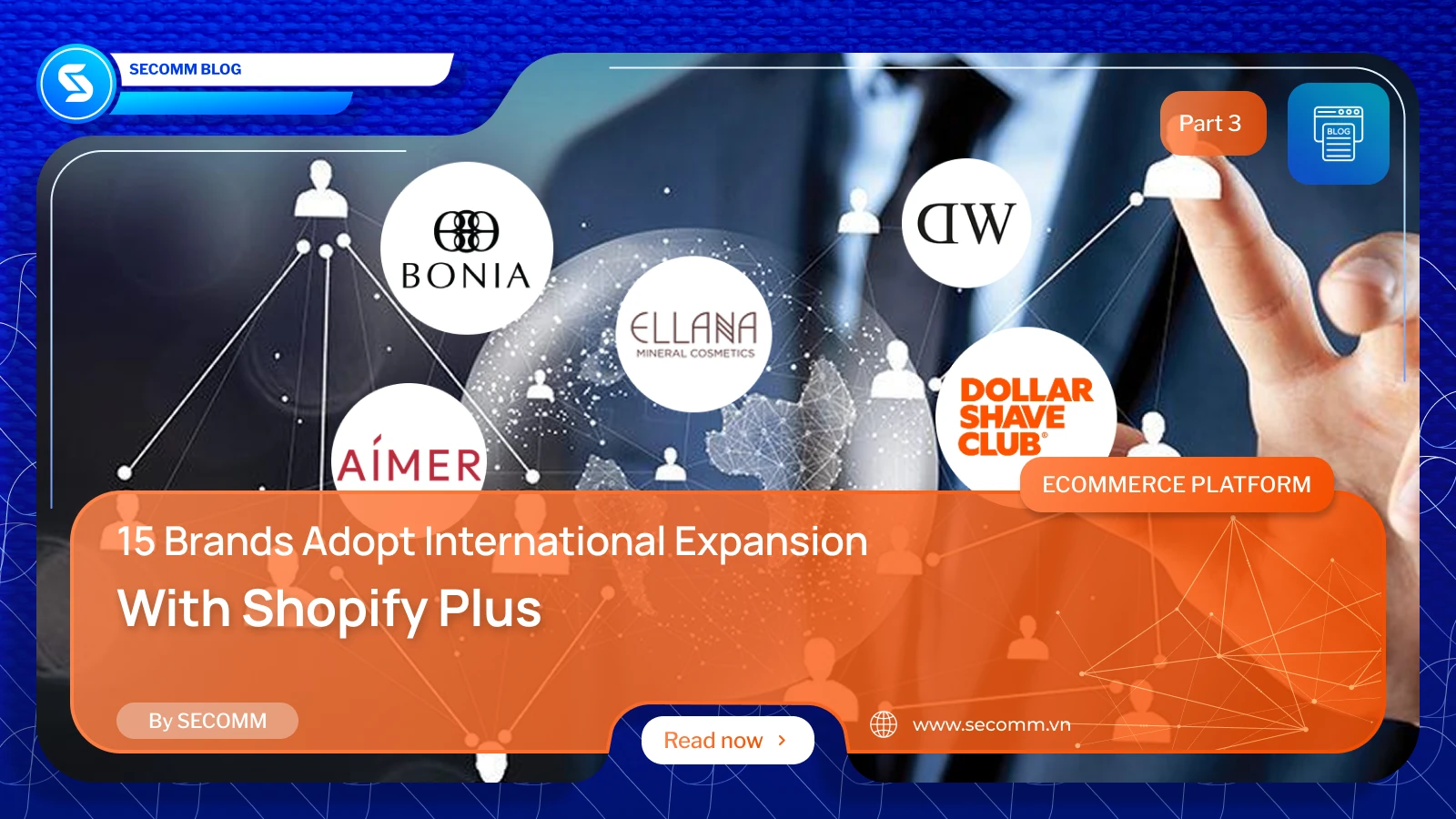
Welcome to the final installment of our three-part series on brands that have successfully embraced international expansion with Shopify Plus. In the previous parts, we explored the journeys of ten dynamic brands that leveraged Shopify Plus to navigate the complexities of global growth. In this concluding chapter, we turn our attention to five more outstanding brands: Ellana Cosmetics, Dollar Shave Club, Daniel Wellington, BONIA, and AIMER.

Dollar Shave Club (DSC) is a renowned American company that revolutionized the personal care industry with its subscription model for razors and personal care products.
Initially, DSC built its own custom eCommerce platform, which provided flexibility and high customization. While this allowed DSC to shape its business model in the digital landscape, managing and maintaining it became complex and resource-intensive over time. As technological solutions like Shopify emerged, offering features and tools that DSC could leverage, the company explored available solutions to integrate them into its existing system. After careful consideration, DSC transitioned to Shopify Plus to better support its profit growth and international expansion goals.
Through Shopify Plus, DSC operates and manages its subscription business model more effectively, integrating multiple applications within the Shopify ecosystem to optimize marketing campaigns and customer care. As a result, DSC reduced system maintenance resources by 40%, reached over 100 million global consumers through ShopApp, swiftly converted international stores to Shopify Plus within weeks instead of months, and increased conversion rates using Shopify’s applications.
Website: dollarshaveclub.com
Industry: Men Health
Traffic: 3.148M/month
Rank: #9,907 (USA) & #50,278 (Global)
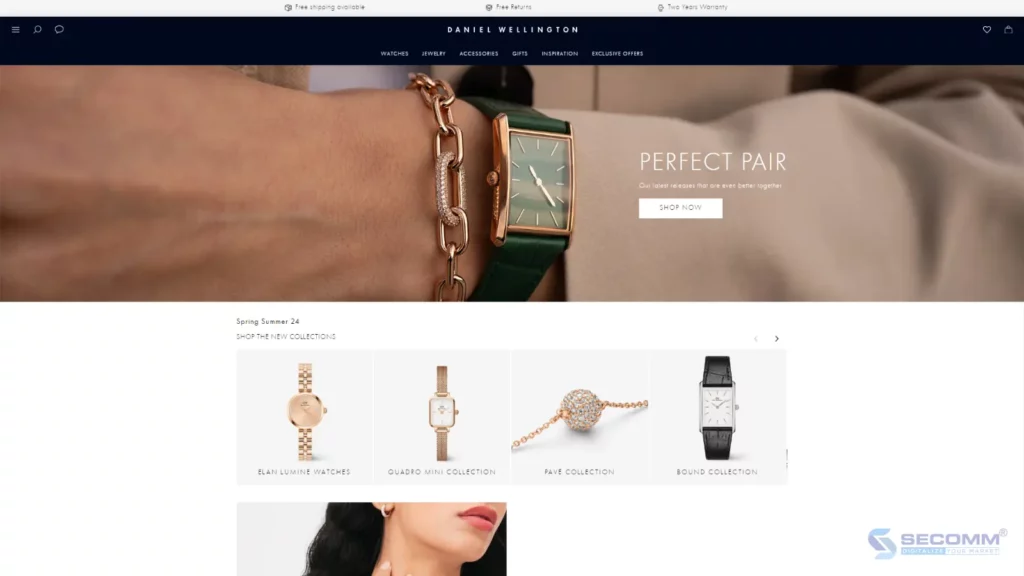
Launched in Sweden in 2011, Daniel Wellington is known for its elegant, minimalist watch designs and superior quality. Before Daniel Wellington adopted Shopify, they faced significant operational challenges, particularly the complexity and cost of their current technology systems, which included an e-commerce platform lacking user interface from CommerceTools and Contentful as their chosen CMS platform. The development and rollout of new features were time-consuming and cumbersome, consuming substantial resources. Additionally, Daniel Wellington used an on-premise ERP system, which increased costs and complexity. With multiple stores and integrated systems, product changes took months or even years to implement, resulting in delayed time-to-market.
Since transitioning to Shopify Plus, all these issues have been thoroughly addressed. Website features that previously took months or even years to develop and launch now take only days or weeks. This practical approach allows for quicker decision-making and agile response based on market dynamics. Other notable outcomes include the rapid launch of 12 expansion stores, a 50% reduction in platform fees, and fewer resource expenditures on maintenance and development compared to before.
Website: https://global.danielwellington.com/
Industry: Fashion
Traffic: 2.773M/month
Rank: #78,900 (USA) & #63,785 (Global)

Established in 1974, BONIA has gradually become a prestigious and irreplaceable fashion brand in Southeast Asia. After making the strategic decision to transition from Adobe Commerce to Shopify due to previous challenges with product launch speed and website responsiveness, BONIA aimed to leverage its online presence for international expansion. Recognizing the need to provide personalized experiences for customers while maintaining a consistent brand identity across different markets, BONIA also sought to ensure that managing multiple websites wouldn’t burden its team with excessive time and costs.
Therefore, BONIA upgraded to Shopify Plus. This strategic move enabled BONIA to harness the expansive capabilities of Shopify Plus storefronts, allowing them to establish multiple online storefronts alongside their flagship Malaysian website. Leveraging this capability, BONIA seamlessly integrated themes and layouts from its Malaysian store while ensuring each new store exudes its own distinct charm and is localized to specific locations. This localization was achieved through customized adjustments tailored to each specific region. Shopify Plus’s organizational admin also played a crucial role, providing BONIA with a centralized command center for all its stores.
As a result, BONIA increased its overall revenue by 10% through expansion into Singapore and saw a 25% annual increase in website traffic.
Website: https://bonia.com/
Industry: Fashion
Traffic: 108,842/month
Rank: #27,473 (Malaysia) & #1,510,285 (Global)

In 2007, Ellana Cosmetics was founded with the goal of helping global consumers achieve better skin and improve their skincare knowledge. Recognizing the opportunity to reach more customers online, the brand initially started with a basic HTML website, then moved to Adobe Commerce and later WooCommerce. However, Ellana Cosmetics was dissatisfied with the results these platforms provided. The lack of robust data management tools made it difficult to personalize customer experiences across different markets, resulting in significant online sales losses.
Ellana Cosmetics switched to Shopify when their e-commerce marketing efforts were still in their infancy in the Philippines. This allowed Ellana to strengthen its technological foundation and accelerate growth and efficiency by upgrading to Shopify Plus shortly thereafter. The company leveraged various solutions to optimize managing multiple expanded storefronts, including Shopify Flow. As a result, the average order value increased by 17%, payment failure rates decreased by 40%, and online revenue increased by 50%.
Website: https://www.ellanacosmetics.com/
Industry: Cosmetics
Traffic: 88,075/month
Rank: #61,563 (Philippines) & #2,754,014 (Global)

Founded in 1993, AIMER is one of the leading lingerie brands in China. With over 20 years of experience in designing and creating premium and luxurious lingerie, AIMER takes pride in its continuously evolving creative design team, which has developed more than 400 new products under its five main brands: AIMER, imi’s, LA CLOVER, AIMER Men, and Aimer Kids. Supported by these innovative products, AIMER has established an international presence far beyond its homeland, including regions such as North America, Europe, and the Middle East.
International sales are a crucial part of AIMER’s development strategy. However, the brand faced challenges regarding customization, taxation, and compliance with tax rules. AIMER migrated its platform to Shopify Plus, leveraging its customization capabilities to meet the needs of customers in international markets.
Additionally, utilizing Shopify Plus’s Avalara tax automation feature helped AIMER automatically calculate taxes based on the customer’s international address. Instead of manually calculating taxes, Shopify Plus accurately computed taxes for each order based on the latest tax regulations of the target market and automatically added taxes to the final checkout page, ensuring transparency in tax costs for consumers.
As a result, AIMER saw a 105% increase in monthly site visits, a 57% increase in monthly conversion rates, and a 62% increase in monthly page views.
Website: https://aimeronline.com/
Industry: Fashion
Traffic: 32,449/month
Rank: #51,992 (Hong Kong) & #1,948,207 (Global)
Final Words
In this final part of our series, we’ve delved into the inspiring journeys of Ellana Cosmetics, Dollar Shave Club, Daniel Wellington, BONIA, and AIMER. These brands exemplify how leveraging Shopify Plus can transform the challenges of international expansion into opportunities for growth and success.
As we conclude our series, it is evident that the journey to international expansion is complex but highly rewarding with the right tools and strategies. For brands looking to embark on this path, the experiences of 15 success stories will provide valuable insights and inspiration.
Need a deep consultation? Contact SECOMM for free!
 2
2
 4,009
4,009
 0
0
 1
1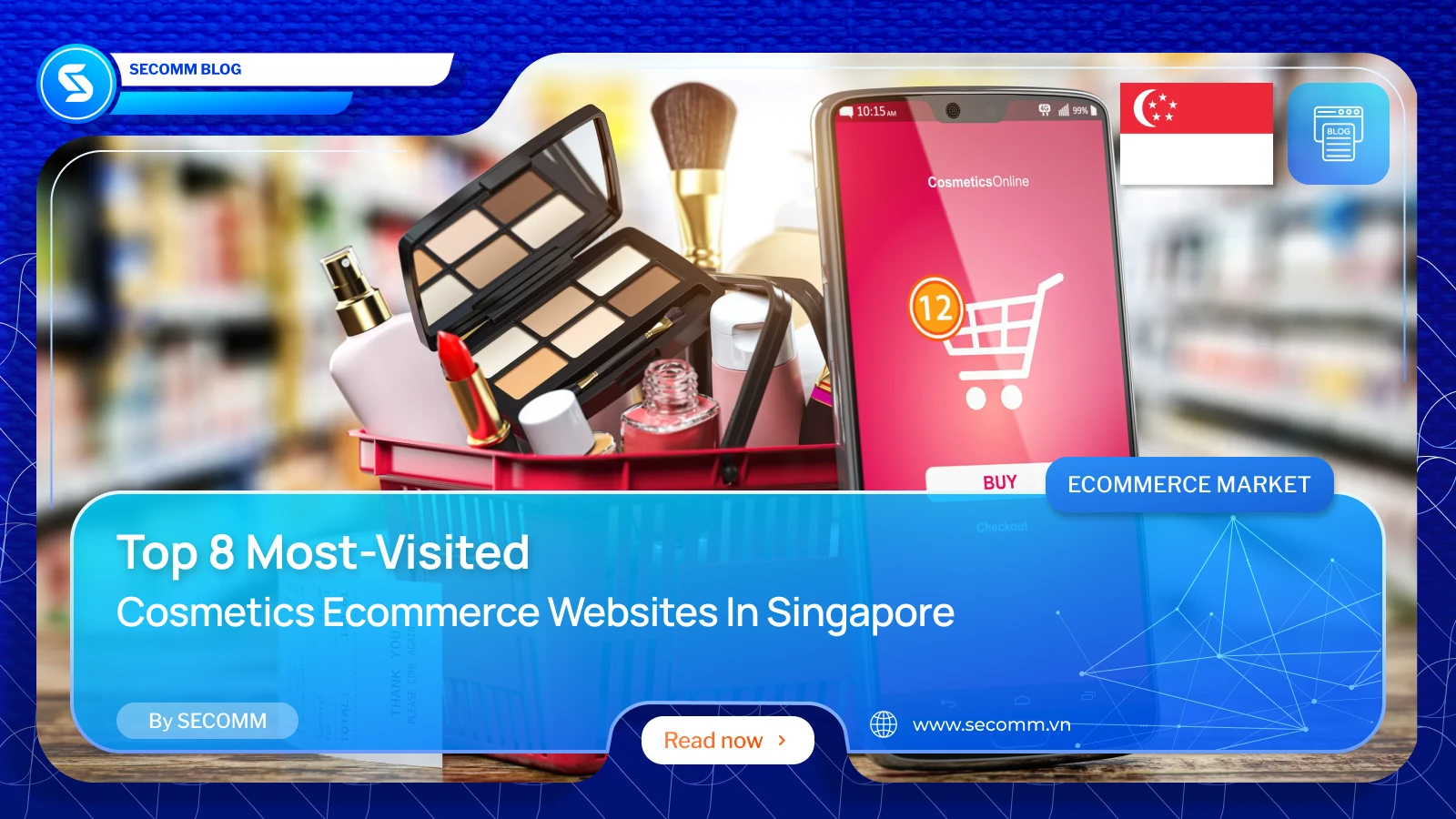
The cosmetics eCommerce industry in Singapore is witnessing explosive growth and continuous innovation, becoming one of the most promising and dynamic markets in the Southeast Asia region. With the increasing demand for beauty and personal care products from consumers, coupled with support from advanced technology and digital infrastructure, online cosmetics businesses in Singapore have been seizing opportunities to expand market share and enhance customer experiences.
Below are cosmetics 8 eCommerce websites trusted by Singaporean consumers for shopping.
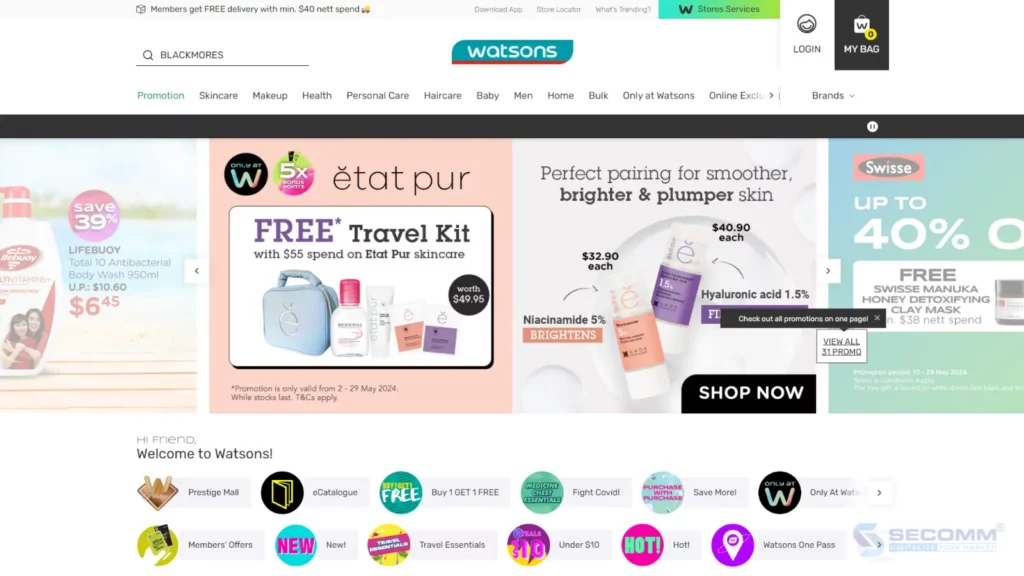
The cosmetics and healthcare retail chain Watsons has gained fame across Asia, and Singapore is no exception. As a member of the A.S. Watson Group, Watsons has solidified its position with thousands of stores worldwide and a robust eCommerce website.
Watsons Singapore is renowned for its extensive product portfolio, ranging from cosmetics and skincare to haircare and healthcare products. The eCommerce website of Watsons Singapore is built on the SAP Commerce Cloud platform, providing customers with a smooth and diverse shopping experience. Search, product filtering, and cart features are optimized and customized, while encouraging customers to create accounts to enjoy exclusive benefits. This helps track and measure customer behavior on the website, leading to the most effective sales and marketing strategies.
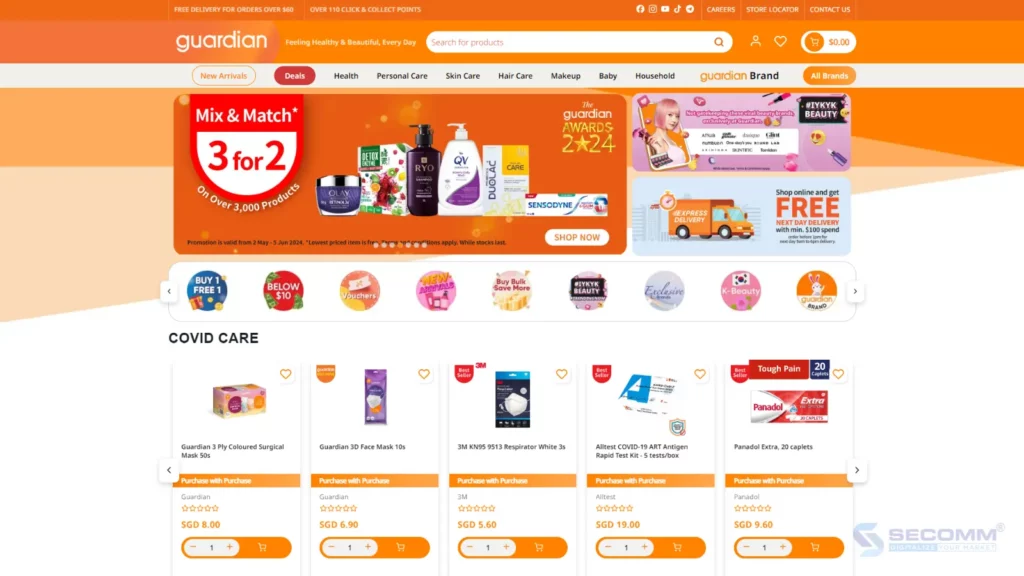
Guardian is a retail chain specializing in healthcare, cosmetics, and other consumer products. Guardian has a presence in many countries and regions worldwide, including Singapore, offering a range of products from renowned and reliable brands.
The eCommerce website of Guardian is built on the SAP Commerce Cloud platform, providing many useful features for users. Customers can easily search for and purchase products, manage their shopping carts, and make convenient payments. Additionally, the website offers promotions and online support services to help customers have a comfortable and secure online shopping experience. Furthermore, customers can also review and provide feedback on products, providing useful information for other users.
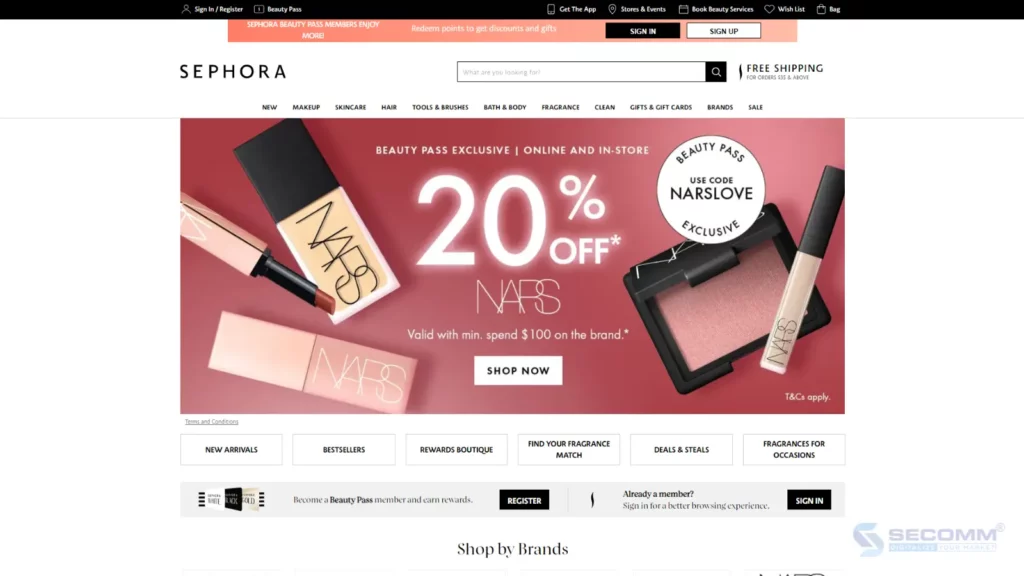
Similar to Guardian, Sephora is a global retail chain specializing in cosmetics and beauty, known for offering a variety of beauty products from leading brands worldwide. Currently, Sephora has a presence in the Singapore market with physical stores in major shopping centers and an eCommerce system, including a website and app for customers. Sephora is loved for its product diversity, customer care services, and innovation in the online cosmetics shopping experience.
Sephora’s eCommerce system in Singapore is built on Vue.js and Nuxt.js programming languages. With this system, Sephora’s customers can quickly search for and explore products through smart search bars and diverse filters. The online shopping experience is optimized with detailed product information, crisp images, and customer reviews.
The Sephora app is also highly regarded, making shopping easier for customers with features like “Virtual Artist” and receiving notifications about promotions. Overall, Sephora provides a range of features and services to meet customers’ cosmetics shopping needs, creating a professional and convenient online shopping experience.

Venus Beauty is one of the retail chains for cosmetics and personal care present in most shopping centers across Singapore, beloved for its product diversity and quality. Since its establishment in 2002, Venus Beauty has continuously grown and expanded, becoming a familiar destination for many local consumers.
The eCommerce website of Venus Beauty is built and developed on the Magento platform, with superior customization and scalability. Customers can easily search for and purchase products thanks to the intuitive and user-friendly website interface. Venus Beauty also regularly offers attractive promotional programs to attract customers to shop more on the website and app.
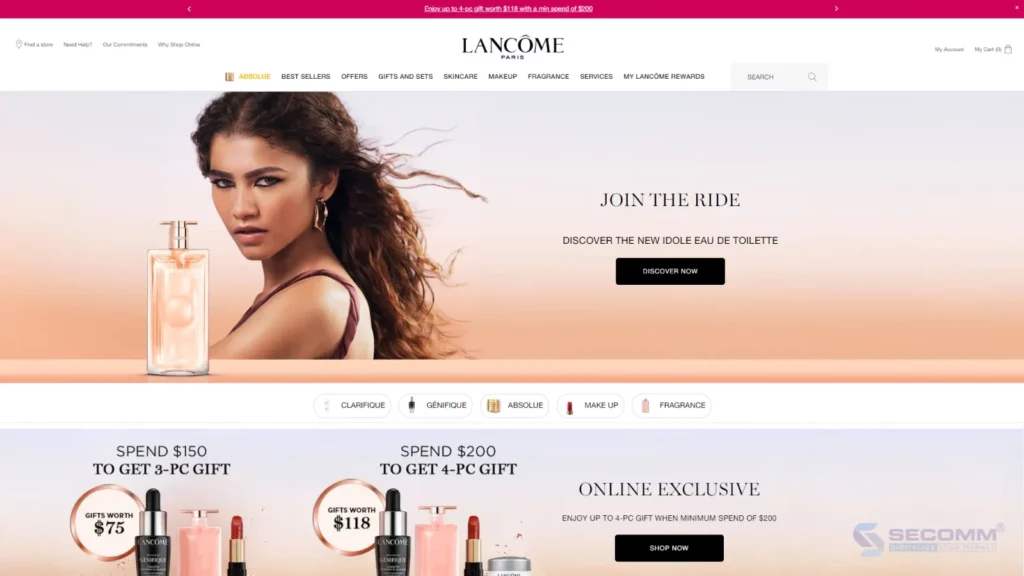
Lancôme Singapore is the branch of the renowned cosmetics brand Lancôme, part of the globally famous L’Oréal Group. Lancôme is known for its high-quality skincare products, makeup, and fragrances, always endorsed by beauty experts and celebrities. In Singapore, Lancôme not only offers premium products suitable for various skin types but also provides optimal online shopping experiences for customers.
The Lancôme website is developed on the Salesforce Commerce Cloud infrastructure with a user-friendly interface, allowing customers to browse, search, view products, and make purchases easily and quickly. The website also integrates AR technology to provide a “Virtual Try-On” experience, allowing customers to try on lipsticks, eyeshadows, and other products realistically before making purchasing decisions.

Cocomo is an eCommerce website specializing in beauty and personal care products from Korean brands. Cocomo boasts a rich product portfolio, including cosmetics, skincare products, haircare, and various other beauty items, catering to all customer beauty needs.
The Shopify website of Cocomo Singapore is designed with a clear, intuitive interface, making it easy for users to search for and select products. Product categories are organized logically, along with efficient search tools, making shopping quick and convenient. Cocomo frequently offers promotions, discounts, and special deals, helping customers save money. These promotional offers are regularly updated and can be easily found on the homepage or product category pages.

In Singapore, the skincare brand Paula’s Choice is just as renowned as in other markets. Founded by skincare expert Paula Begoun, the brand is famous for its science-backed skincare products, known to be safe and effective, free from harmful ingredients like fragrances or dyes.
Paula’s Choice eCommerce website is built on Shopify Plus. The website offers a range of skincare products, including cleansers, toners, serums, moisturizers, sunscreens, and specialized treatments like BHA, AHA, and retinol. These products cater to all skin types, from oily, dry, sensitive, acne-prone to aging skin. Each product on the website comes with detailed descriptions of ingredients, usage instructions, benefits, and supporting scientific research.
Paula’s Choice Singapore regularly runs discount programs, bundled gifts, and special offers for customers. Additionally, customers can easily access support from the customer service team via hotline, email, or live chat.
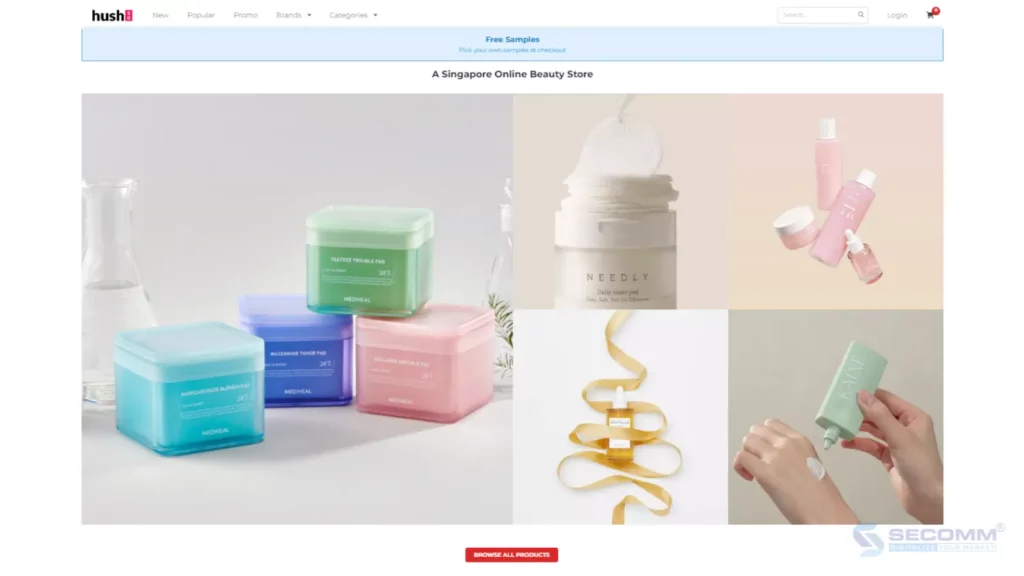
Hush is a familiar destination for Singaporean consumers when they need to shop for cosmetics online. This retail giant specializes in providing beauty and personal care products from various leading brands worldwide such as Laneige, Aveeno, Bioderma, CeraVe, and more.
The Hush website is designed to be simple, modern, and user-friendly. Customers can easily search and browse through products thanks to clear categories and efficient search tools. Additionally, customers can make payments by registering an account or as a guest. Hush also offers fast and free delivery services, allowing customers to track their orders and estimated delivery times.
Lời kết
In summary, the cosmetics eCommerce industry in Singapore has seen significant growth over the years with the presence of many reputable and well-known names. From international brands like Watsons, Lancôme, and Paula’s Choice to local eCommerce platforms like Cocomo and Hush, consumers have countless options to search for and purchase high-quality beauty and personal care products. Each website offers unique and convenient shopping experiences, catering to the increasingly diverse needs of customers.
Hopefully, the list above will help motivate many other beauty businesses to confidently build their own eCommerce websites.
Need more in-depth advice? Contact SECOMM today!
 2
2
 3,919
3,919
 0
0
 1
1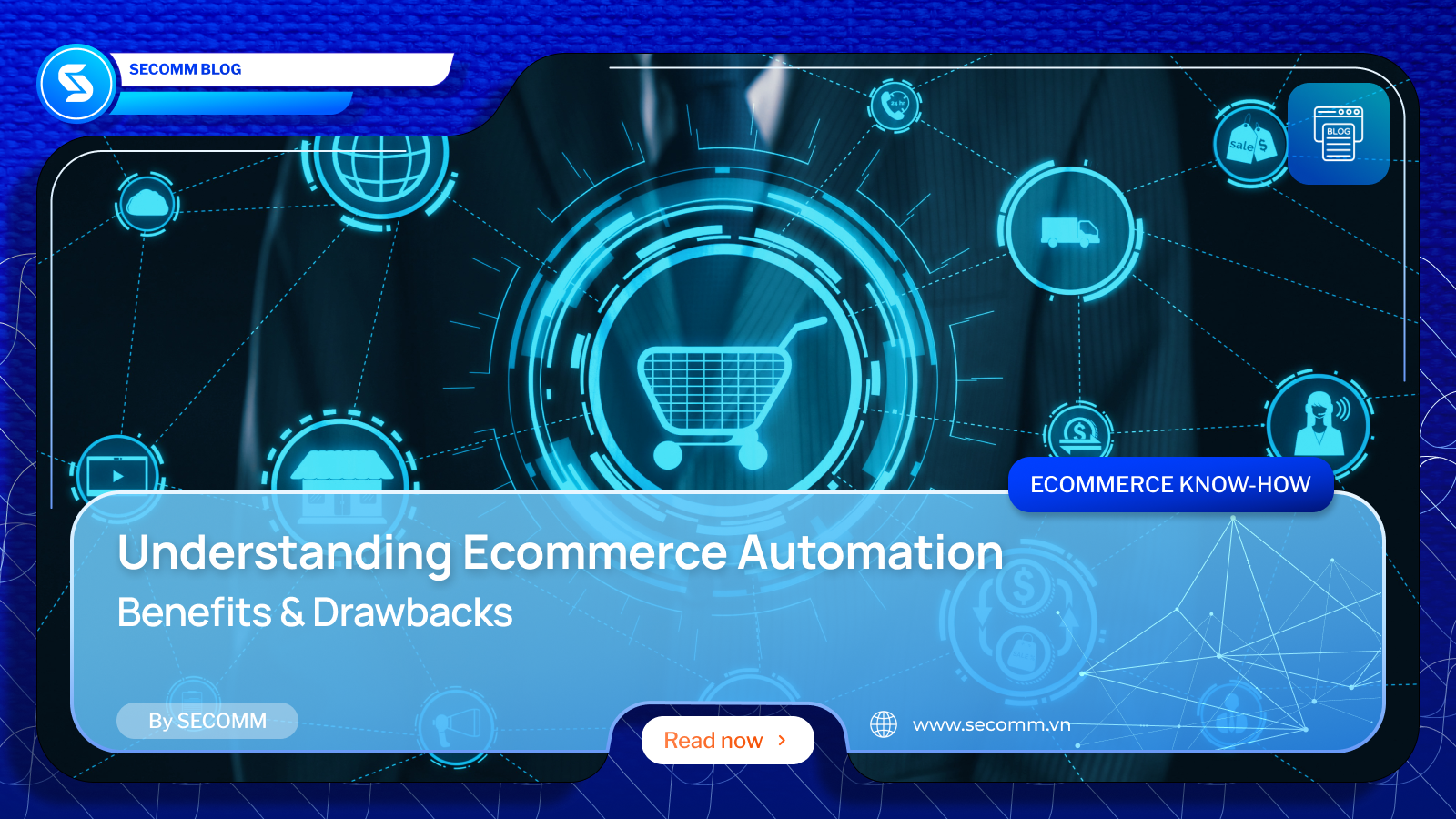
In today’s fast-paced digital world, eCommerce has become a crucial aspect of how businesses operate and grow. As global internet access and adoption rapidly increase, with over five billion internet users worldwide, the number of people making purchases online is ever-increasing. In 2024, retail eCommerce sales are estimated to exceed 6.3 trillion U.S. dollars worldwide, and this figure is expected to reach new heights in the coming years.
Knowing this, companies are constantly seeking ways to enhance efficiency, reduce errors, and provide a seamless customer experience. This is where eCommerce automation comes into play.
By leveraging advanced technologies and tools, businesses can automate repetitive tasks, streamline operations, and scale their efforts without the need for proportional increases in manual labor.
In this blog, we’ll dive into the concept of eCommerce automation, exploring its benefits and drawbacks to help you understand how it can transform your online business. Whether you’re a small startup or a large enterprise, understanding eCommerce automation can be a game-changer in optimizing your operations and staying competitive in the market.
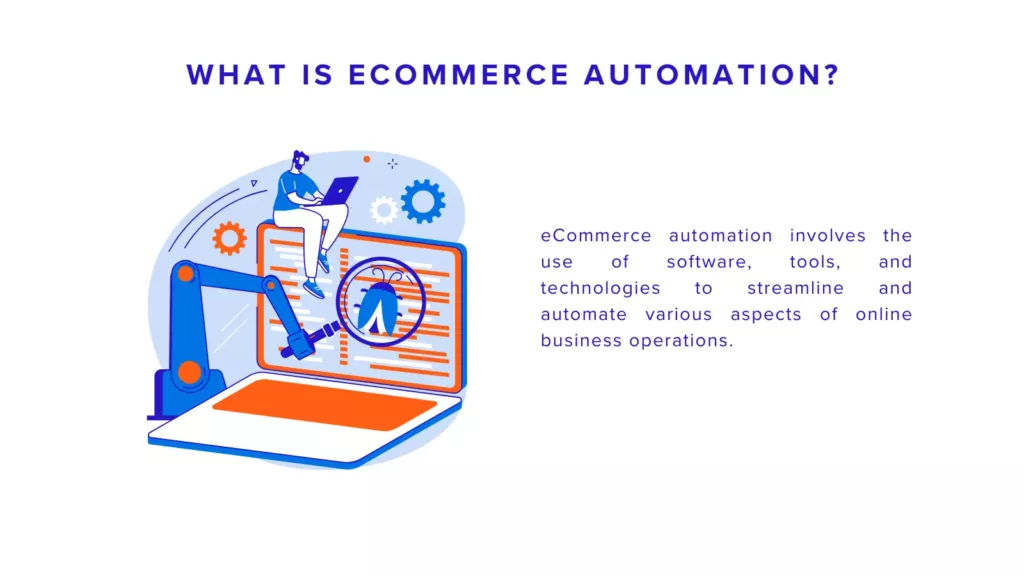
At its core, eCommerce automation involves the use of software, tools, and technologies to streamline and automate various aspects of online business operations. This includes a wide range of tasks, from inventory management and order processing to marketing campaigns and customer service.
Essentially, eCommerce automation aims to reduce the need for manual intervention in repetitive and time-consuming processes, allowing you to operate more efficiently and effectively. By automating routine tasks, you can free up valuable time and resources, enabling them to focus on strategic initiatives, innovation, and providing exceptional customer experiences. Whether it’s automatically updating inventory levels, sending personalized marketing emails, or providing instant customer support through chatbots, eCommerce automation empowers your team to work smarter, not harder, in today’s digital marketplace.
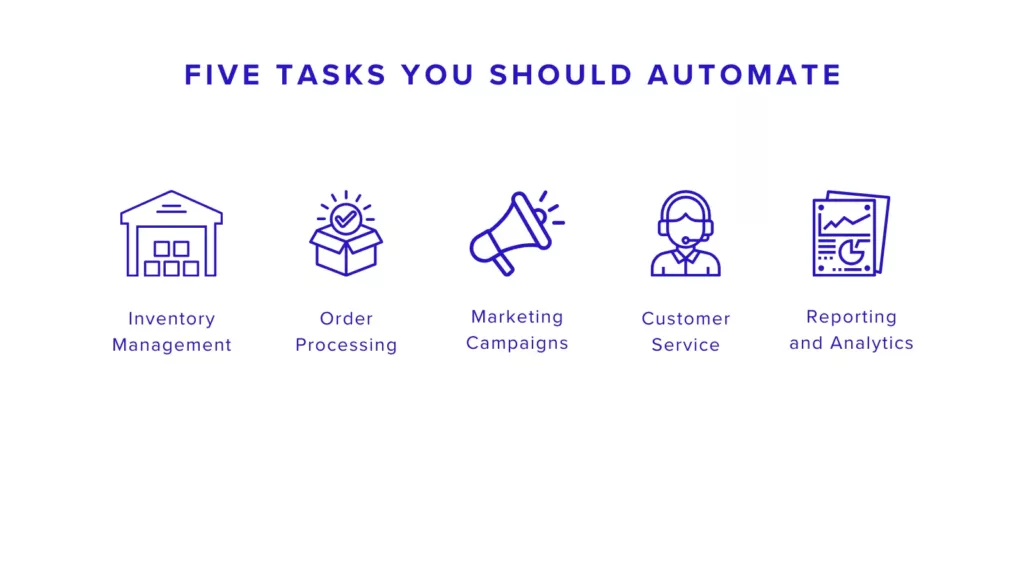
There are numerous tasks ripe for automation, but here are five crucial ones: inventory management, order processing, marketing campaigns, customer service, and reporting/analytics.
Imagine you run an online store selling various products. Keeping track of inventory levels manually can be time-consuming and prone to errors. With automation, you can set up systems that automatically update your stock levels whenever a purchase is made or new stock arrives. Additionally, you can configure alerts to notify you when certain items are running low, prompting you to reorder them before they run out.
When a customer places an order on your website, there are several steps involved in processing and fulfilling that order. Automation can streamline this process by automatically routing orders to the appropriate fulfillment center or warehouse. It can also generate packing slips and shipping labels, ensuring that orders are processed quickly and accurately. With automated order tracking, both you and your customers can easily monitor the status of their orders from placement to delivery.
Marketing is essential for promoting your products and attracting customers to your online store. Automation can help you save time and reach a larger audience by automating email marketing campaigns and social media posts. You can set up automated email sequences to welcome new subscribers, nurture leads, and recover abandoned carts. Similarly, you can schedule social media posts in advance, ensuring consistent engagement with your audience across different platforms.
Providing excellent customer service is crucial for building trust and loyalty with your customers. However, managing customer inquiries and support tickets manually can be overwhelming, especially as your business grows. Automation can help lighten the load by using chatbots and automated response systems to handle common inquiries and support requests. These systems can provide instant responses to frequently asked questions, route complex queries to human agents, and even offer 24/7 support, improving the overall customer experience.
To make informed decisions and track the performance of your online store, you need access to accurate data and analytics. Manually collecting and analyzing data from various sources can be time-consuming and prone to errors. Automation can simplify this process by automatically collecting data from your website, sales platforms, and marketing channels. It can then generate customized reports and dashboards, providing valuable insights into your sales performance, customer behavior, and marketing ROI. With automated reporting and analytics, you can make data-driven decisions to optimize your eCommerce operations and drive business growth.
By automating these five key tasks, you can streamline your eCommerce operations, improve efficiency, and focus your time and resources on growing your business and providing exceptional customer experiences.
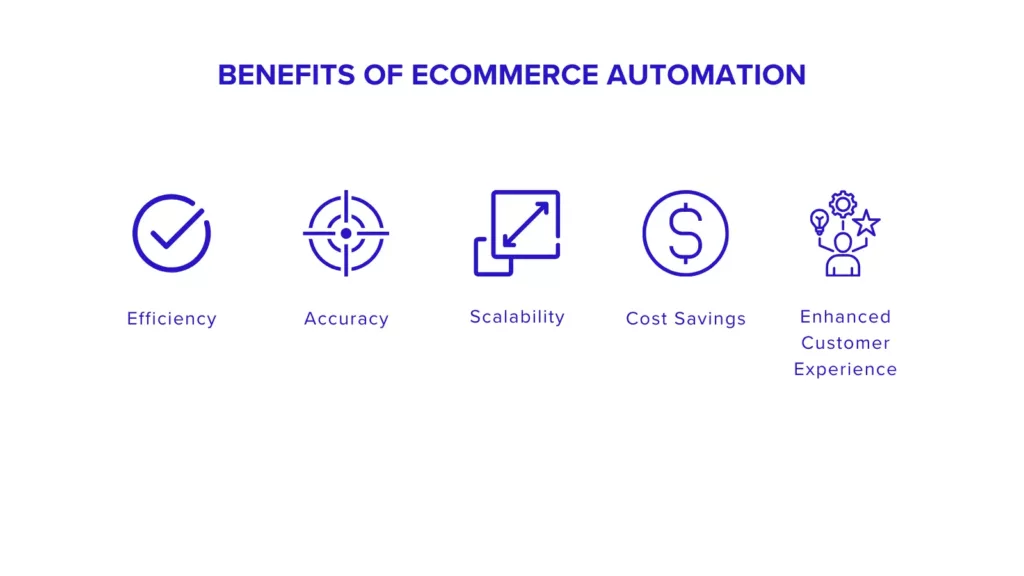
Adopting eCommerce automation can brings your business many benefits. Here are some of them
Automation streamlines your business processes by taking care of repetitive tasks, freeing up your time to focus on more strategic activities. Instead of manually updating inventory or processing orders, automation tools can handle these tasks quickly and efficiently, allowing you to operate more smoothly and effectively.
By reducing reliance on manual data entry and human intervention, eCommerce automation helps minimize the risk of errors. Whether it’s updating inventory levels or processing customer orders, automated systems can perform tasks with a high level of accuracy, ensuring that your business operations run smoothly and your customers receive the correct products on time.
As your eCommerce business grows, automation allows you to scale your operations without a proportional increase in workload. Whether you’re handling a handful of orders or thousands of transactions per day, automated systems can adapt to the increasing demands of your business, ensuring that you can meet customer needs efficiently and effectively.
While there may be initial investments required to implement automation tools and systems, the long-term cost savings can be significant. By streamlining your operations, reducing errors, and improving efficiency, eCommerce automation helps lower your overall operational costs, allowing you to allocate resources more effectively and invest in other areas of your business.
In today’s competitive eCommerce landscape, providing exceptional customer service is essential for building brand loyalty and driving repeat business. Automation plays a key role in enhancing the customer experience by providing quicker and more consistent service. Whether it’s responding to customer inquiries instantly with chatbots or delivering personalized marketing messages based on customer preferences, eCommerce automation helps create a seamless and enjoyable shopping experience for your customers, ultimately leading to higher satisfaction and loyalty.
By leveraging the benefits of eCommerce automation, you can streamline your operations, reduce costs, and deliver a superior customer experience, ultimately driving growth and success in the competitive online marketplace.
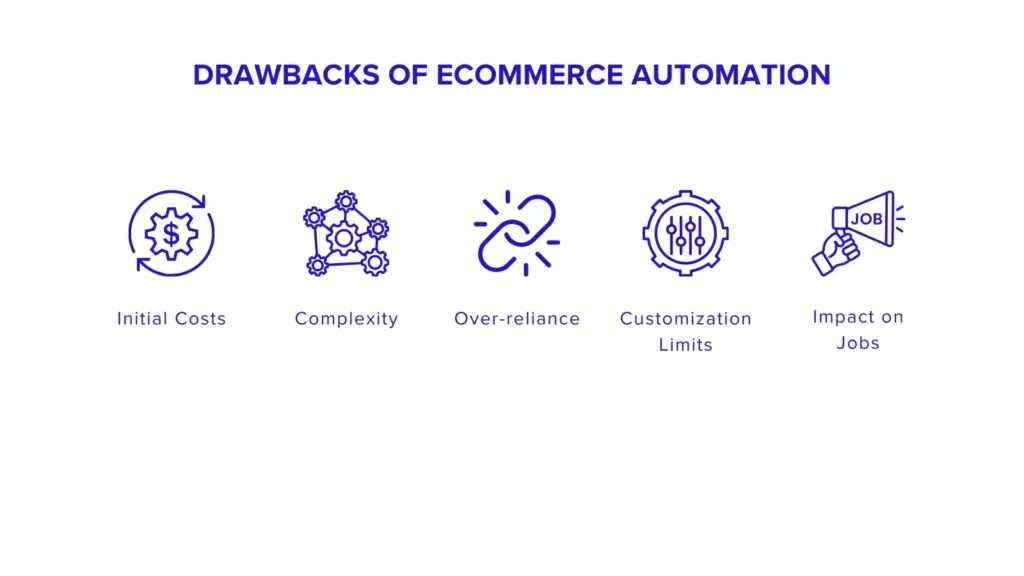
While eCommerce automation offers numerous benefits, there are also some drawbacks to consider.
Implementing eCommerce automation systems can incur significant upfront expenses. You may need to invest in software licenses, hardware infrastructure, and training for employees to effectively use these systems. For enterprises with limited financial resources, or don’t want to invest too much in this aspect, these initial costs can be a barrier to adoption.
Adopting eCommerce automation often involves navigating complex systems and technologies. You may encounter challenges in integrating automation tools with your existing workflows and processes. Additionally, employees may require time and training to familiarize themselves with the new systems, leading to potential productivity disruptions during the transition period.
While automation can enhance efficiency and streamline operations, your team risk becoming overly dependent on technology. Reliance on automated systems may leave you vulnerable to disruptions such as technical failures or system downtimes. Without proper contingency plans in place, these disruptions could significantly impact business operations and customer satisfaction.
Off-the-shelf automation solutions may not always fully align with the unique needs and requirements of every business. Customizing and tailoring automation tools to fit specific business processes can be challenging and time-consuming. You may find yourself constrained by the limitations of pre-built automation solutions, hindering your ability to fully optimize your eCommerce operations.
One of the most significant concerns surrounding eCommerce automation is its potential impact on employment. As your business automate repetitive and manual tasks, there is a risk of job displacement for workers whose roles are replaced by automated systems. This could lead to workforce reductions and require you to invest in reskilling and retraining programs for affected employees.
By understanding and addressing these drawbacks, you can make informed decisions about the extent to which you adopt eCommerce automation, mitigating potential challenges and maximizing the benefits of automation for your operations.
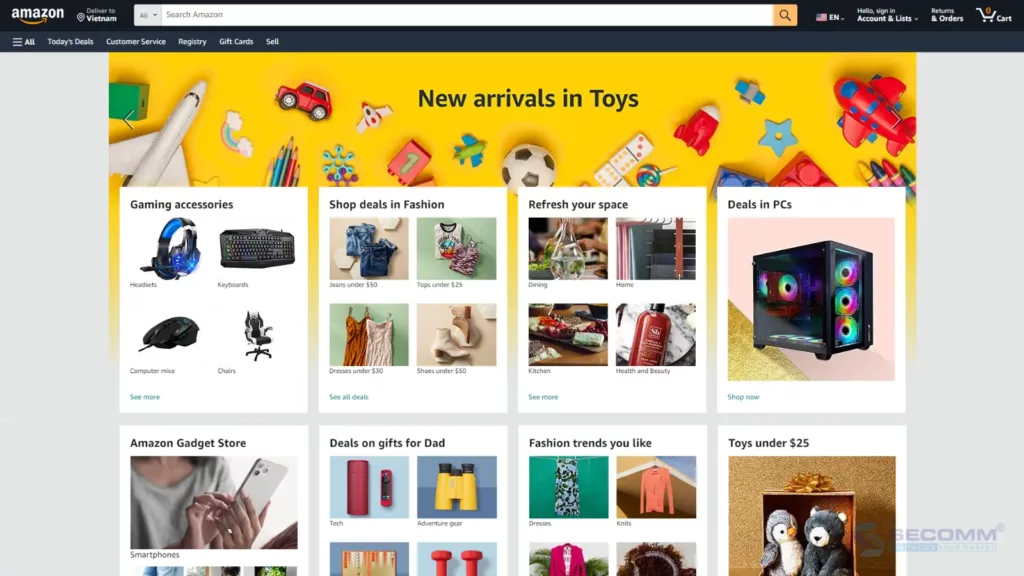
Background: Amazon, founded by Jeff Bezos in 1994, has evolved from an online bookstore to one of the world’s largest eCommerce platforms. With a vast array of products and a global customer base, Amazon’s success lies in its ability to innovate and optimize its operations continuously.
Automation Implemented: Amazon has heavily invested in automation across various aspects of its eCommerce operations.
Results: Amazon’s automation efforts have yielded several significant benefits:
Background: Sephora is a leading global beauty retailer known for its wide range of cosmetics, skincare, and fragrance products. With a strong presence both in physical stores and online, Sephora has built a reputation for offering high-quality products and exceptional customer service.
Automation Implemented: Sephora has leveraged automation to enhance its personalized marketing efforts, catering to the unique preferences of individual customers.
Results: Sephora’s automation efforts have yielded several positive outcomes:
Final Words
eCommerce automation offers significant benefits like increased efficiency and enhanced customer satisfaction, but it also poses challenges such as initial costs and job displacement. However, by carefully implementing automation tools and strategies, businesses can streamline operations and drive growth. Case studies of companies like Amazon and Sephora demonstrate the transformative impact of automation on eCommerce success.
Ready to take your eCommerce empire to the next level? Contact SECOMM today!
 2
2
 2,475
2,475
 0
0
 1
1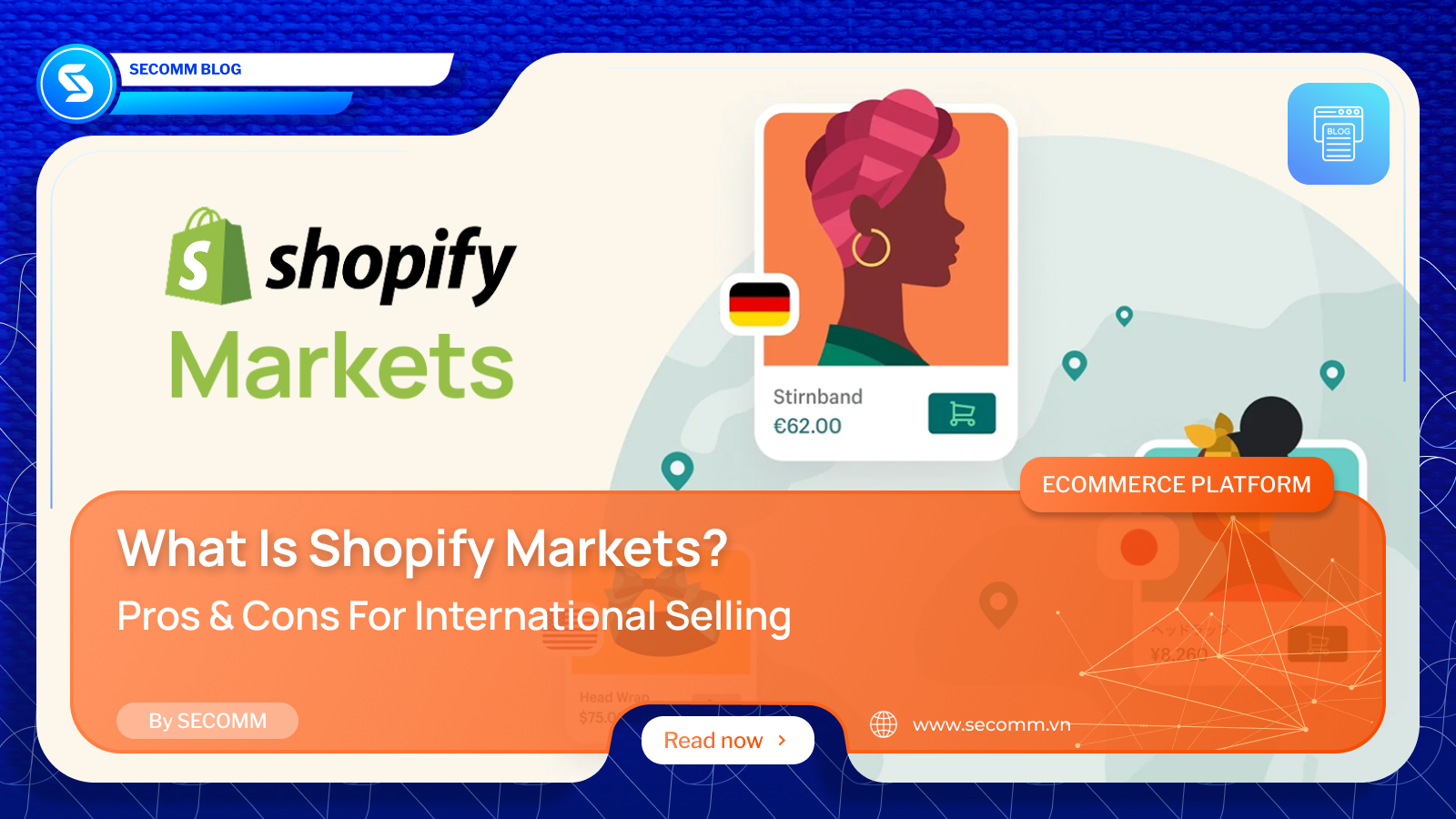
In the digital age, eCommerce is the key to helping businesses quickly and effectively reach global customers. Shopify, a renowned SaaS platform supporting online business, has launched the Shopify Markets solution to assist businesses in expanding into global markets. So, what is Shopify Markets? What benefits and challenges does this solution bring to your business when implementing international eCommerce? Let’s explore in the article below.
Shopify Markets is a new solution from the Shopify platform, designed to help you easily and efficiently expand your business into global markets. This tool allows you to manage multiple stores from a single dashboard, customizing each market with specific settings for language, currency, taxes, and payment methods. Moreover, Shopify Markets integrates with international shipping and logistics services, enabling you to optimize your operations and meet the demands of global customers.
Previously, multi-store setups have been done by using Shopify Plus, allowing merchants to establish and operate separate Shopify stores for each target market. This approach gave merchants full control over individual stores, such as running market-specific marketing campaigns, promotions, and inventory management.
However, this approach had several drawbacks. First, operating multiple standalone stores meant discrepancies in inventory levels, requiring data synchronization between stores. This process was time-consuming and prone to errors. Many merchants addressed this issue by integrating systems like PIM or ERP. Second, the workload increased due to the need to update content for each store individually. Third, many merchants complained about having to pay for the same app or integration across multiple stores, leading to inefficiencies in financial management.
Thus, the advent of Shopify Markets serves as a remedy for these three issues. Now, you can apply multi-language, multi-currency, international pricing, domain or subdirectory, and Geolocation features for the stores, all managed efficiently from a single dashboard.
When deploying international eCommerce, the importance of multi-language support cannot be overstated. According to CSA Research, 76% of online shoppers prefer to purchase products with information displayed in their native language. Meanwhile, 40% will never buy from eCommerce websites in a different language.
By using Shopify Markets and the built-ịn Translate & Adapt app, your website can be automatically translated into the languages of your target markets. Beyond mere translation, Shopify’s Translate & Adapt app can customize store content to better connect with local customers. This ensures that your eCommerce website maintains cultural, regional, and seasonal relevance—even when markets share the same language—the app can adjust for variations in vocabulary, spelling, and messaging.
Global customers want to see product prices in their own currency when shopping on eCommerce websites. A PayPal report supports this, showing that 76% of survey participants prefer to pay in their local currency. Shopify Markets can automatically convert product prices into over 130 different currencies to cater to your target customers. From product pages to shopping carts, and from checkout to refunds, Shopify Markets can create a seamless multi-currency shopping experience for customers, which will boost conversion rates and sales.
Shopify Markets can help create localized domains linked to specific languages and countries. For example, “myshop.com” could be the main site operating in the US, “myshop.ca” for the Canadian market, and “myshop.co.uk” for the UK. This not only increases credibility and optimizes SEO but also enhances brand recognition in each market.
Shopify Markets allows the setup of subdirectories for each language or region under the same main domain, such as “myshop.com/en” for English, “myshop.com/fr” for French, and “myshop.com/de” for German. Using subdirectories helps easily manage local versions of the store, improve user experience, and optimize costs related to maintaining multiple domains.
Payment methods significantly influence purchasing decisions. According to a Worldpay report, 27% of users will abandon the checkout process if they cannot find their preferred payment method.
With Shopify Markets, you can offer your customers a variety of local payment options, alongside familiar choices like credit/debit cards, PayPal, Apple Pay, and Google Pay. Some examples of local payment method integrations include:
When selling in international markets, pricing can be affected by duties and import tax. In many cases, unexpected costs for customers can lead to a negative shopping experience.
The Shopify Markets solution can help address this issue. This tool can calculate taxes based on the shipping address and the legal regulations of each country, including value-added tax (VAT), sales tax, and other import duties. When customers proceed to checkout, the system clearly displays these taxes, helping them understand the total shopping cost and avoid unpleasant surprises.
Shopify Markets also collects and remits these taxes to the appropriate tax authorities, saving your time and effort in handling tax procedures. This feature also integrates with shipping services to ensure all tax-related costs are accurately reflected, allowing you to plan expenses more effectively. Therefore, you can comply with legal regulations, enhance the customer shopping experience, and optimize your operations.
Shopify Markets is included in all Shopify plans, but the features available to merchants vary by plan. Here are the core features that all Shopify merchants can use when embracing Shopify Markets:
For the higher-tier plans, Advanced and Plus, merchants can access exclusive features. This is particularly beneficial for larger enterprises looking to establish and maintain a strong, competitive presence in international markets:
Shopify Markets Pro is the upgraded version of Shopify Markets, designed to offer more advanced features. This solution aims to support large-scale merchants in efficiently and flexibly managing complex international operations. The “Pro” version helps sell in over 150 different markets, providing powerful tools to optimize operations, manage taxes and costs, and enhance the international customer experience.
Some special features exclusive to the Pro version include:
Final Words
Shopify Markets is truly a robust solution for going globally and manage target stores efficiently and flexibly. However, alongside its strengths, this solution also has several notable limitations.
Depending on the scale, number of target stores, and the need to create a customized shopping experience, you can weigh the standard version against the Pro version. Nevertheless, you must carefully consider cost factors and management capabilities to ensure these solutions align with your strategies.
Need more advice? Contact SECOMM today!
 30
30
 2,652
2,652
 0
0
 2
2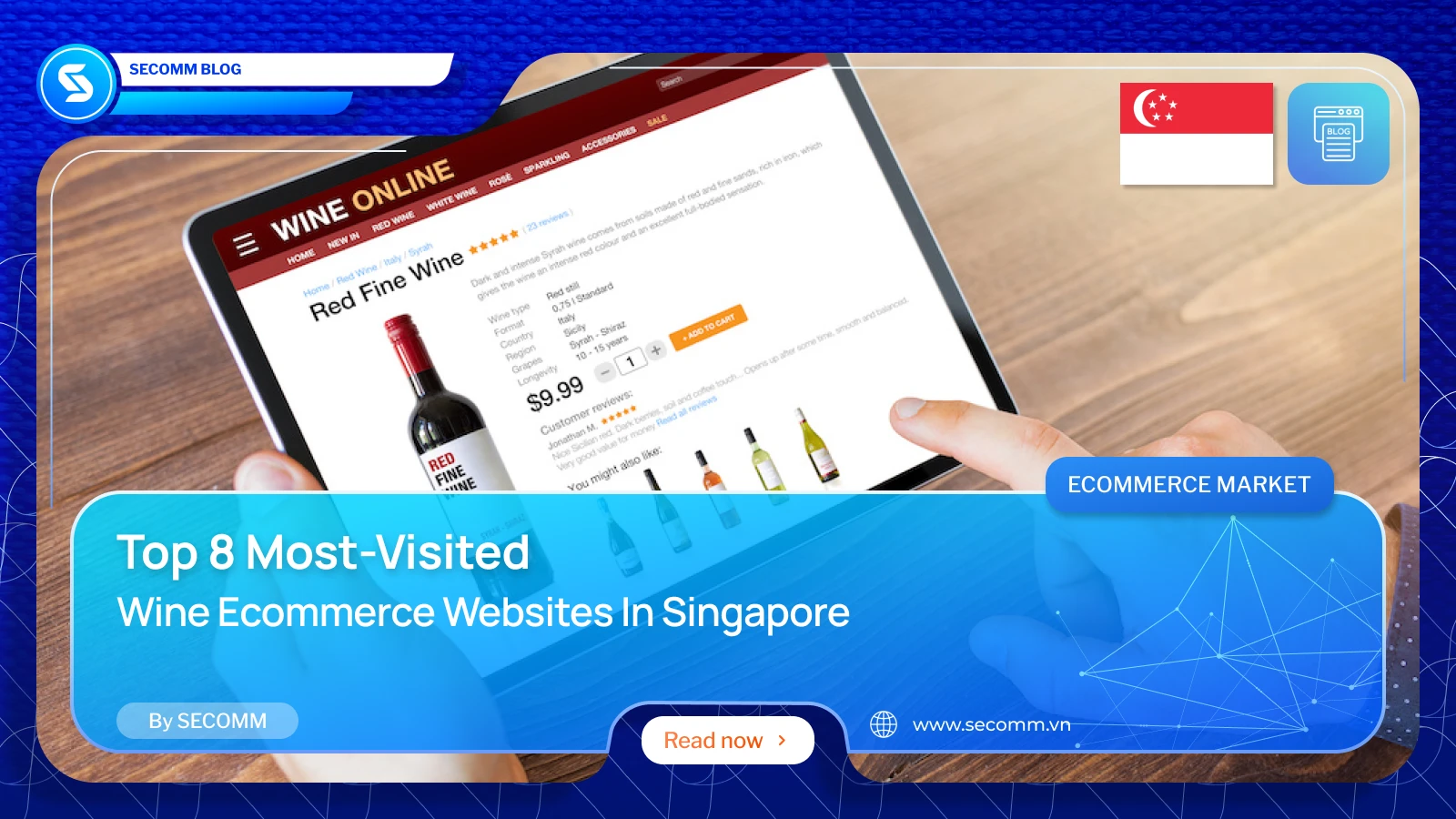
The wine eCommerce industry in Singapore is thriving, offering a wide variety of choices for consumers who appreciate fine wines and spirits from around the world. With the convenience and diversity of eCommerce websites, purchasing wine online has become easier than ever.
The following article introduces 8 leading wine eCommerce websites in Singapore, known as popular shopping destinations for modern consumers.
Paneco is one of the most beloved wine eCommerce sites in Singapore, renowned for its product quality, delivery service, and customer care. Established with the aim of providing a convenient and reliable online shopping experience, Paneco offers a rich catalog ranging from wines and spirits to specialty beers and sake.
Focusing on customer experience, Paneco chose the Spree Open Source platform to build its eCommerce website, allowing for customization and scalability. Features such as inventory display, product variations, combo purchases, and bulk buying have been optimized for customization. Paneco also implemented a loyalty program, enabling customers to register as members, earn points from purchases, and enjoy exclusive prices.
Cellarbration is an ideal destination in Singapore for wine and alcohol enthusiasts. This brand boasts an extensive collection of wines and alcoholic beverages from a wide variety of leading global brands.
Shopping on Cellarbration’s eCommerce website is highly optimized through the power of the Magento platform. Every aspect, from search functions and product browsing to checkout, is deeply customized to ensure an engaging shopping experience for customers.
Cellarbration is distinguished not only by its wide range of products but also by its professional and dedicated customer service. The brand is committed to customer satisfaction by offering personalized support and a variety of payment and delivery options.
The Liquor Shop is one of the prominent brands in the wine ommerce sector in Singapore, known for its richness and variety of high-quality imported liquors. With a mission to bring customers the finest liquor products from around the world, The Liquor Shop offers a range of options, from wines, whiskies, rums, and tequilas to unique beers and sojus.
This retailer’s liquor website is built on the infrastructure of Shopify Plus, allowing for easy customization of many features such as age verification, quick purchase, product search suggestions, and upselling prompts. Additionally, Shopify Plus’ flexible system enables integration with a range of popular payment methods such as Apple Pay, Google Pay, PayPal, Visa/MasterCard.
In Singapore, the Wine Connection brand is a favorite destination for wine enthusiasts looking to explore premium wines from the most famous wine regions worldwide. Wine Connection also offers customers a rich and diverse collection of wines.
Wine Connection’s Magento website is optimized for an enhanced experience, allowing customers to search for wines by origin, grape variety, and explore special collections, as well as choose preferred payment and delivery methods.
Not only does Wine Connection provide a modern and engaging online shopping space, but it also serves as a source of wine knowledge. Customers can find articles and detailed guides on selecting and enjoying wines to better understand the art and science behind the exquisite flavors.
Founded in 1983, Millesima is a reputable brand in the global retail wine industry, particularly renowned for its specialization in premium wines. Originating from France, Millesima has expanded its operations to many countries, including Singapore, to provide consumers with the opportunity to experience high-quality wines from renowned vineyards worldwide.
Millesima’s strength lies in its meticulous selection of wine products, ensuring high quality and clear origins. The product portfolio of Millesima includes wines from Bordeaux, Burgundy, Champagne, and many other famous wine-producing regions. Customers can find classic wines, limited editions, and even internationally award-winning bottles.
Millesima’s eCommerce wine website is elegantly designed and user-friendly, making it easy for buyers to search for detailed information about products and place orders online. Additionally, Millesima offers professional advisory services to help customers select wines that suit their preferences and needs.
Wine Fridge Singapore is a prominent brand in providing wine cabinets and related products for wine storage in Singapore. Known for professionalism and high quality, Wine Fridge Singapore specializes in offering wine cabinets from renowned brands, ensuring the ideal conditions for wine storage.
The strength of Wine Fridge Singapore lies not only in providing quality products but also in professional customer advisory and support services. They understand the needs of wine enthusiasts and collectors, providing suitable storage solutions to maintain the flavor and quality of wine over time.
The website of Wine Fridge Singapore provides detailed information about various wine cabinets, from small-capacity cabinets for personal needs to large cabinets for extensive wine collections. Some customized features include product comparisons, selecting products by size and color, quick payments with Shop Pay or Google Pay, etc.
The Wine Wholesales brand is known as a destination for purchasing high-quality wines, wine cabinets, and related accessories at attractive wholesale prices. This brand has built its reputation through product diversity and quality services, aiming to provide customers with smooth and convenient online wine shopping experiences.
The eCommerce website of Wine Wholesales is user-friendly, making it easy to search for and select products. Customers can easily find detailed information about each wine, including origin, flavor profile, and reviews from previous buyers. Additionally, Wine Wholesales regularly offers promotions and discounts, allowing consumers to purchase quality products at affordable prices.
This is a prominent name in the retail wine sector in Singapore, specializing in providing premium wines from around the world. Wines Online’s strength lies in its product diversity, ranging from wines and spirits to soju and sake, especially low-alcohol or non-alcoholic beverages.
Wines Online’s eCommerce website is built on Shopify, featuring an intuitive interface that allows customers to easily search for and select products. Wines Online Singapore is also known for its fast and reliable delivery service. They ensure that products are delivered to customers safely and on time. Additionally, Wines Online’s advisory team is always available to assist customers with any inquiries or requests, ensuring that every customer has the best shopping experience.
Wrap Up!
Here are the 8 most prominent eCommerce wine websites in Singapore. Each brand brings its own unique advantages, from product diversity and service quality to convenient shopping experiences.
Looking for advice on building an eCommerce wine website? Contact SECOMM now!
 2
2
 2,452
2,452
 0
0
 1
1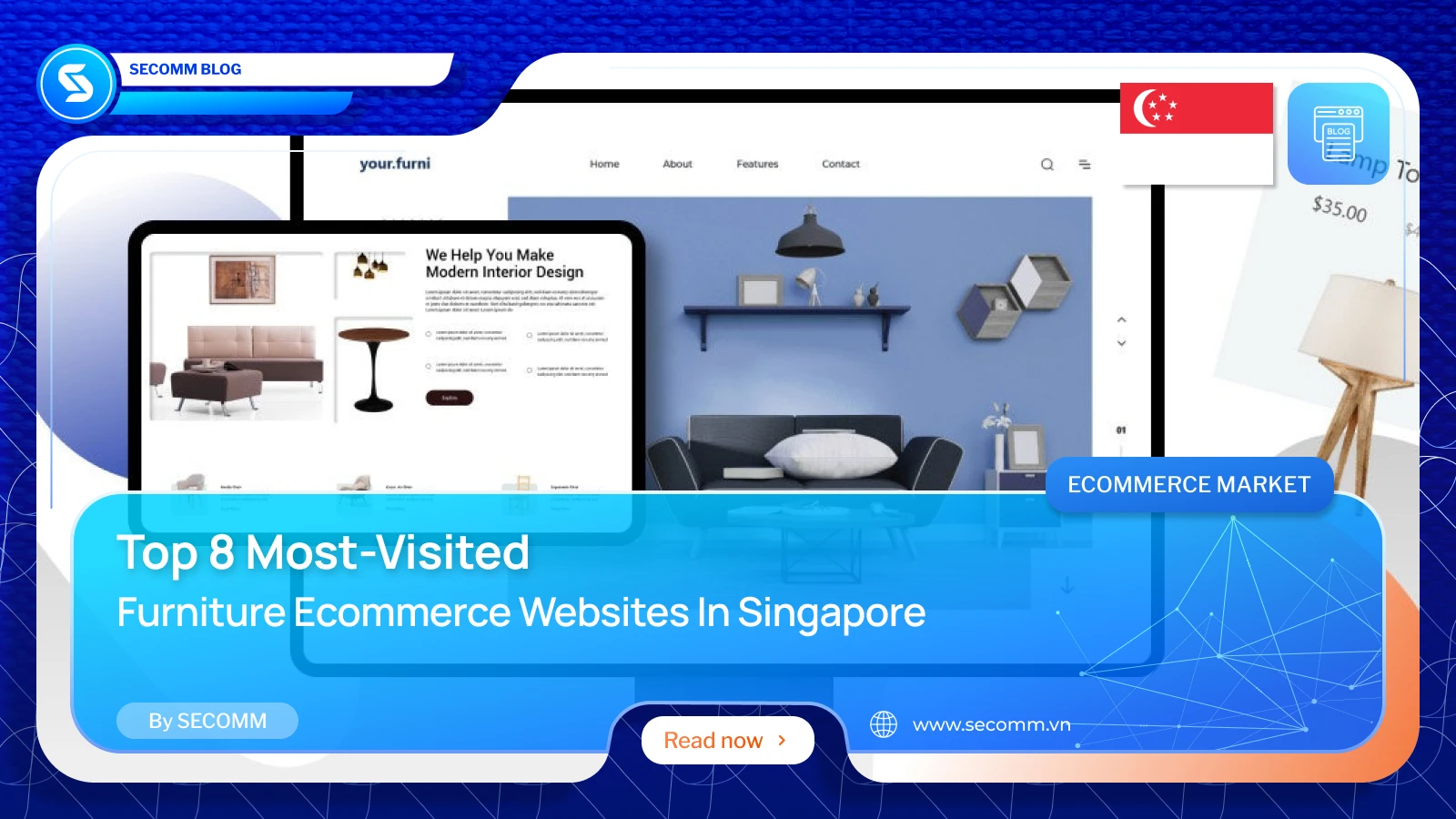
Shopping for furniture through eCommerce platforms has become a defining trend in modern living, particularly in developed nations like Singapore. Online furniture shopping offers not just convenience but also gives consumers to a diverse range of styles and price points.
The following article introduces the top 10 furniture eCommerce websites in Singapore, where you can find inspiration to develop your own similar website.

FortyTwo is a furniture and home goods brand, established in 2007 in Singapore. FortyTwo offers a wide range of products from bedroom furniture, living room sets, kitchenware to home accessories and interior decor. Renowned for providing quality products at competitive prices, along with fast delivery and attentive customer service, the brand frequently updates and expands its product portfolio to meet diverse customer needs.
FortyTwo’s website is built on the Magento Open Source platform (Adobe Commerce free version). With this eCommerce website, users can easily search and filter products, explore a variety of product categories from furniture to home goods. Additionally, the website offers the capability to integrate enticing promotional tools and customer support, accompanied by fast and secure delivery services.
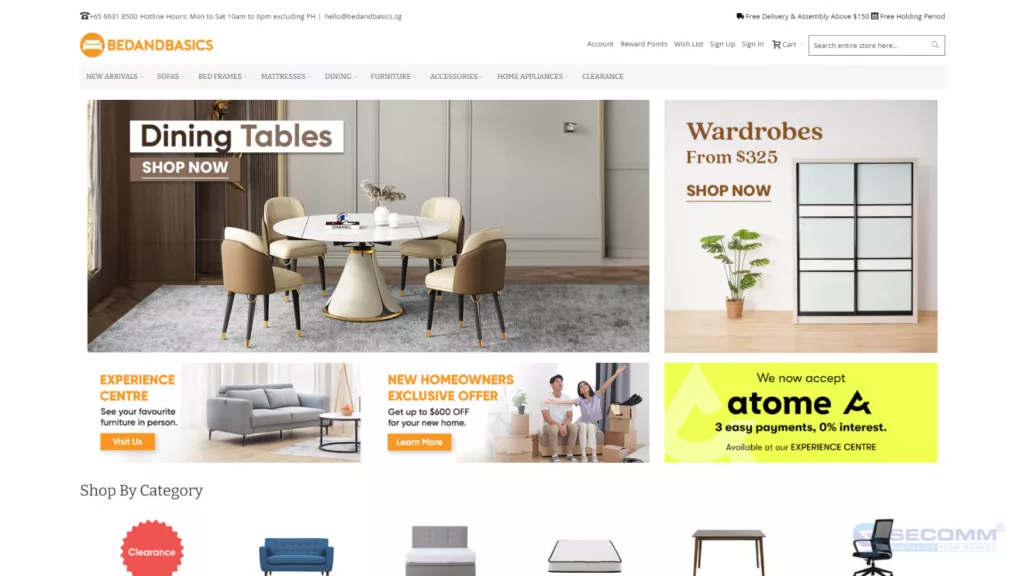
BEDANDBASICS is a leading eCommerce website in Singapore, specializing in providing quality furniture at affordable prices. The BEDANDBASICS website is built on the Magento platform, one of the most popular eCommerce platforms today. This not only enables the website to have high scalability and customization but also ensures stable operational performance and security for online transactions.
Using Magento, this brand can optimize product management, orders, and inventory, while also providing a more engaging shopping experience. The inventory management system automatically updates product quantities in real-time, ensuring that customers are always aware of the stock status of the products. Additionally, the website supports various payment methods, including the buy now, pay later option with Atome.

HipVan is an online retail eCommerce website for furniture and home decor based in Singapore. Established in 2013, the brand aims to provide customers with high-quality furniture products at affordable prices, along with convenient shopping experiences and attentive customer service.
HipVan’s furniture eCommerce website is built using the Ruby on Rails and React frameworks, with Ruby as the primary programming language. Prominent features of HipVan include building a community for sharing interior design ideas, image-based product search, and allowing customers to upload images of desired products. Particularly, the augmented reality (AR) feature enables customers to view products in their real-life space before purchasing. Moreover, HipVan offers free interior design planning services, helping customers conveniently ideate and plan their living spaces.
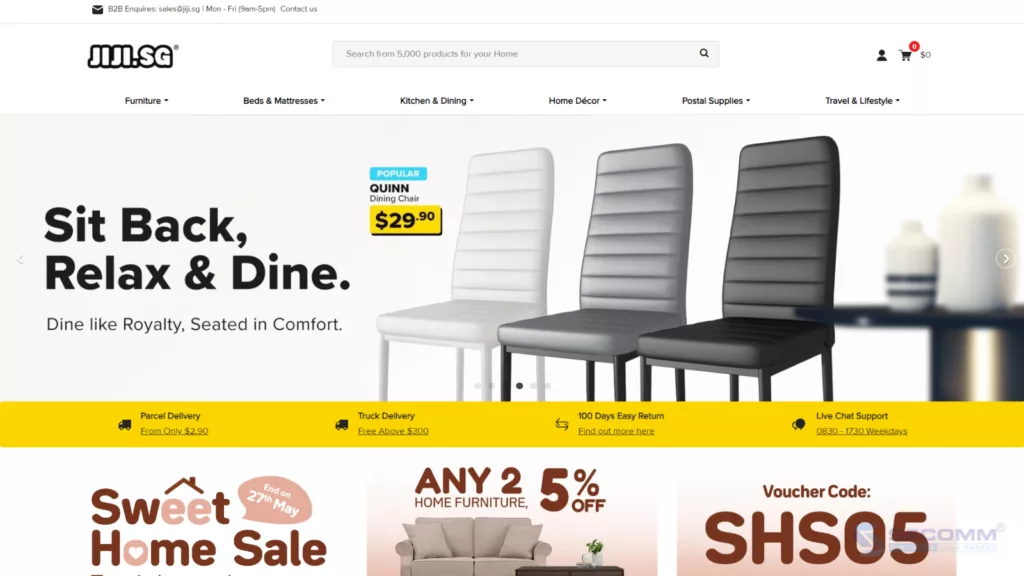
JiJi.SG is one of the favored online shopping destinations for furniture items in Singapore. Here, customers can easily find a diverse range of high-quality products from chairs, beds, sofas to household items such as shelves, cabinets, and towels.
Built on the PrestaShop platform, JiJi.SG’s eCommerce website boasts high flexibility, making it easy to customize and expand to accommodate increasing traffic. The website allows searching and filtering products by size, color, and design, helping customers easily find items that meet their needs. JiJi.SG provides customer support services via live chat, offering a convenient and quick online shopping experience. Additionally, JiJi.SG offers a variety of payment methods, including the PayNow eWallet – one of the popular payment methods in Singapore, providing convenience and peace of mind for customers during transactions.
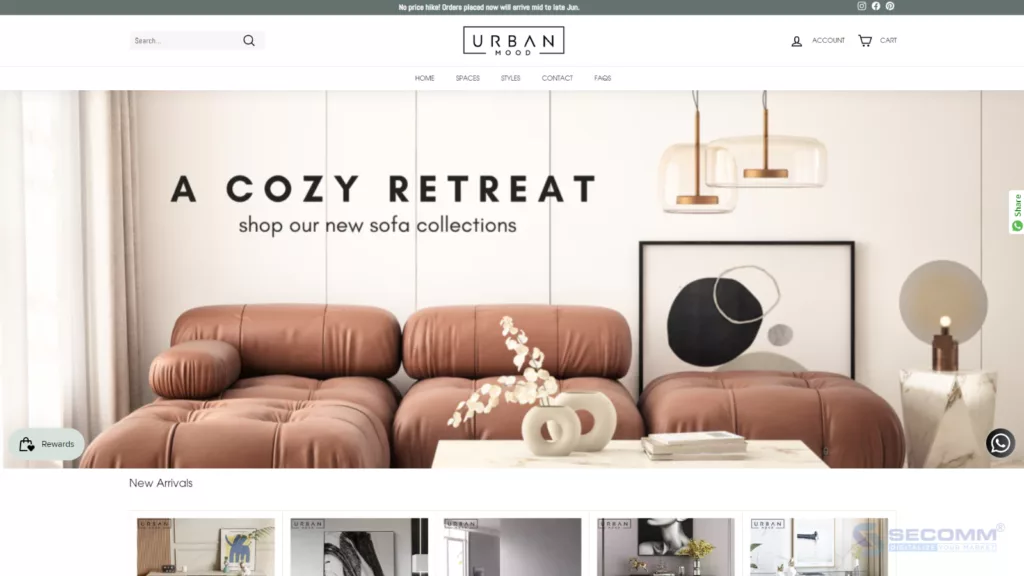
Urban Mood is renowned throughout Singapore and several countries in the Asian region for its finely crafted, high-quality, and contemporary furniture products. Urban Mood’s range extends from living rooms to dining rooms, from bedrooms to kitchens. All are meticulously curated to bring freshness and uniqueness to customers’ living spaces.
Urban Mood has chosen Shopify to build a customized eCommerce website aimed at selling in foreign markets and reaching a broader base of potential customers. Accordingly, Urban Mood has integrated international shipping features and customized currency display to cater to different market needs. Additionally, the brand has integrated ShopBack, allowing customers to experience cashback shopping directly on Urban Mood’s eCommerce website.
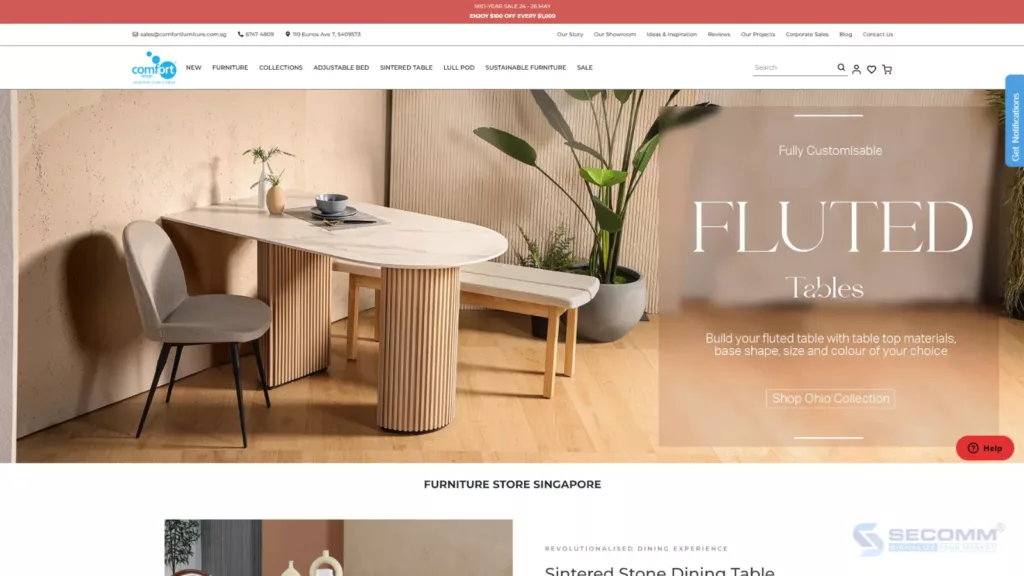
Comfort Furniture is known as one of the leading furniture retail brands in Singapore. With over 20 years of presence in the market, this powerhouse has brought a wide range of quality, aesthetically pleasing products to Singaporean consumers, catering to various styles. Comfort Furniture not only emphasizes product quality but also places special emphasis on customer service. They are committed to providing fast delivery and attentive after-sales support, ensuring that customers’ shopping experiences are always excellent.
Comfort Furniture’s eCommerce website is custom-built to provide an optimal shopping experience. Customers can not only check the inventory of any product but also choose the color and size. Comfort Furniture offers a large color code list and has an experienced team available to advise customers on selecting products and coordinating suitable colors for each space.
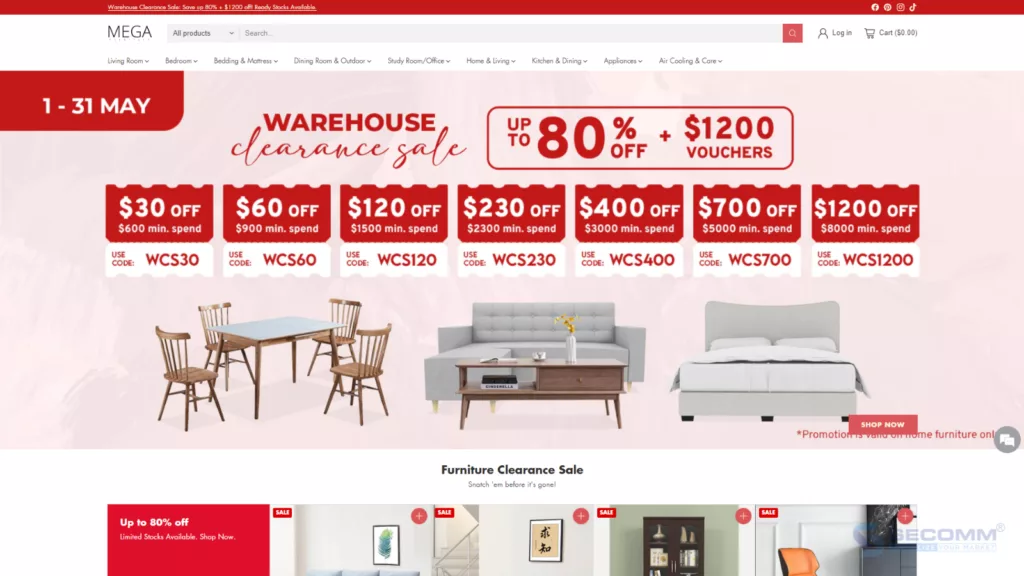
Megafurniture is a leading furniture retail giant in the Singapore market. With a commitment to providing luxurious and convenient living spaces for customers, Megafurniture has become the perfect choice for those seeking creative ideas to design their own unique living spaces.
Megafurniture’s furniture eCommerce website is beautifully designed and optimized on the Shopify Plus platform, with clearly organized categories to help customers easily search, select, and purchase products. Especially, the website also provides detailed information about each product, including images, descriptions, and specifications, helping customers make purchasing decisions more effectively.
Megafurniture allows customers to pay upfront and pay later through flexible payment methods such as Grab and Atome, creating convenient conditions for customers in managing finances and choosing suitable payment methods.
To encourage repeat shopping activities, Megafurniture integrates ShopBack into the Shopify Plus eCommerce system to implement a cashback shopping program. This helps customers receive a portion of cash back after each purchase, increasing the competitiveness and attractiveness of shopping at Megafurniture.

Beloved across Singapore in recent years, Originals offers consumers high-end and unique furniture products. Items at Originals are impeccably designed, blending modernity with minimalist style. From sofas, dining tables, beds to decorative items, each product is designed to bring comfort and style to living spaces.
Originals leverages Shopify Plus to build an eCommerce website that focuses on user experience and interactivity. The interface is intuitively designed and minimalist, easy to navigate, allowing customers to easily search for products, make purchases, and complete transactions.
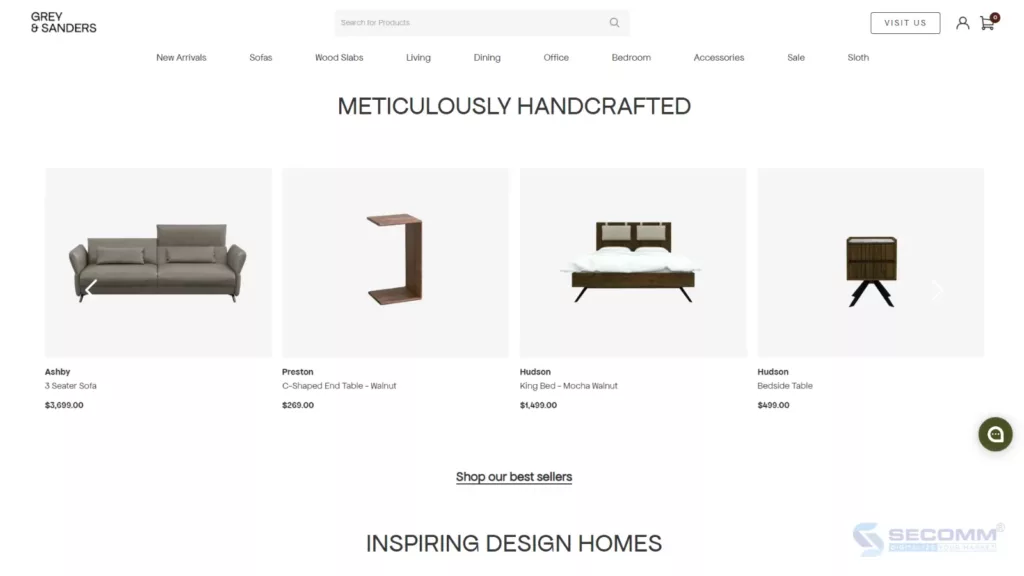
Grey & Sanders, a renowned furniture brand from Singapore, is known for its exquisite craftsmanship and superior quality products. Specializing in furniture made from natural wood and premium leather, from dining tables, sofas, beds to decorative accessories, all are designed to bring natural beauty and luxury to living spaces.
Grey & Sanders utilizes the Magento platform to build its eCommerce website and leverages the flexibility of this platform to handle large transaction volumes and high traffic. The interface is designed to be bright, friendly, and easy to navigate, helping users easily search for and select products. Moreover, the website integrates a geolocation feature to help customers easily locate Grey & Sanders stores on an intuitive map.
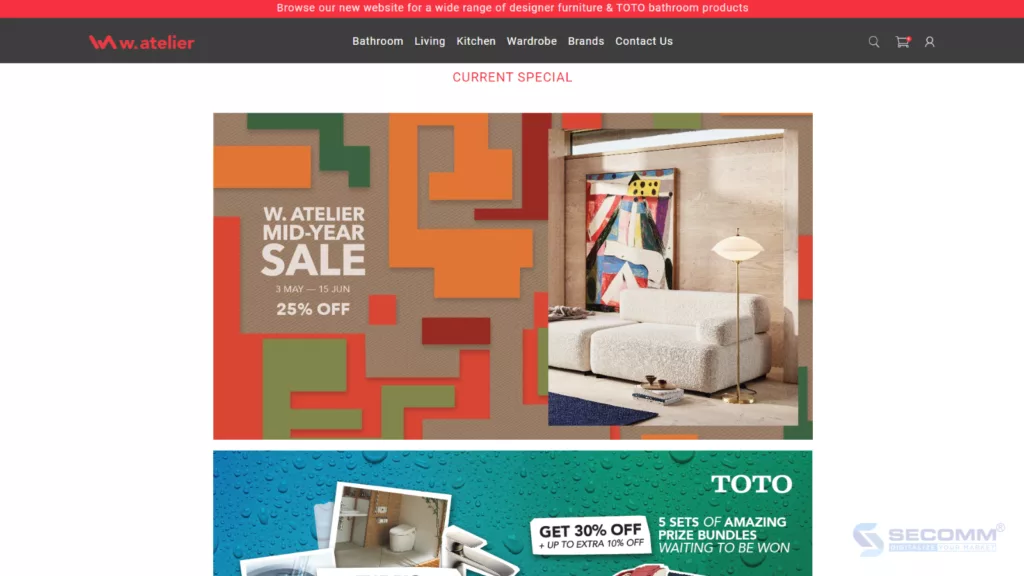
W.Atelier is a leading furniture retailer in Singapore, specializing in providing premium and unique products from some of the world’s most prominent brands such as Cassina, Binova, Fritz Hansen, and Geberit. Customers can find modern, sophisticated, and stylish furniture suitable for various spaces, from small apartments to luxurious villas.
The W.Atelier eCommerce website is built on the Shopcada platform, focusing on designing an easy and convenient online shopping experience, with clear product categories and detailed information. Additionally, W.Atelier is renowned for its professional customer service and thoughtful after-sales policies, ensuring that every shopping experience is smooth and satisfactory. With a commitment to quality and style, W.Atelier has become one of the leading furniture brands in Singapore, the ideal choice for those seeking perfection and sophistication in every detail of their living spaces.
Final Words
Here are 10 eCommerce furniture websites from major brands in Singapore. These websites have been the go-to online shopping destinations for consumers here for many years whenever they need inspiration to decorate their living spaces. By applying modern technologies and smart business strategies, these giants have provided customers with the most authentic furniture shopping experience in the online environment.
Need advice for building eCommerce furniture website? Contact SECOMM today!
 2
2
 2,798
2,798
 0
0
 1
1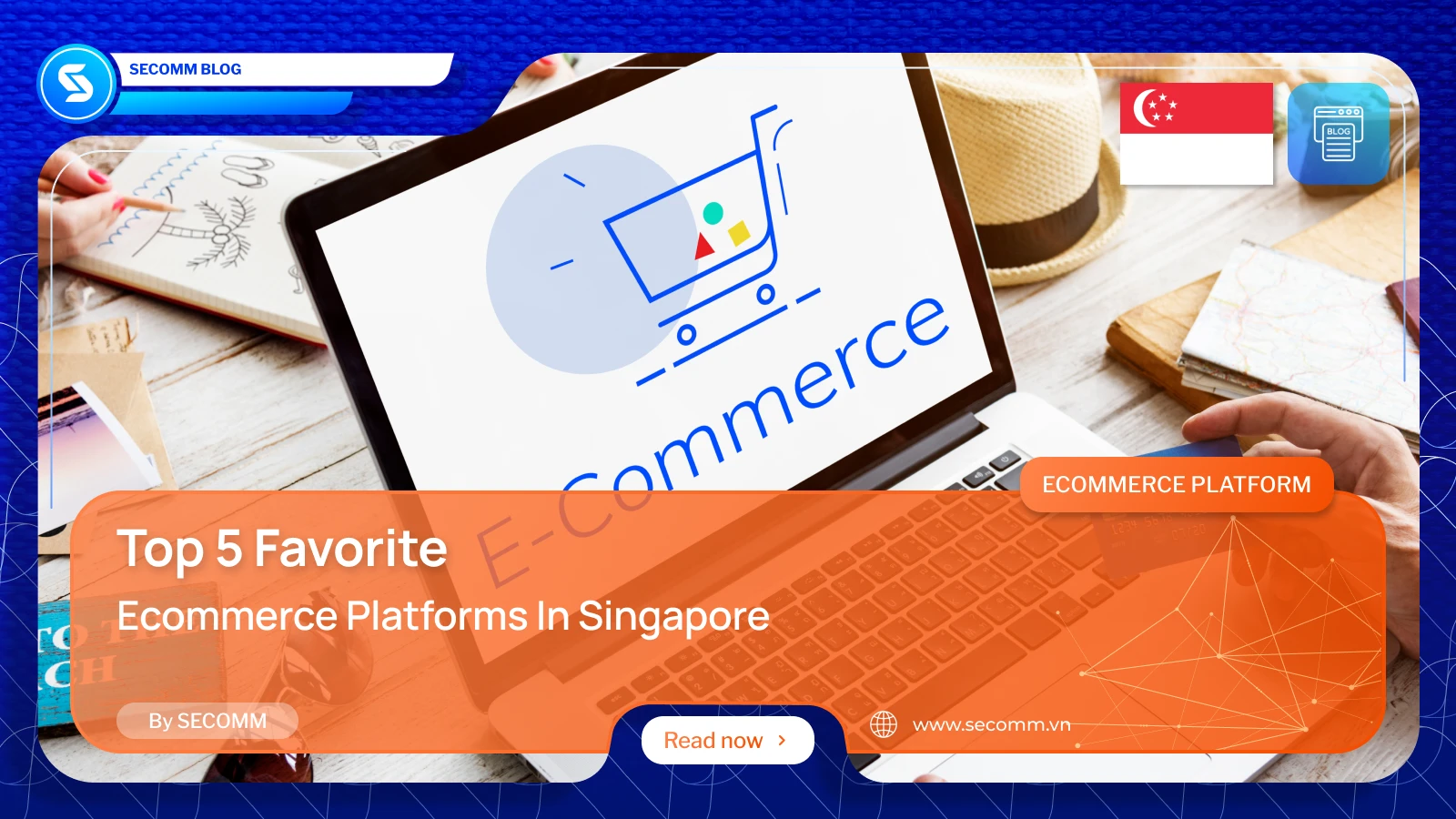
eCommerce in Singapore is continuously evolving with the emergence of new technological solutions. As a result, the options for eCommerce platforms are becoming increasingly abundant and diverse. This presents both opportunities and challenges for every merchant, as selecting the right platform to build an eCommerce website is a crucial first step.
Here are the five most commonly used eCommerce platforms in the Lion City.

Shopify is a popular SaaS eCommerce platform with over 4.8 million active websites. In Australia alone, over 8 thousands live stores are operating on the Shopify platform.
Recently, the premium version of Shopify, ‘Plus,’ has garnered attention from businesses across various sectors in Singapore. These merchants may have previously deployed different eCommerce platforms and later switched to Shopify Plus to seek a superior solution. Some merchants initially launched websites with standard Shopify packages and later upgraded to ‘Plus’ to optimize their operations.
Key features:
Pros:
Cons:
Shopify Pricing
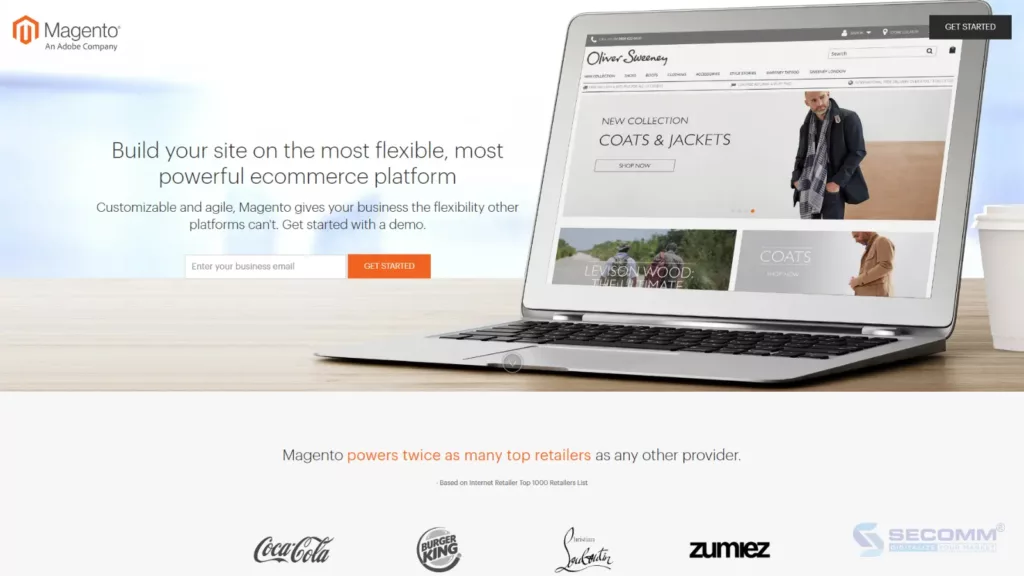
Magento is a globally popular open-source platform, and its prevalence extends to Australia as well. According to BuiltWith, there are currently about 661 e-commerce websites operating on the Magento platform in the Lion Island.
With its high flexibility, merchants can effortlessly tailor features and scale the system according to their unique business requirements.
Presently, Magento provides two versions: Open Source (Free) and Adobe Commerce (Paid).
Key features:
Pros:
Cons:
Pricing:
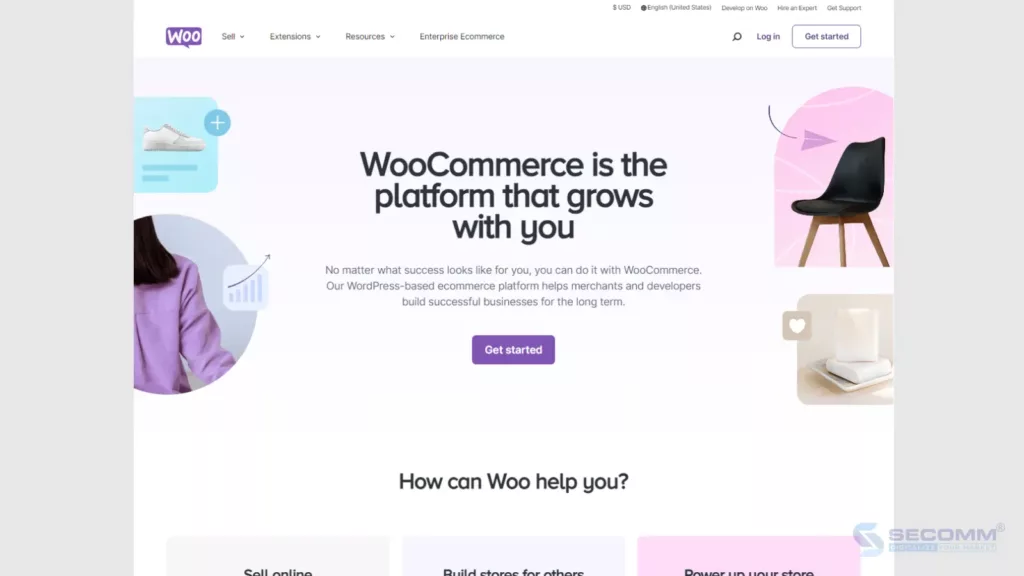
WooCommerce, a free and open-source WordPress plugin, enables brands to integrate eCommerce functionality into their existing WordPress websites. With just a few clicks, the WooCommerce plugin helps convert a standard WordPress site into a fully-featured eCommerce platform, complete with essential features and easy customization. At the time of writing, there are over 13,000 WooCommerce eCommerce websites operating effectively in Singapore.
Key features:
Pros:
Cons:
Pricing: Free to use. However, some integrations with other plugins may incur charges.
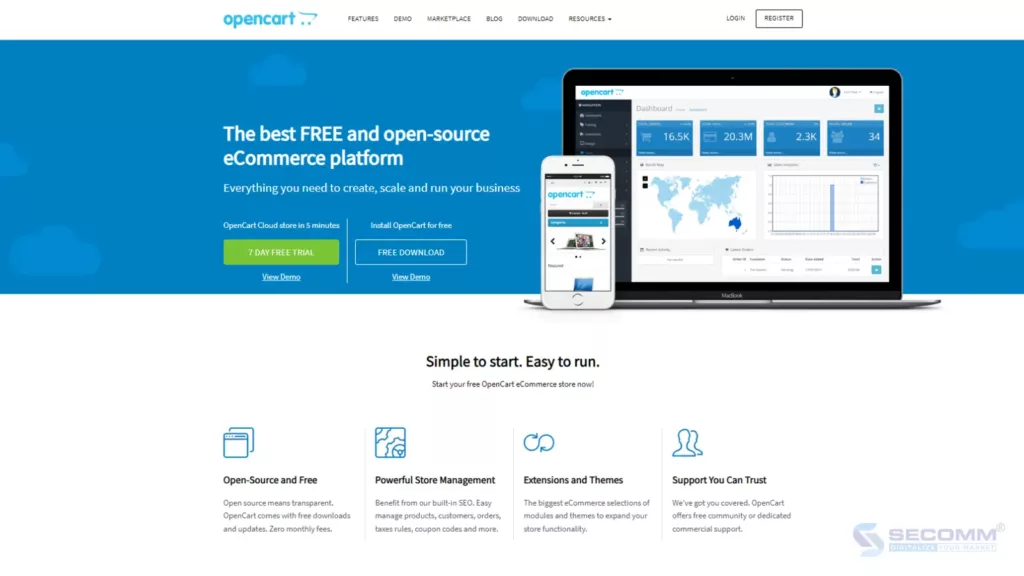
OpenCart is a globally popular open-source eCommerce platform, powering over 900 thousand active websites worldwide. In Singapore, it has gained popularity with more than 1,600 live OpenCart sites, establishing itself as a favored open-source platform in the country, following Magento.
Founded by Daniel Kerr in 1998, OpenCart operates as open-source software, utilizing the PHP programming language. It currently offers two versions: Free (Free-to-use version) and Cloud Store (Paid version).
Key features:
Pros:
Cons:
Pricing:
Free for the Free version. For the Cloud Store version, the specific costs are as follows: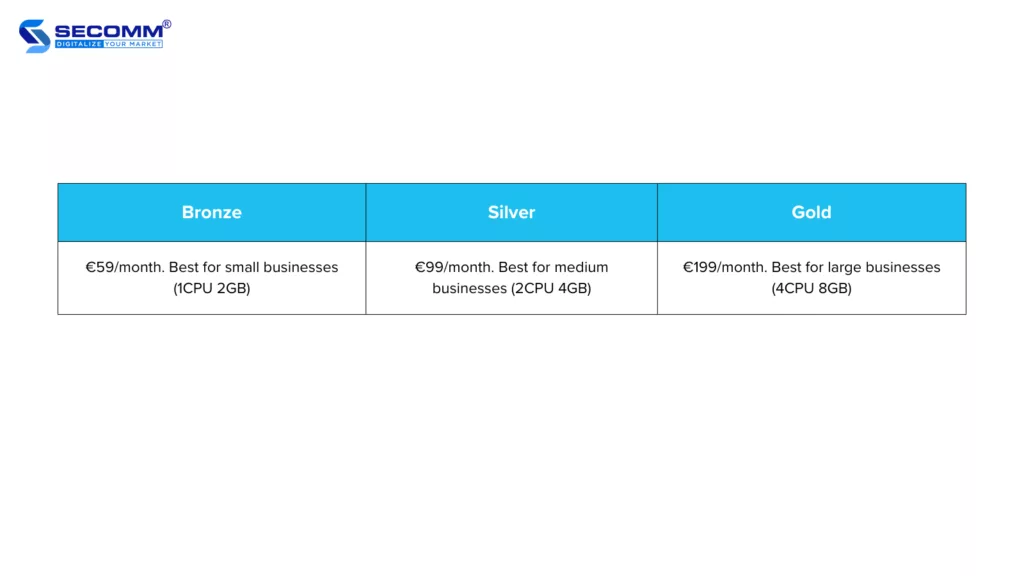
The ‘Cloud Store’ version pricing plan
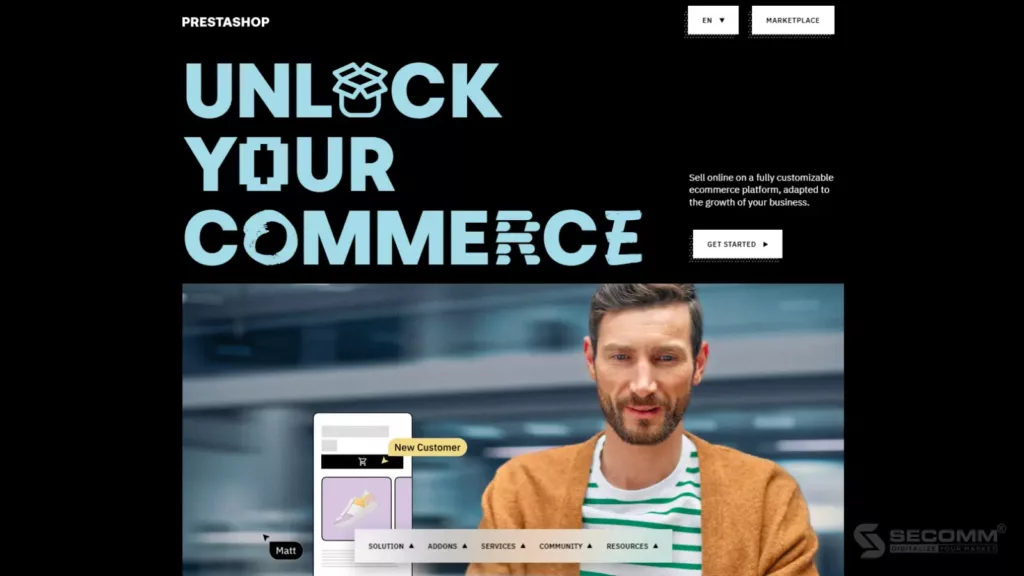
Another open-source platform that is equally popular in Singapore is PrestaShop, with over 270 eCommerce websites currently in operation. The strength of PrestaShop lies in its flexibility and high customization capabilities, allowing users to easily adjust functionalities and interfaces to meet their specific needs. Additionally, with a vibrant developer community and thousands of available modules and themes, PrestaShop not only provides a comprehensive eCommerce solution but also continuous support to ensure that websites run smoothly and efficiently.
Key features:
Pros:
Cons:
Pricing: Free to use, but charges apply for complex requirements
These are the five popular eCommerce platforms in Singapore that many merchants choose to build their eCommerce websites. Depending on specific implementation needs, businesses can consider the most suitable platform.
Need more advice? Contact SECOMM today!
 2
2
 2,216
2,216
 0
0
 1
1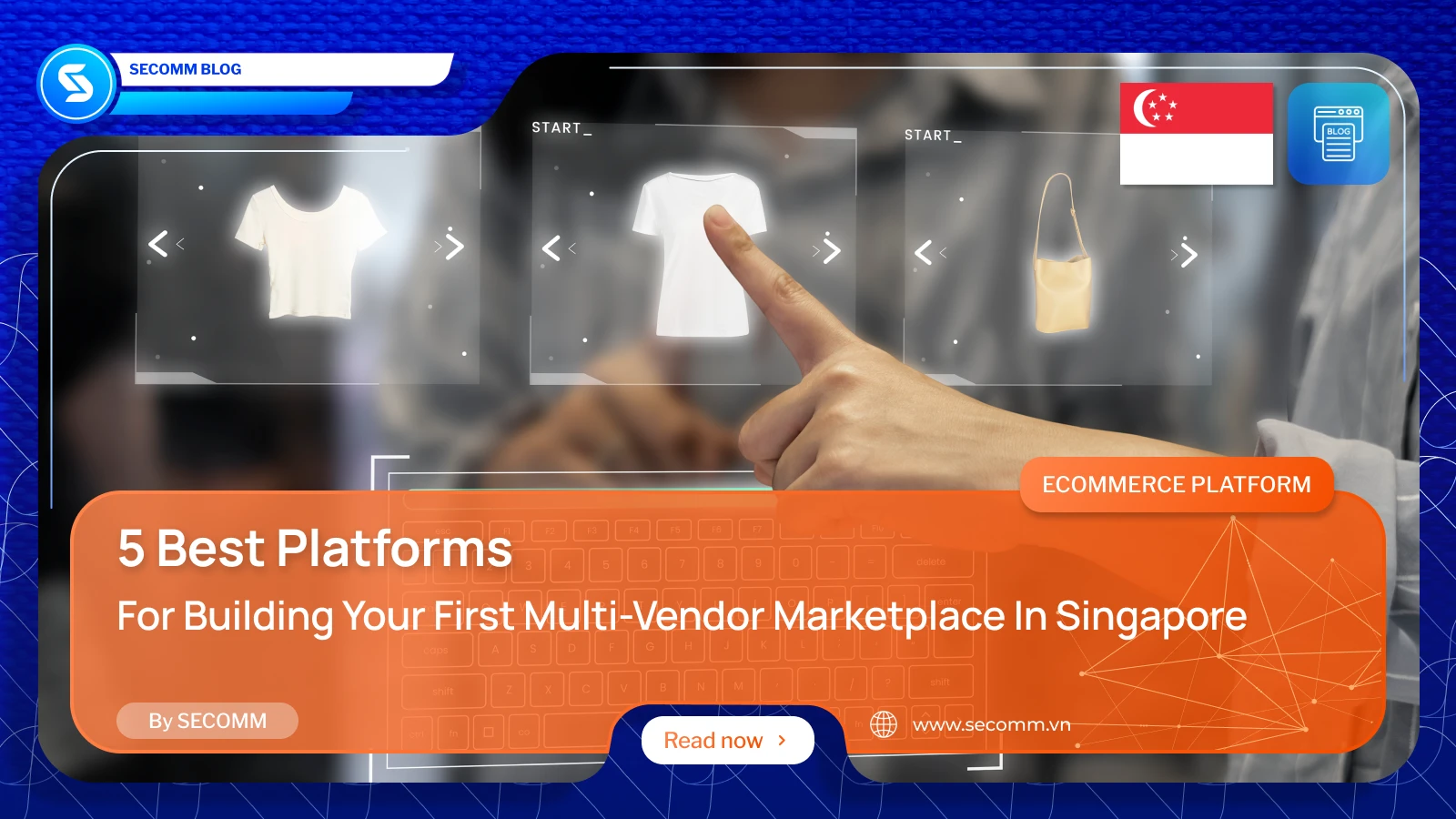
Shopping on multi-vendor marketplaces has become an essential part of modern life, particularly in Singapore, one of the busiest commercial hubs in Asia. As such, building and efficiently managing an eCommerce marketplace is crucial for businesses. However, selecting the right platform can be challenging. This article will introduce the five most reliable platforms that many businesses in Singapore use to build their own.
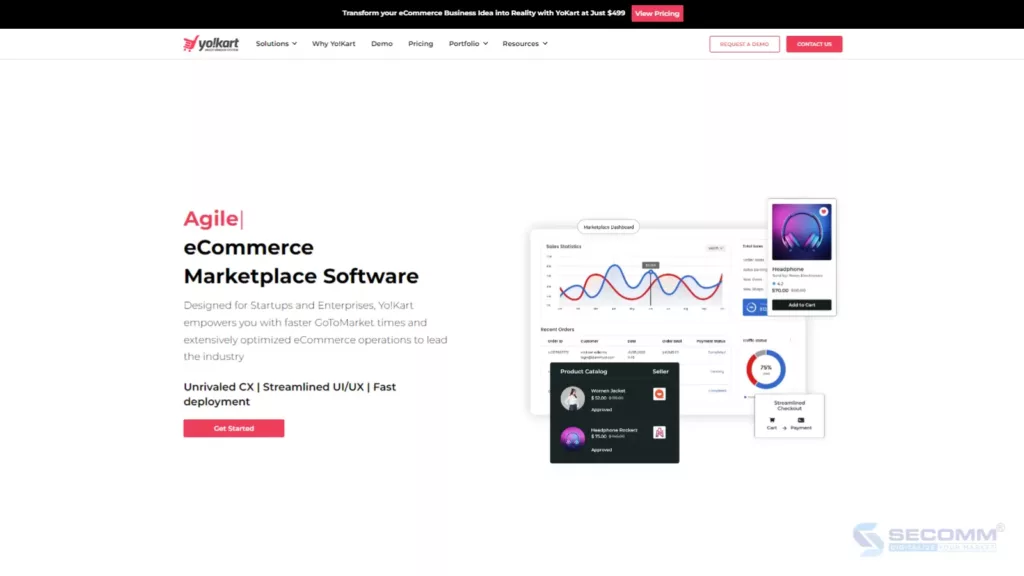
Yo!Kart is a leading self-hosted eCommerce solution that businesses can consider for building a custom multi-vendor marketplace. Designed to be user-friendly, Yo!Kart allows businesses to have full control, customization, and flexible scalability to manage and operate their eCommerce platform more effectively.
Key features:
Pros:
Pros:
Price: Starting from $1099/year. However, costs may vary based on specific requirements.
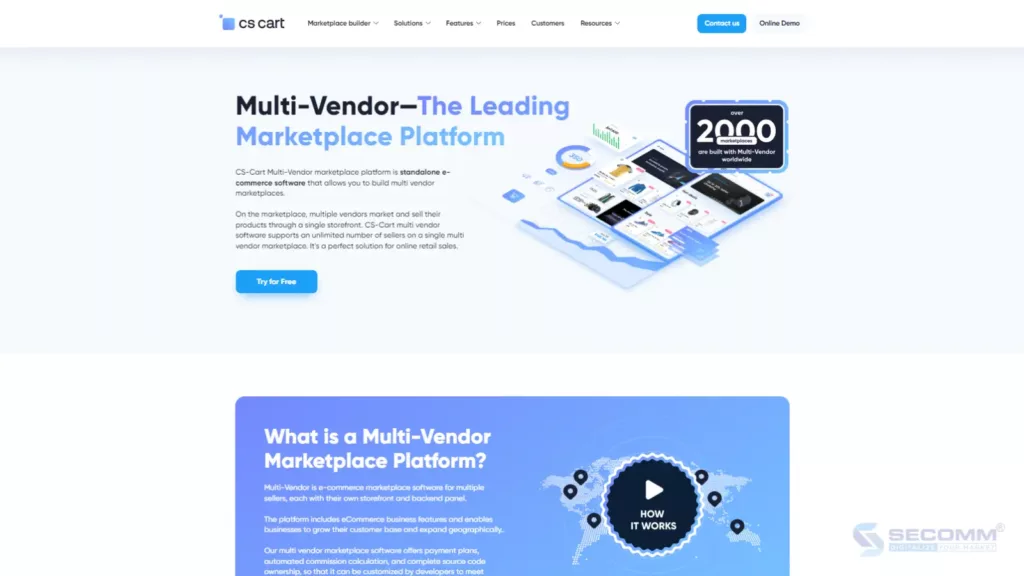
CS-Cart Multi-Vendor is known as a specialized platforms for building multi-vendor marketplaces with robust customization and scalability. With over 26 integrated languages and numerous unique features, this platform is an all-in-one solution suitable for various industries and deployment needsneeds.
Key features:
Pros:
Cons:
Price: Pricing may vary depending on specific needs
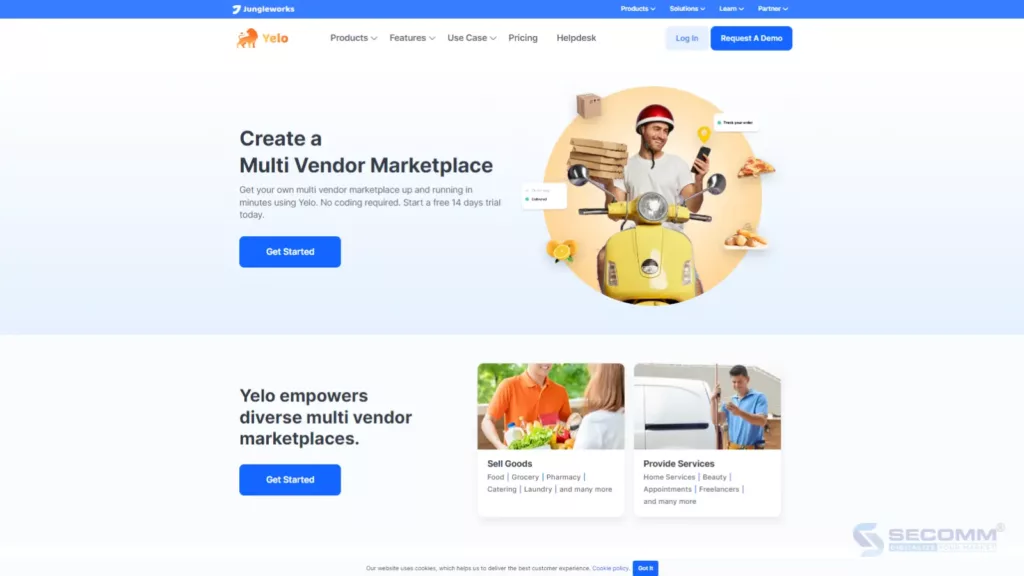
Yelo is flexible multi-vendor marketplace designed to help businesses of all sizes easily create and manage their online store. With Yelo, businesses can quickly build custom eCommerce marketplaces equipped with comprehensive features for administrators, sellers, and buyers.
Key features:
Pros:
Cons:
Giá: Costs start at $12/month
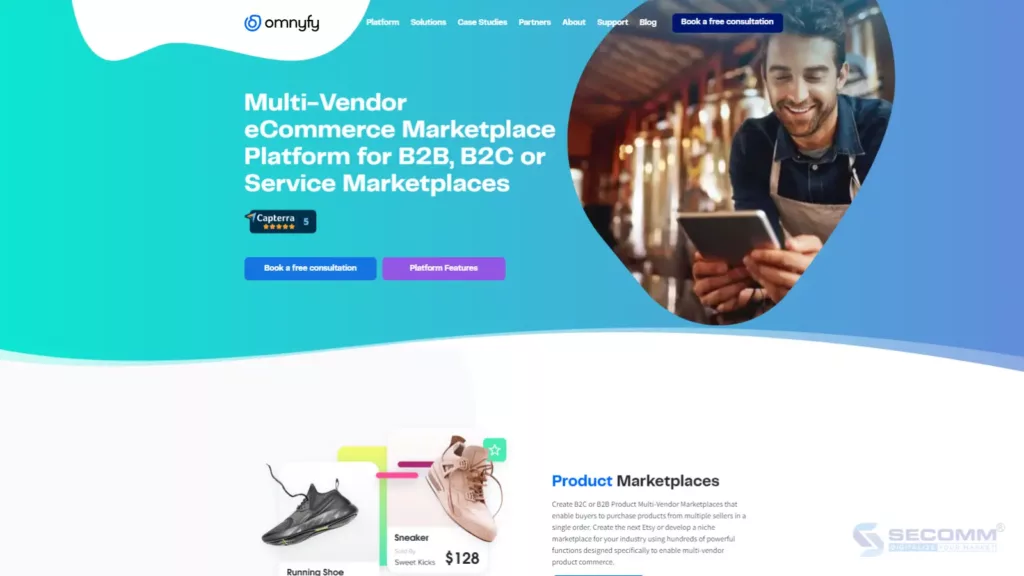
Omnyfy is a powerful multi-vendor marketplace designed to meet the needs of both B2B and B2C businesses. With its multi-channel management support and flexible integrations. Omnyfy enables businesses to create a comprehensive eCommerce ecosystem, from product management to customer service.
Key features:
Pros:
Cons:
Price: Pricing may vary depending on specific needs
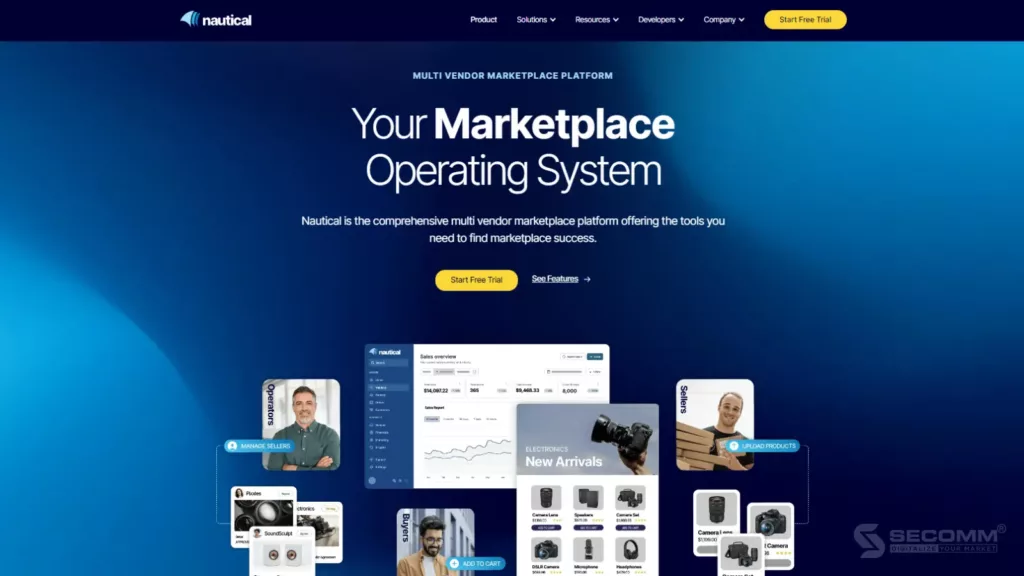
Nautical Commerce is favored by businesses in Singapore for providing a range of comprehensive solutions to make managing and operating multi-vendor marketplaces easier. With Nautical Commerce, businesses can leverage the latest technologies to improve business efficiency and enhance user experience.
Key features:
Pros:
Cons:
Price: Pricing may vary depending on specific needs but 14-day free trial available
Final Words
Here are 10 popular and reliable multi-vendor marketplace platforms widely deployed in Singapore. From Yo!Kart, CS-Cart Multi-Vendor, Yelo to Omnyfy and Nautical Commerce, each platform has its own pros and cons, suitable for different needs.
Need advice on deploying an eCommerce marketplace? Contact SECOMM today!
 2
2
 2,089
2,089
 0
0
 1
1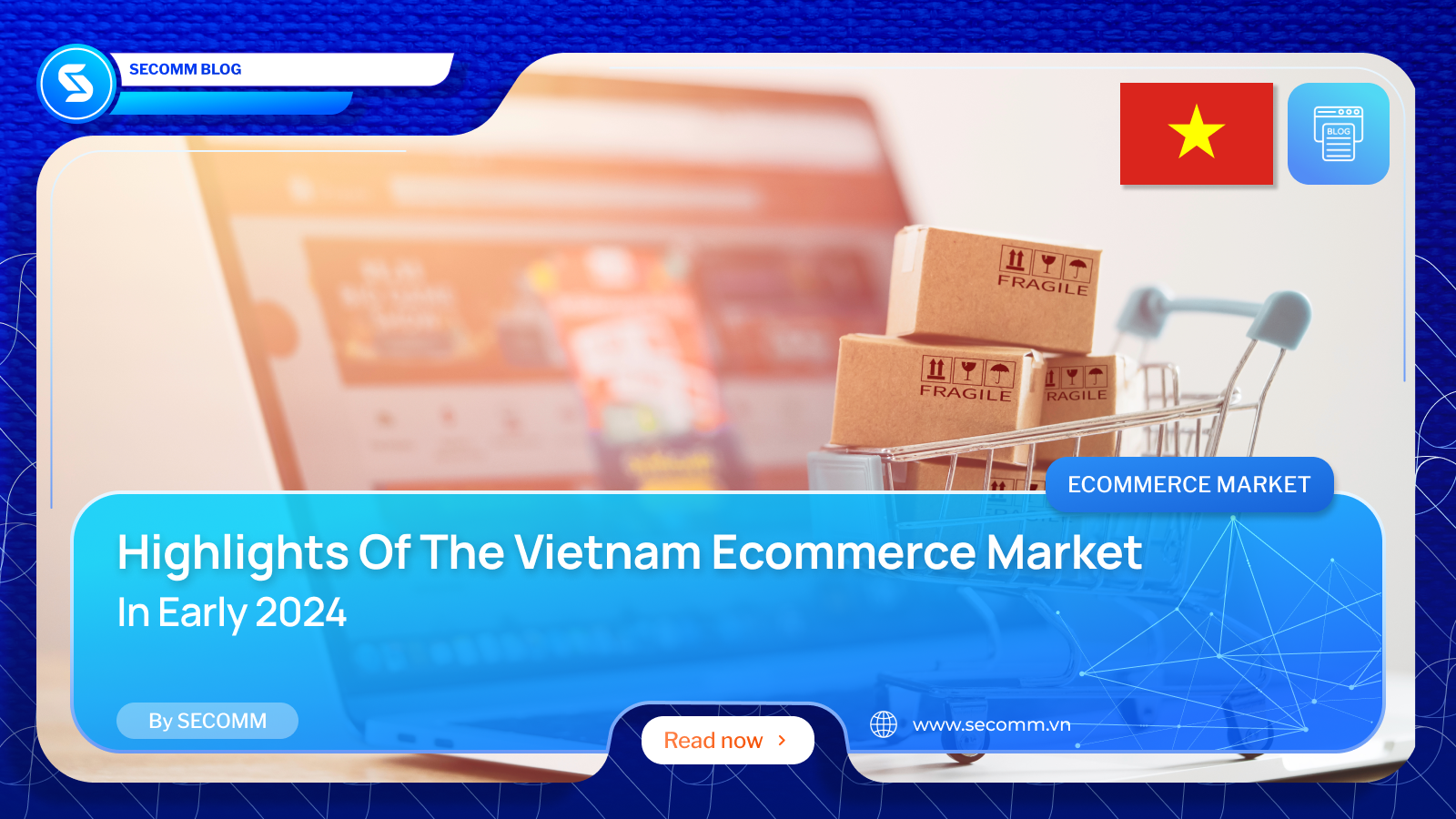
Despite the impact of inflation and economic recession on the Vietnamese economy, consumers are still willing to spend heavily on essential goods. As a temporary solution, they are turning to online shopping channels as one of the ways to deal with rising prices.
In the first two quarters of 2024, the eCommerce market in Vietnam has seen many significant fluctuations with Livestream and Short-video still maintaining their heat as evidenced by the fact that not only TikTok but also the eCommerce giant Shopee is investing heavily in video content. Let’s take a look at some of the highlights of the first few months of the year with SECOMM.
Vietnam is becoming a fertile market for eCommerce development as the demand for online shopping continues to grow. It is forecast that by 2025, eCommerce (B2B, B2C) will reach approximately $24 billion with a CAGR of 22%.
According to statistics from NIQ, there are about 60 million people nationwide using online shopping systems with an average of 3.5 million daily visits to eCommerce sites.
Among eCommerce platforms, TikTok Shop is expected to continue to grow strongly in the coming time. In the first quarter of 2024, this platform’s revenue increased by more than 239% compared to the same period last year, while Lazada showed signs of a slight decrease. Shopee is still holding the upper hand and always outperforms TikTok Shop and Lazada.
A notable point in the consumer behavior of Vietnamese shoppers is that they tend to focus on social factors (social-oriented), which means that they are interested in how products are being evaluated and promoted on communities and social networks, and from there, make purchasing decisions.
Currently, up to 90% of users intend to maintain or even increase their online shopping frequency on eCommerce platforms in the next year.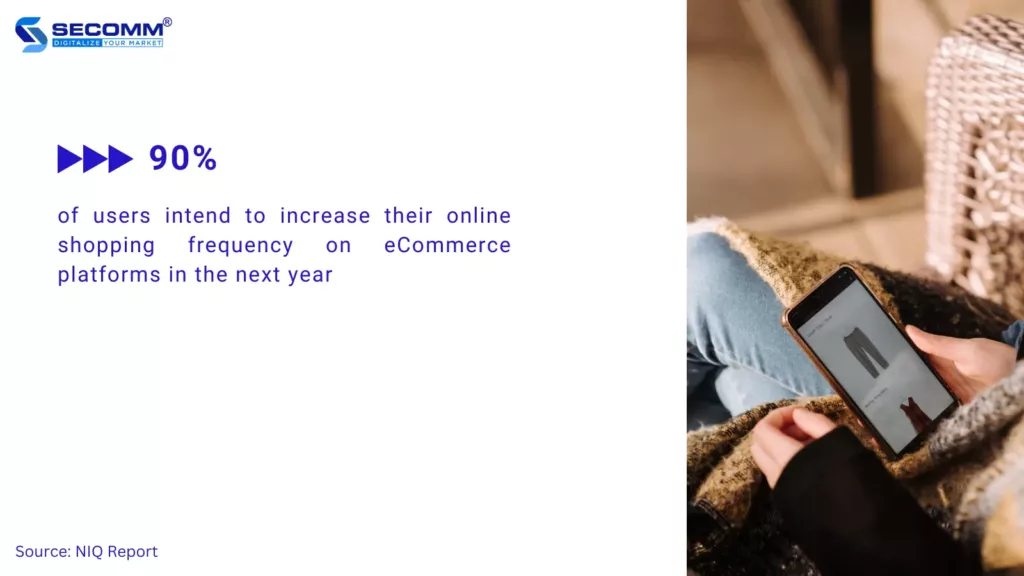
Research indicates that while price reductions and special deals are influential, they only explain 90% of consumer shopping patterns. The convenience factors offered by eCommerce, which simplifies shopping to a few quick actions on mobile devices, actually play a slightly larger role, influencing 92% of consumer choices.
This serves as a reminder for companies to prioritize their eCommerce website’s quality to enhance user experience. For instance, Vinamilk has recently revamped its brand identity and collaborated with SECOMM to refine its online system through eCommerce development services.
The Story of Vinamilk: Vinamilk & The Unprecedented Shift Using Shopify Plus
In a certain survey, only 55% of shoppers chose the shopping experience as a key determinant in their online purchasing decisions. With after-sales services such as easy returns or 24/7 customer care, sellers can easily leverage available resources to enhance the customer’s shopping experience.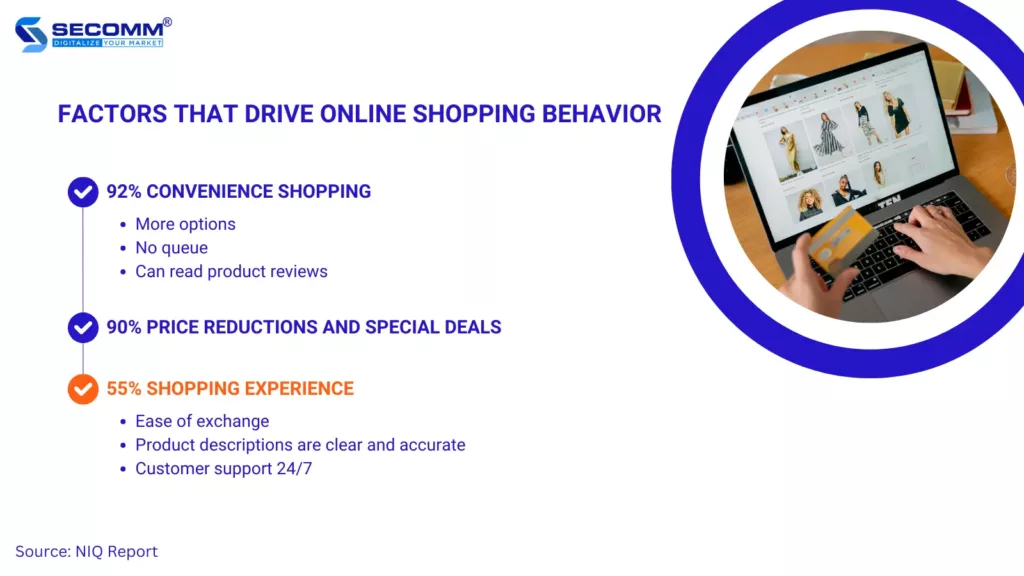
According to research from NIQ, on average, a shopper uses 3.1 different platforms within three months instead of being loyal to just one specific platform. Therefore, sellers should strengthen their presence across multiple platforms.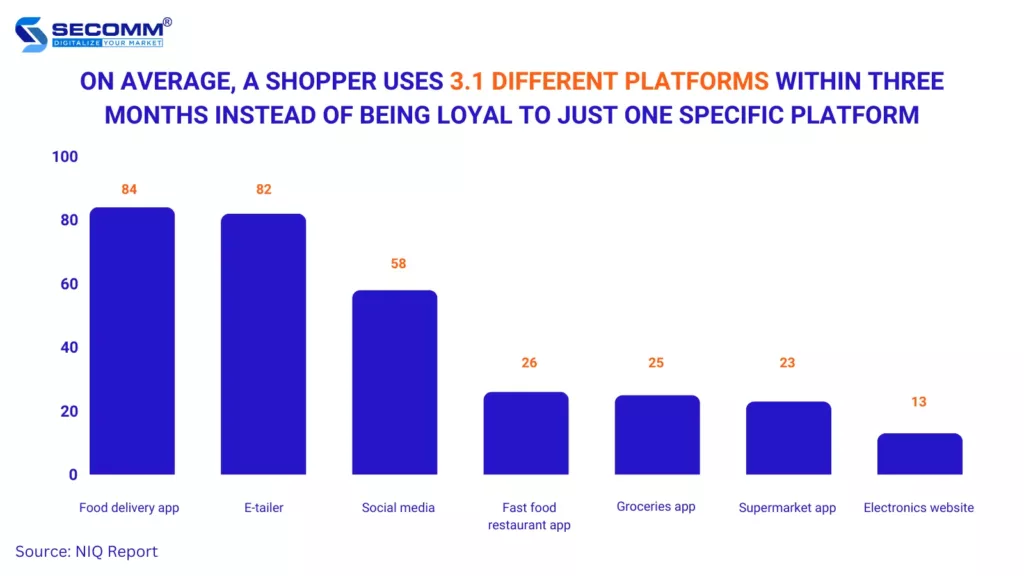
Currently, the trend of ‘Shoppertainment’ remains prevalent, with over 79% of TikTok users making purchases influenced by seller content rather than sales promotions. 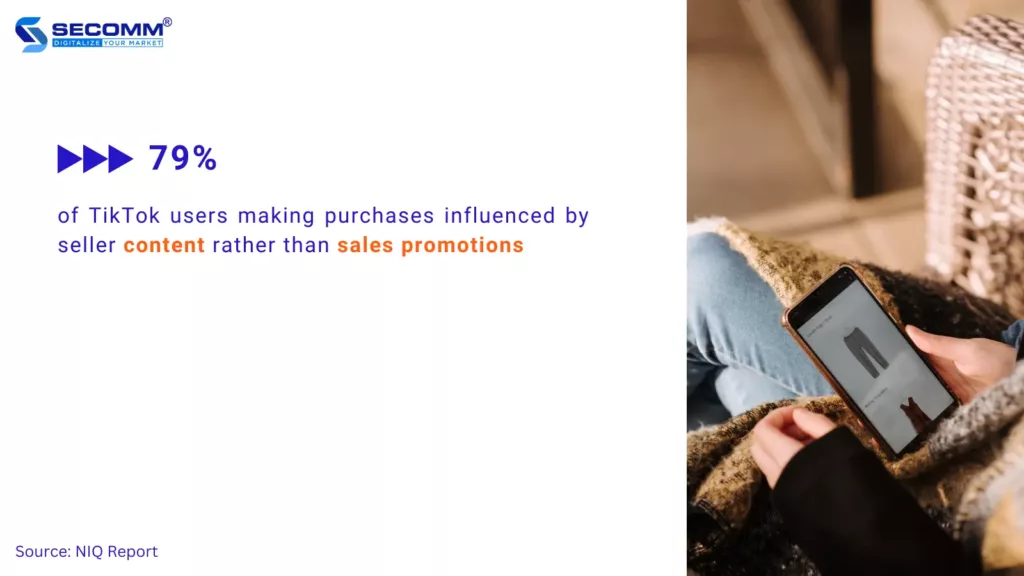
On TikTok, content creation is crucial for merchants to maintain customer engagement and push buying decisions. Ms. Trang Pham, Channel Partner Director at TikTok Vietnam, emphasizes the importance of diversity in advertising and content strategies. She warns that a lack of variety can lead to viewer fatigue.
Consequently, sellers need to understand their customer groups well to create the most suitable content for each group, limit inappropriate content, and utilize cost.
Traditional shopping methods like browsing social media or eCommerce websites are becoming less attractive. Livestreaming, however, stands out as a dynamic way to shop online.
In Q1 2024, 95% of online shoppers made purchases through livestreaming, dedicating an average of 13 hours per week watching livestreams. Statistics reveal that 85% of users prefer livestreaming because it allows direct interaction with sellers, while 81% appreciate the ability to view products in greater detail. Notably, livestreaming can drive 64% of users to purchase unintentionally.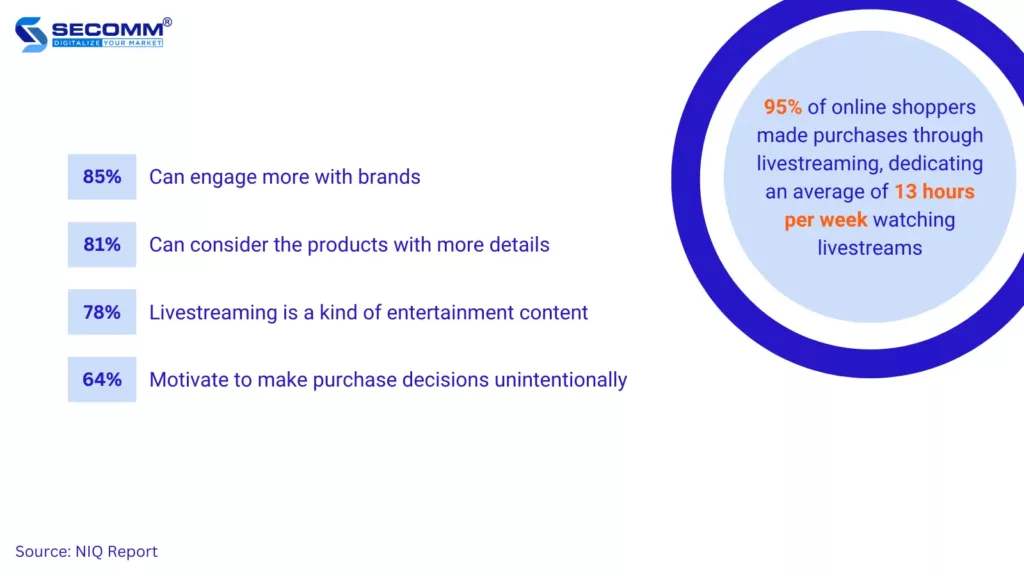
The rise of livestreaming has expanded the influence of content creators and social media influencers. Sellers can leverage these resources to build real connections with consumers. According to NIQ, approximately 50% of consumers are influenced by KOCs/KOLs when making purchasing decisions, with the personal care industry being the most impacted, as 60% of buyers in this category have changed their consumption habits.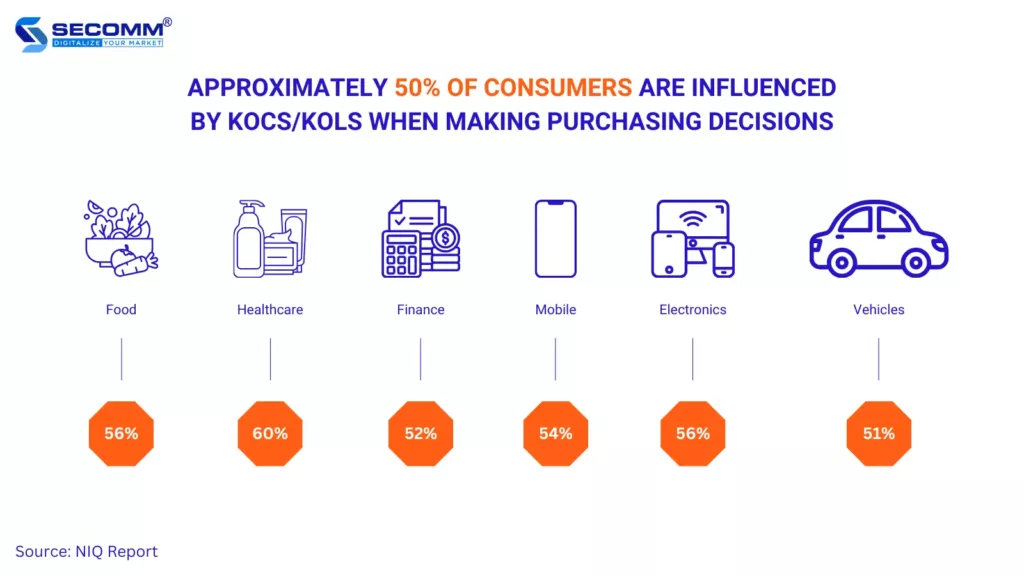
Influencers and KOCs/KOLs are valued for their trust and realness. Their shared content and insights are key in guiding customers’ buying choices. With more influencers emerging, it’s the quality of their content and real-world knowledge that helps shoppers confidently choose trusted brands online.
Online shopping platforms are advancing rapidly, focusing on innovation that puts customers first. For large businesses, along with building brand awareness, improving online stores should always be kept in mind. SECOMM is ready to help companies upgrade their eCommerce platform. Contact SECOMM for a free, detailed consultation.
 2
2
 5,029
5,029
 0
0
 2
2Subscribe to get the latest eBook!
Hotline